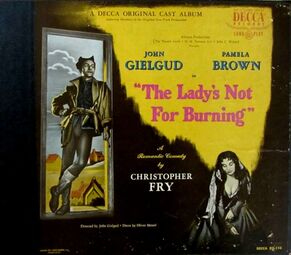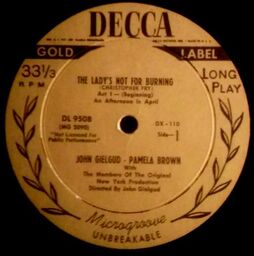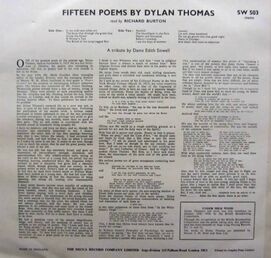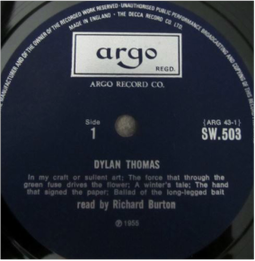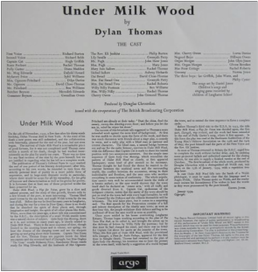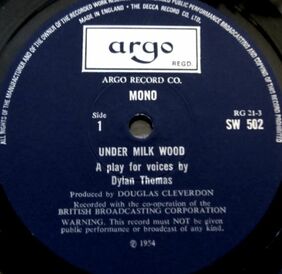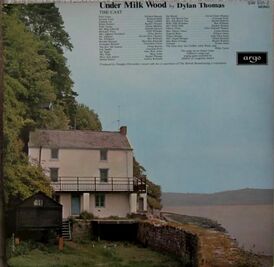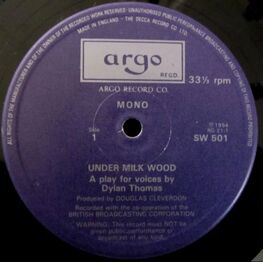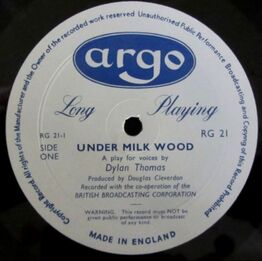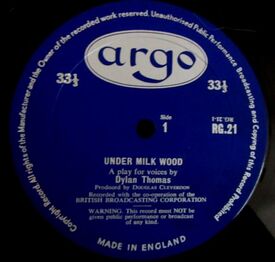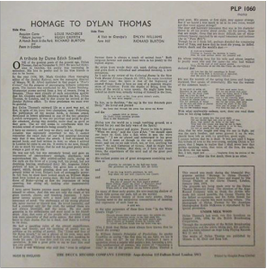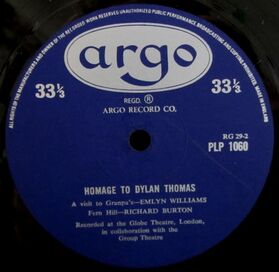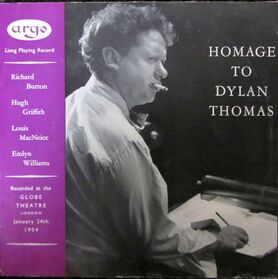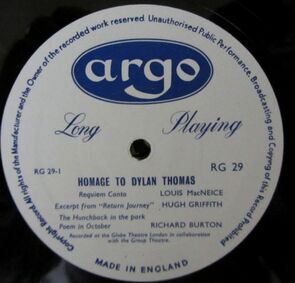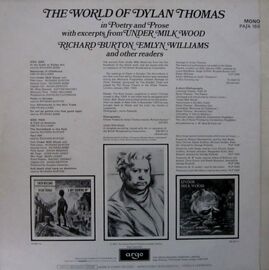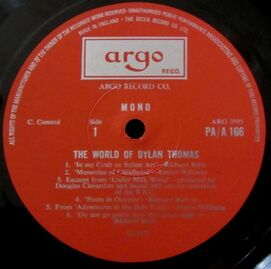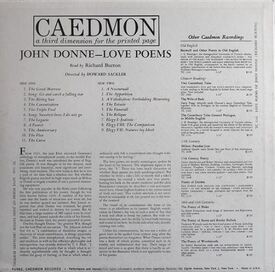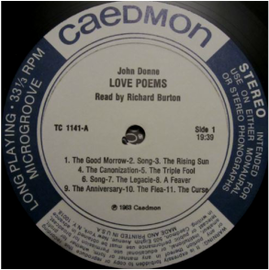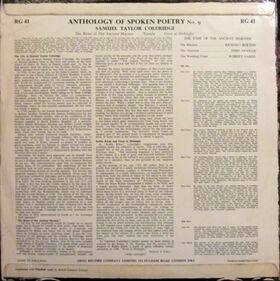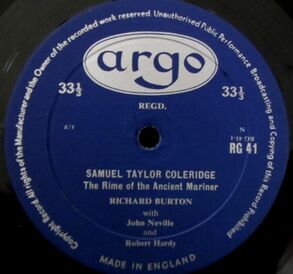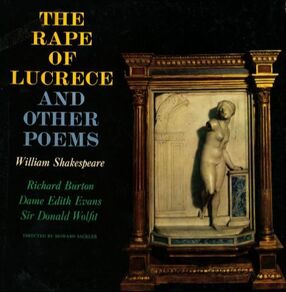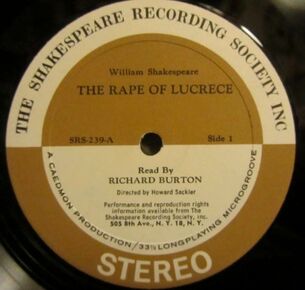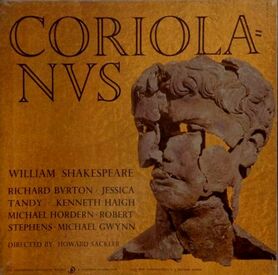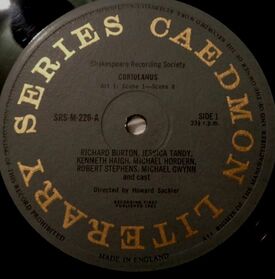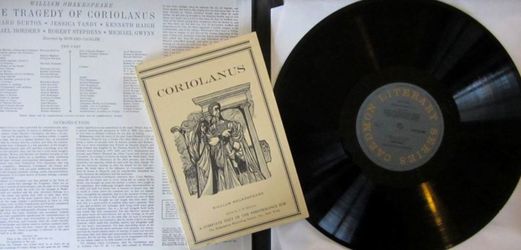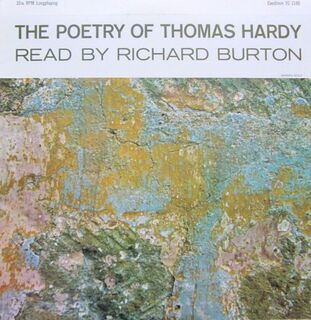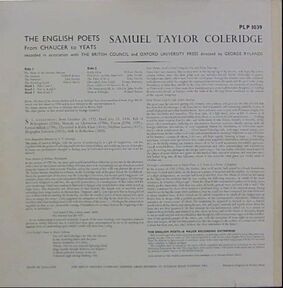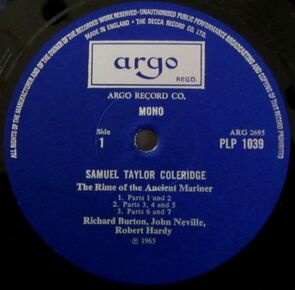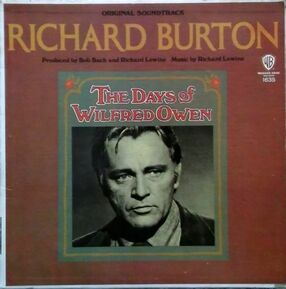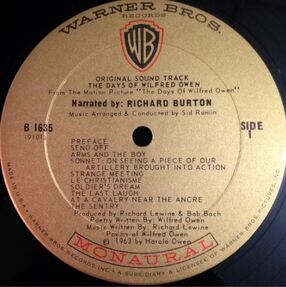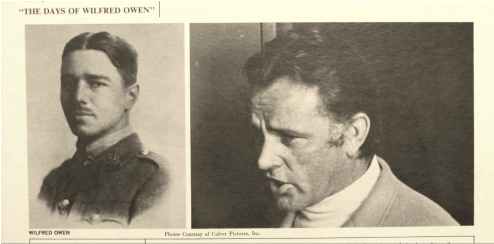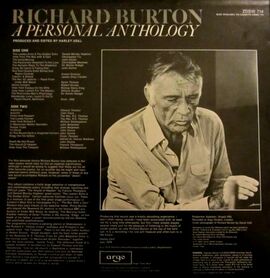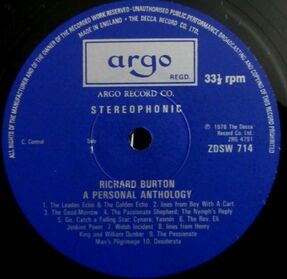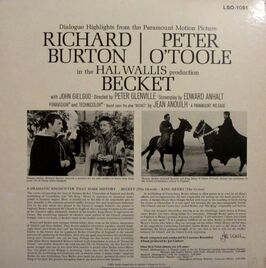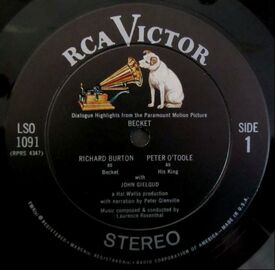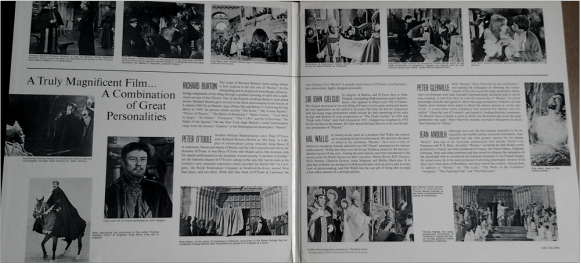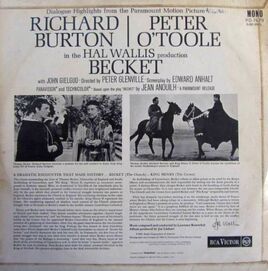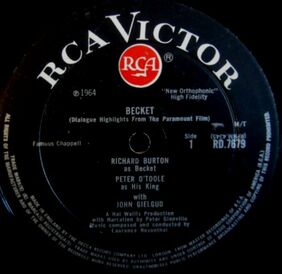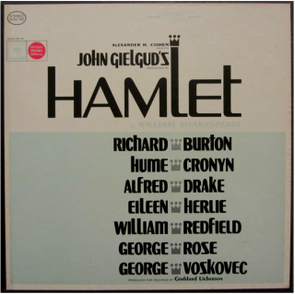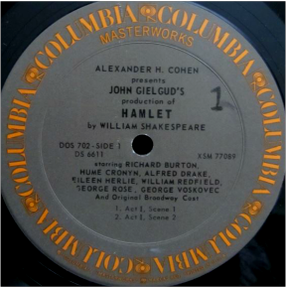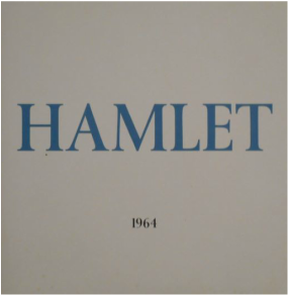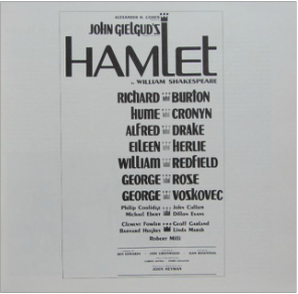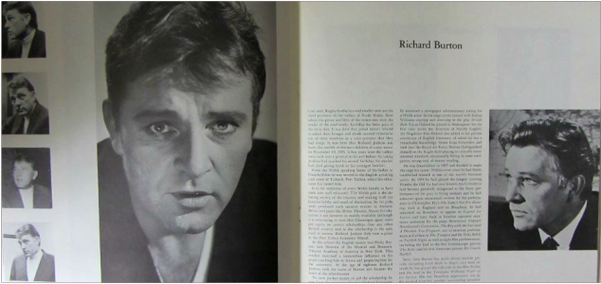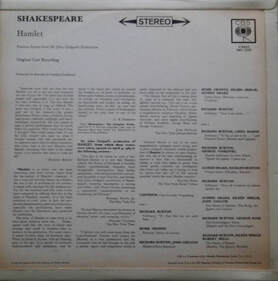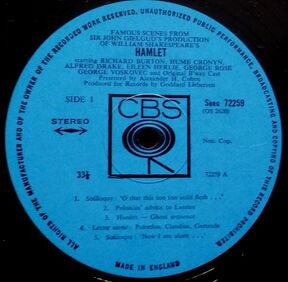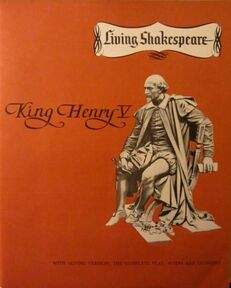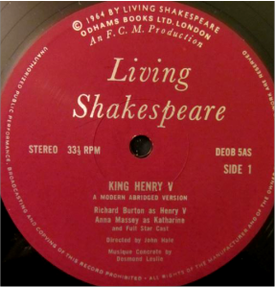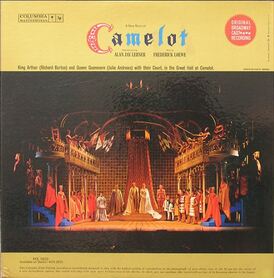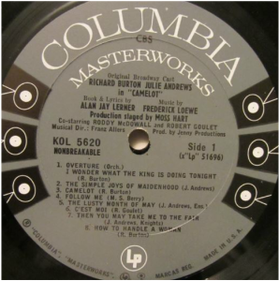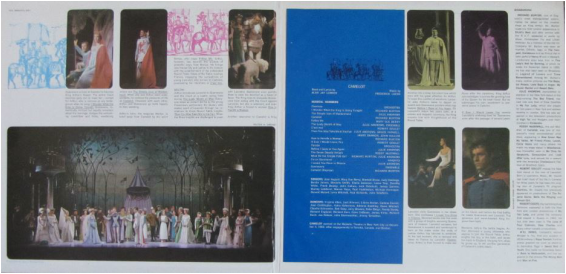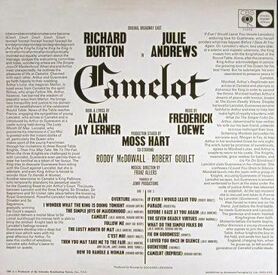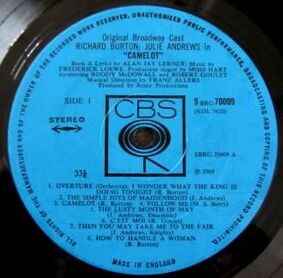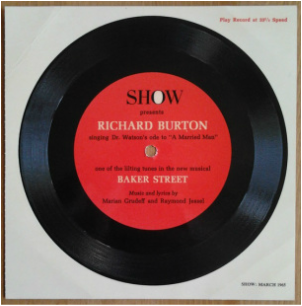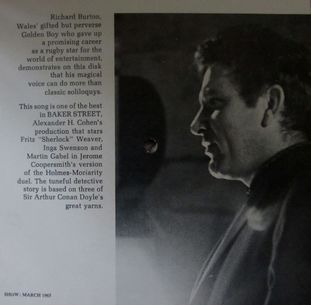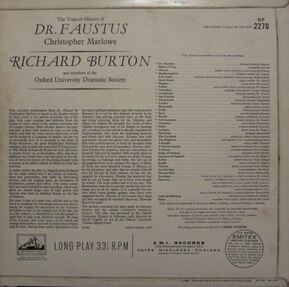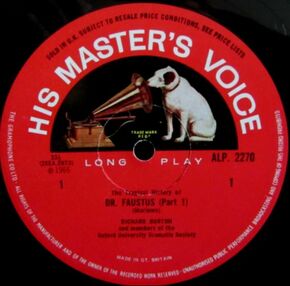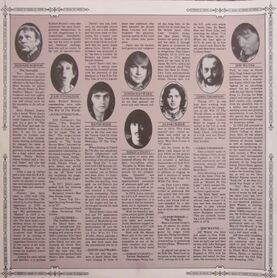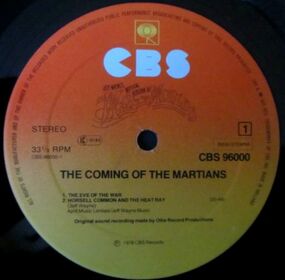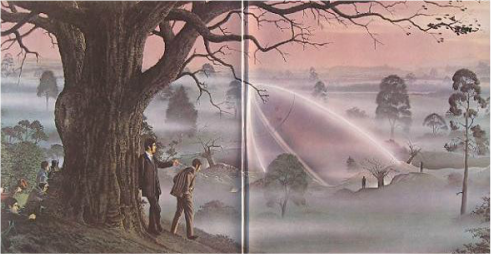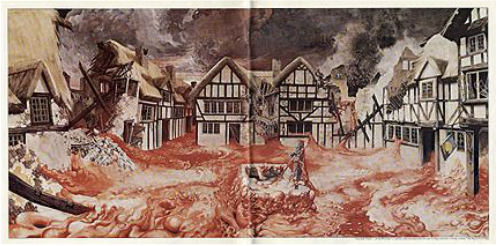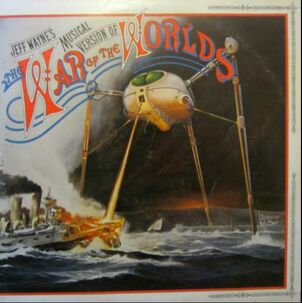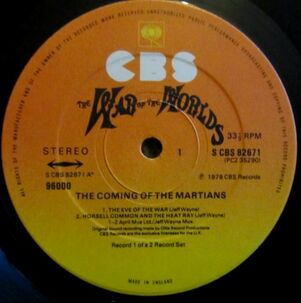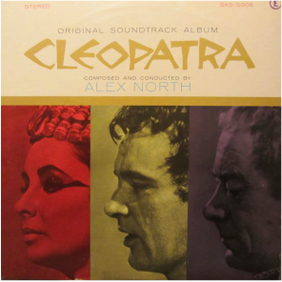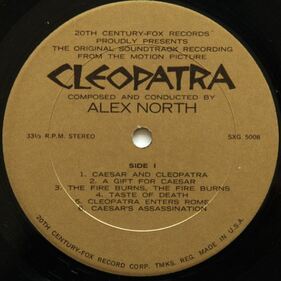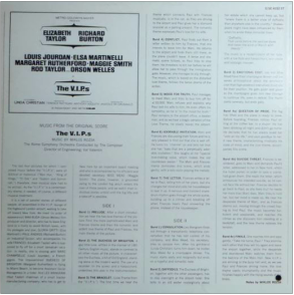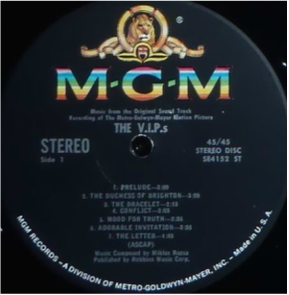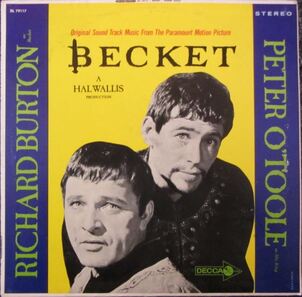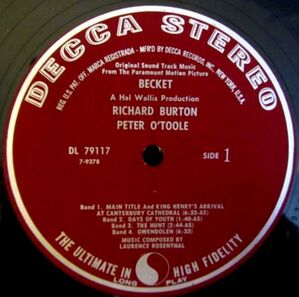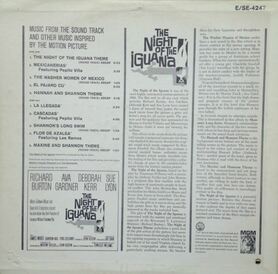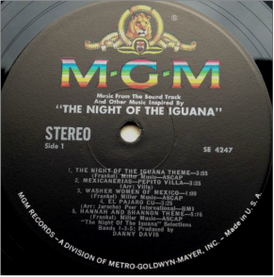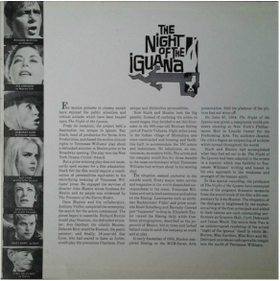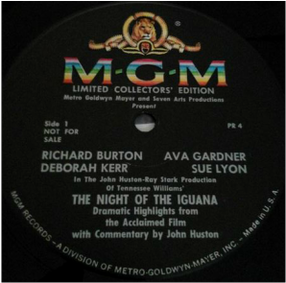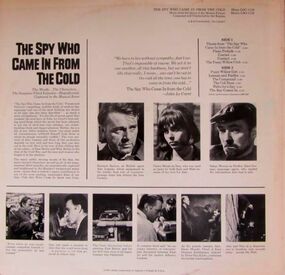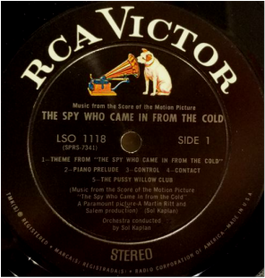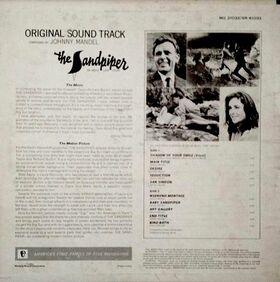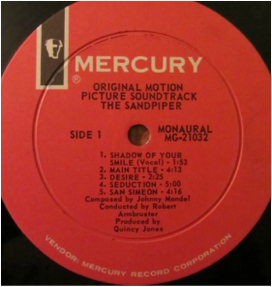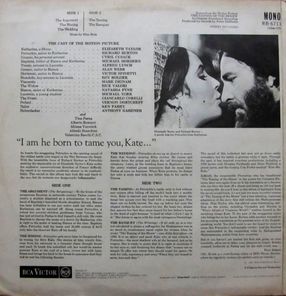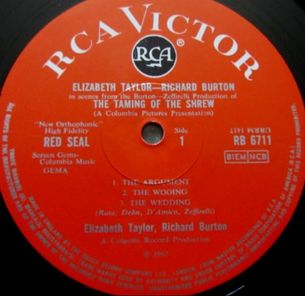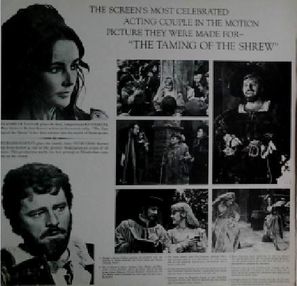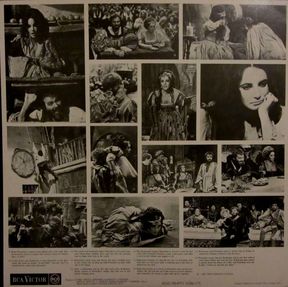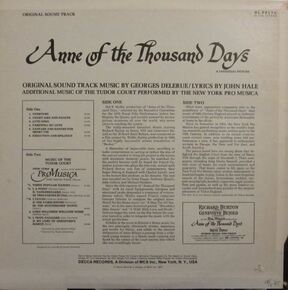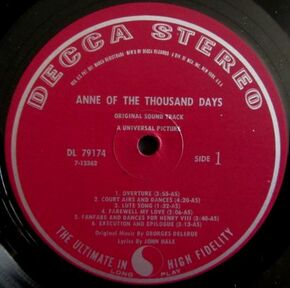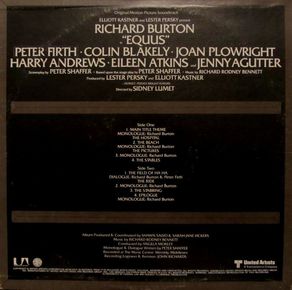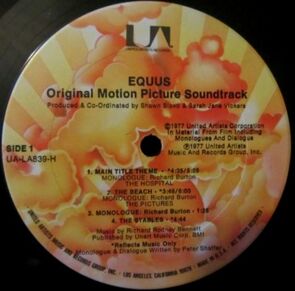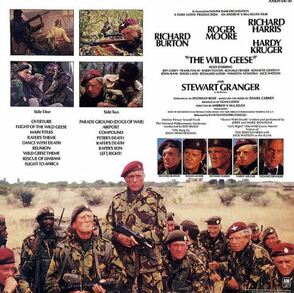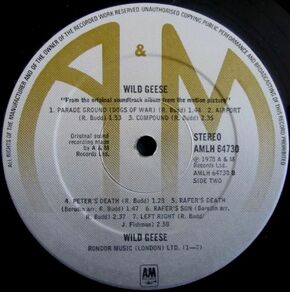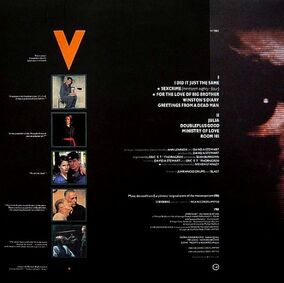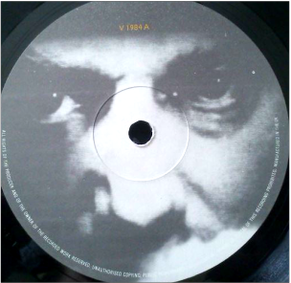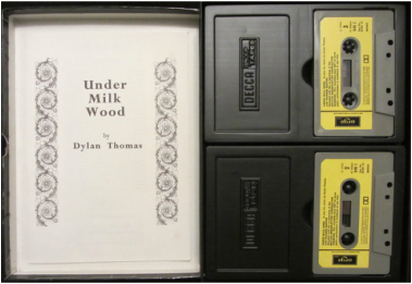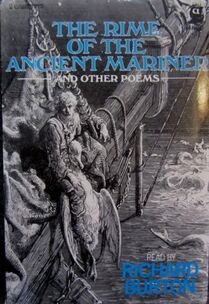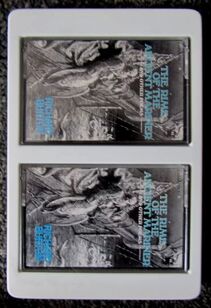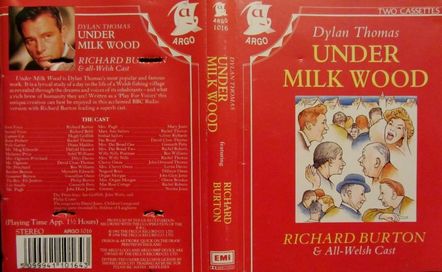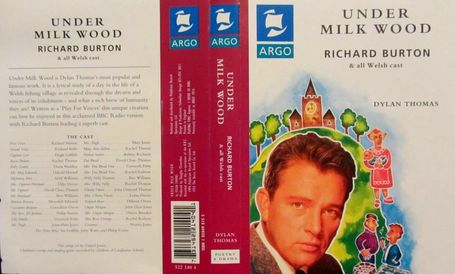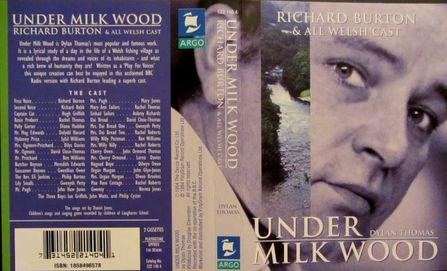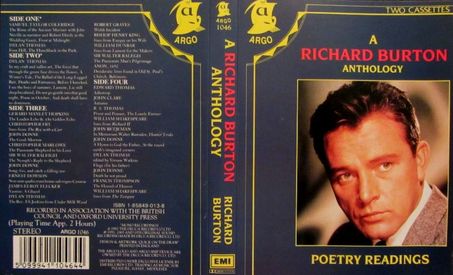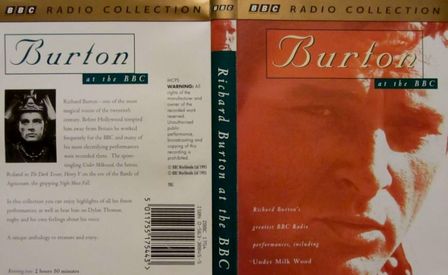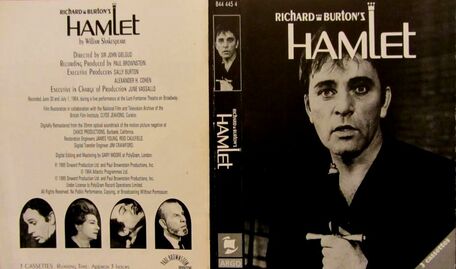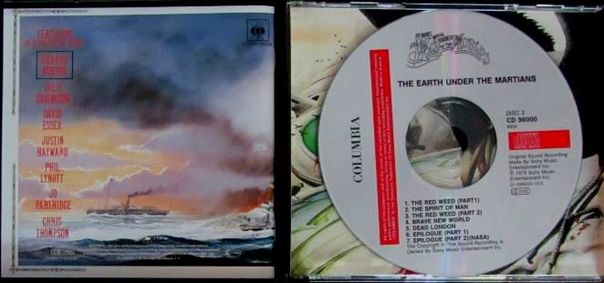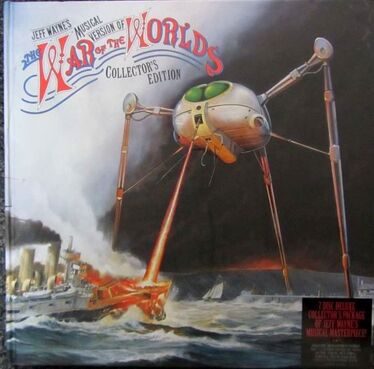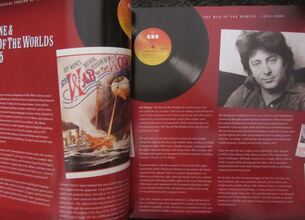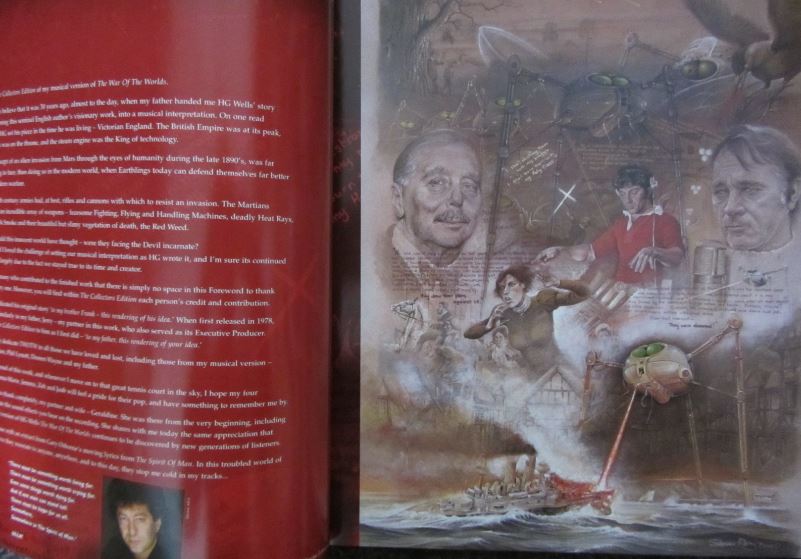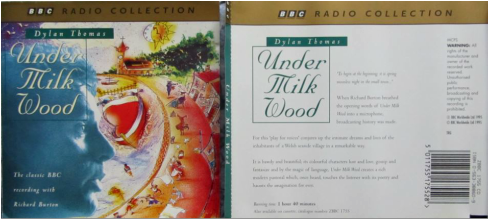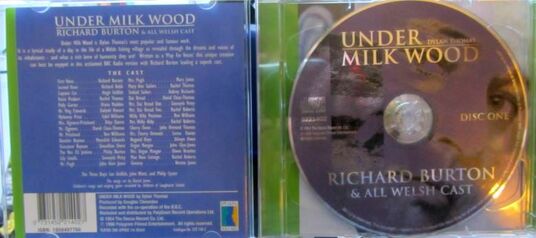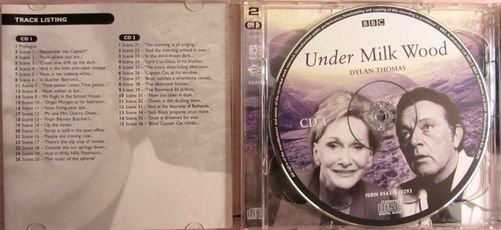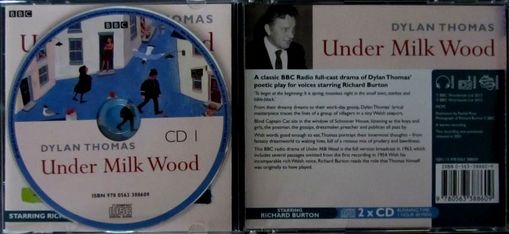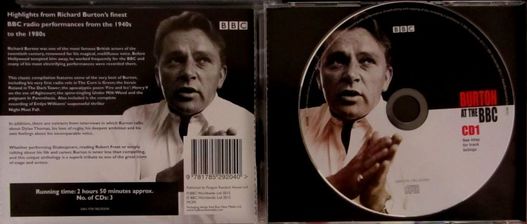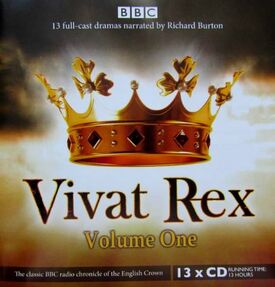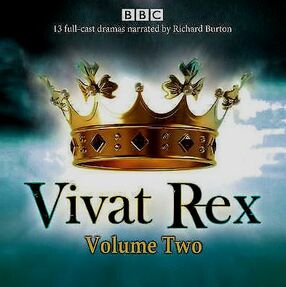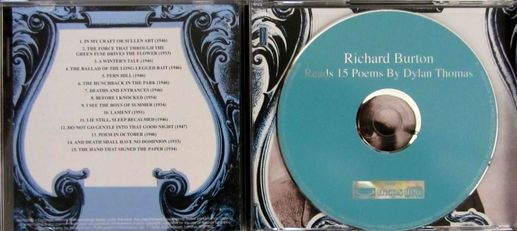A Selection of Original Vinyl Record Albums Featuring The Recorded Voice of Richard Burton
"It is the deep, dark answer from the valleys to everybody. I can't help the voice, it's part of me, I didn't cultivate it or anything, it was given to me, and I'm very lucky to possess it, I suppose. I think all my brothers have the same sort of basic voice, the timbre is the same and all that. I think our voices were born with coal-dust and rain and some sort of authentic mystery from those dark and tortured valleys"
Richard Burton in conversation with Michael Parkinson, November 1974
Richard Burton in conversation with Michael Parkinson, November 1974
Christopher Fry's 'The Lady's Not For Burning'
Decca Gold Label Series, Boxed-Set Edition, 1951
A beautifully presented copy of the first vinyl album release to feature the recorded voice of Richard Burton. This is a copy of the deluxe, boxed-set, double vinyl edition of Christopher Fry's romantic comedy play, 'The Lady's Not For Burning'.
This copy is the first American pressing, released by the Decca Record Company as part of their 'Gold Label Series' and was issued with the catalogue number, Decca DX-110.
The recording features the original members of the New York cast which included John Gielgud, Pamela Brown, David Evans and Esme Percy. The role of Alizon Eliot for this American production was played by Penelope Munday, replacing Claire Bloom who had other stage commitments in England. Richard Burton was cast in the role of Richard, an orphaned clerk, the role in which he had been originally cast and had performed on the London stage.
This original boxed-set edition is complete with a four-page booklet which features profiles on Christopher Fry, John Gielgud and Pamela Brown and an in-depth article entitled, 'About The Play'. The booklet is illustrated with black and white photographs of scenes from the original London production of the play.
This recording of 'The Lady's Not For Burning' was presented by Atlantis Productions in association with H. M. Tennent Limited, The Theatre Guild and John C. Wilson and was directed by John Gielgud.
This copy is the first American pressing, released by the Decca Record Company as part of their 'Gold Label Series' and was issued with the catalogue number, Decca DX-110.
The recording features the original members of the New York cast which included John Gielgud, Pamela Brown, David Evans and Esme Percy. The role of Alizon Eliot for this American production was played by Penelope Munday, replacing Claire Bloom who had other stage commitments in England. Richard Burton was cast in the role of Richard, an orphaned clerk, the role in which he had been originally cast and had performed on the London stage.
This original boxed-set edition is complete with a four-page booklet which features profiles on Christopher Fry, John Gielgud and Pamela Brown and an in-depth article entitled, 'About The Play'. The booklet is illustrated with black and white photographs of scenes from the original London production of the play.
This recording of 'The Lady's Not For Burning' was presented by Atlantis Productions in association with H. M. Tennent Limited, The Theatre Guild and John C. Wilson and was directed by John Gielgud.
'Richard Burton Reads Fifteen Poems By Dylan Thomas'
Decca Records (Argo Division), 1955
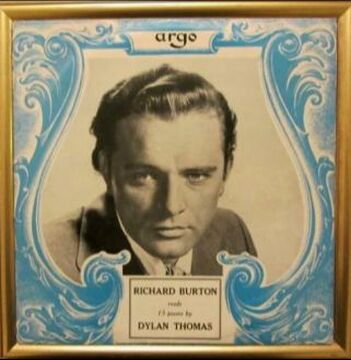
A copy of the Decca, (Argo Division), vinyl album entitled, 'Richard Burton Reads Fifteen Poems By Dylan Thomas'. This copy is the original British mono edition which was released in 1955 and issued with the Argo catalogue number SW 503. The vinyl itself was pressed with the iconic blue and silver Argo label and aside from a stunning front cover, which incorporates a striking studio portrait of Richard Burton surrounded by an elegant border designed by artist Arthur Wragg, the reverse of the cover features a contemporary, glowing and detailed tribute to Dylan Thomas beautifully written by Dame Edith Sitwell, extracts of which read;
"One of the greatest poets of the present age, Dylan Thomas, died on November 9th, 1953. He was but thirty-nine in October, his poetry was increasing in splendour. His loss to poetry and to his true friends is not to be borne.
His was the warmth of the spring that loves and forgives mankind, that speaks of immortality. His was the warmth of the common heart.
Alas, he that caught and sang the sun in flight, yet was the sun's brother, and never grieved it on its way, should have left us with no good-bye, good-night.
I cannot believe he is dead. It was not until I began this tribute of love to the ever-young, undying Dylan in his grave, that I began to realise that I shall never hear that golden speaking voice, that voice of the lion, the eagle, the dove, the sun again.
But, I too, must not blaspheme down the stations of the breath. After the first death, there is no other."
The track-listing for this superb Argo album is as follows;
In My Craft Or Sullen Art / The Force That Through The Green Fuse Drives The Flower / A Winter's Tale / The Ballad Of The Long-Legged Bait / Fern Hill / The Hunchback In The Park / Deaths And Entrances / Before I Knocked / I See The Boys Of Summer / Lament / Lie Still Sleep Becalmed / Do Not Go Gentle Into That Good Night / Poem In October / And Death Shall Have No Dominion.
"One of the greatest poets of the present age, Dylan Thomas, died on November 9th, 1953. He was but thirty-nine in October, his poetry was increasing in splendour. His loss to poetry and to his true friends is not to be borne.
His was the warmth of the spring that loves and forgives mankind, that speaks of immortality. His was the warmth of the common heart.
Alas, he that caught and sang the sun in flight, yet was the sun's brother, and never grieved it on its way, should have left us with no good-bye, good-night.
I cannot believe he is dead. It was not until I began this tribute of love to the ever-young, undying Dylan in his grave, that I began to realise that I shall never hear that golden speaking voice, that voice of the lion, the eagle, the dove, the sun again.
But, I too, must not blaspheme down the stations of the breath. After the first death, there is no other."
The track-listing for this superb Argo album is as follows;
In My Craft Or Sullen Art / The Force That Through The Green Fuse Drives The Flower / A Winter's Tale / The Ballad Of The Long-Legged Bait / Fern Hill / The Hunchback In The Park / Deaths And Entrances / Before I Knocked / I See The Boys Of Summer / Lament / Lie Still Sleep Becalmed / Do Not Go Gentle Into That Good Night / Poem In October / And Death Shall Have No Dominion.
The reverse of the original cover of 'Richard Burton Reads Fifteen Poems By Dylan Thomas'. Also pictured is the original blue and silver Argo Record Company label. One of the copies of this album held in the Richard Burton Museum collection is a mint edition which was purchased at Harrods, Knightsbridge, still in it's original 1955 wrapping, complete with the Harrods price label, which originally belonged to the Jenkins family, having been bought for them by Richard Burton himself.
Argo Records was a British record label originally founded by Harley J. Usill and Cyril Clarke in 1951 with the intention of recording 'British music as played by British artists', but it soon became famous as a company which only specialised in the medium of 'spoken-word' recordings.
Taking advantage of the playing time of the 'Long-Playing' record, Argo embarked on the monumental task of recording the complete works of Shakespeare. Cambridge University's Marlowe Players participated in the series, which was the sole responsibility of Dadie Rylands, a fellow at King's College, Cambridge. Recording began in 1957 and was completed by 1964. Initially professional actors had been reluctant to work for the project, but in time actors such as Judi Dench, Derek Jacobi and Prunella Scales, seeing the success for this medium, agreed to take part.
A series of albums released by Argo and titled,'The Poet Speaks' was another early collection which consisted of contemporary poets reading their work, and included such writers as; Ted Hughes, Syvia Plath, Edward Thomas, W. H. Auden and John Betjeman. The biggest seller of the entire Argo catalogue was the 1954 boxed-set edition of the recording of 'Under Milk Wood' with Richard Burton and an all-Welsh cast, a copy of which features below.
Argo was bought by the British record label Decca in 1957. Harley J. Usill remained in charge and the company was able to maintain it's uniqueness and continue its standard of high-class spoken-word recordings, running alongside Argo's parent company.
In 1980 the Argo label was passed on to PolyGram Records when the company acquired the Decca label. Harley J. Usill left the company and went on to co-found ASV Records. Argo, as an independent label, closed in 1988, however the label was re-launched in 1990 with the same Argo name but with a different logo. The complete Argo catalogue is now owned by the Universal Music Group. 'Under Milk Wood' continues to be one of their biggest selling titles.
Taking advantage of the playing time of the 'Long-Playing' record, Argo embarked on the monumental task of recording the complete works of Shakespeare. Cambridge University's Marlowe Players participated in the series, which was the sole responsibility of Dadie Rylands, a fellow at King's College, Cambridge. Recording began in 1957 and was completed by 1964. Initially professional actors had been reluctant to work for the project, but in time actors such as Judi Dench, Derek Jacobi and Prunella Scales, seeing the success for this medium, agreed to take part.
A series of albums released by Argo and titled,'The Poet Speaks' was another early collection which consisted of contemporary poets reading their work, and included such writers as; Ted Hughes, Syvia Plath, Edward Thomas, W. H. Auden and John Betjeman. The biggest seller of the entire Argo catalogue was the 1954 boxed-set edition of the recording of 'Under Milk Wood' with Richard Burton and an all-Welsh cast, a copy of which features below.
Argo was bought by the British record label Decca in 1957. Harley J. Usill remained in charge and the company was able to maintain it's uniqueness and continue its standard of high-class spoken-word recordings, running alongside Argo's parent company.
In 1980 the Argo label was passed on to PolyGram Records when the company acquired the Decca label. Harley J. Usill left the company and went on to co-found ASV Records. Argo, as an independent label, closed in 1988, however the label was re-launched in 1990 with the same Argo name but with a different logo. The complete Argo catalogue is now owned by the Universal Music Group. 'Under Milk Wood' continues to be one of their biggest selling titles.
'Under Milk Wood' by Dylan Thomas
Argo Records Deluxe Box-Set Edition, 1954
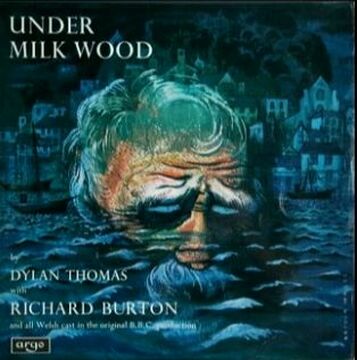
A copy of the original two-disc, deluxe boxed-set edition of Dylan Thomas' 'Under Milk Wood'. This first edition was released by Decca Records, (Argo Division), in 1954.
This copy is the original British mono edition which was issued with the catalogue number SW 501-2 and was pressed with blue and silver Argo Records labels.
This adaption of Dylan Thomas's 'Under Milk Wood' was produced by Douglas Cleverdon and was released by Decca (Argo Division), with the full co-operation of The British Broadcasting Corporation.
This version of 'Under Milk Wood' was recorded with an all-Welsh cast which included, alongside Richard Burton in the role of 'First Voice', Richard Bebb, Rachel Thomas, Hugh Griffith, Meredith Edwards and Rachel Roberts.
Richard Burton's foster father Philip Burton was cast in the role of the Reverend Eli Jenkins and Richard Burton's first wife Sybil Williams was featured in the role of Myfanwy Price.
The children's songs and singing game were performed by, appropriately, the children of Laugharne school. The striking, haunting cover painting for this 1954 box-set edition of 'Under Milk Wood' was by the eminent British illustrator and artist, Arthur Wragg.
This copy comes complete with the original insert which features a full cast list and extensive, detailed notes written by Dylan Thomas's close friend, the composer Daniel Jones in January 1954, which reads, rather beautifully;
"On the 9th of November, 1953, a few days after his thirty-ninth birthday, Dylan Thomas died in New York. At the time of his death a new poem was still unfinished, and the collaboration with Stravinsky, planned for the end of the year, had not even begun. The survival of 'Under Milk Wood' is a remarkable piece of good fortune, for it was not completed until Thomas came within a month of his death, though he had worked intermittently on the play for nearly ten years. There was no time for any final revision of the text by the poet himself, but we are justified in regarding what he has left as a complete work.
The publication of Thomas's 'Collected Poems' in 1952 marked the end of one period of his literary development; after this, according to his own words, he intended to turn from the strictly personal kind of poetry to a more public form of expression, and to large-scale dramatic works in particular, where there would be scope for all his versatility, for his gifts of humour and characterisation as well as his genius for poetry. it is fortunate that at least one of these projected works has been preserved for us.
"Under Milk Wood - A Play For Voices', grew by a slow and natural process, and the story of that growth, known only to a few friends of the poet, is most interesting. Thomas liked small towns by the sea best, and small Welsh towns by the sea best of all. Before the war he lived for many years in Laugharne, and during the war for a time in New Quay; there is no doubt that he absorbed the spirit of these places and, through imagination and insight, the spirit of all other places like them. When, more than ten years ago, a short talk was commissioned by the B. B. C., the description of a small Welsh seaside town was a natural choice of subject. 'Quite Early One Morning' , short as it is, and written so many years ago, is closely related to 'Under Milk Wood'. There is the same sequence of time, though limited to the morning hours and in winter, not spring; we hear the dreams of the sleeping town and see the sleepers getting up and going about their business. Captain Tiny Evans and the Rev. Thomas Evans are pygmies beside the blind sea-captain and the reverend bard of Llaregyb, but Miss Hughes 'The Cosy' recalls Myfanwy Price, Manchester House stands ready for Mog Edwards, and the husbands of Mrs. Ogmore-Pritchard are already at their tasks, 'Dust the china, feed the canary, sweep the drawing-room floor; and before you let the sun in, mind he wipes his shoes'.
The success of this broadcast talk suggested to Thomas a more extended work against the same kind of background. At first he was unable to decide upon the form of the work, and there was much discussion with friends about a stage play, a comedy in verse, and a radio play with a blind man as narrator and central character. The blind man, a natural bridge between eye and ear for the radio listener, survives in 'Under Milk Wood', with the difference that Captain Cat is made to share his central position with two anonymous narrators. But the simple time sequence of 'Quite Early One Morning'; which resembles the pattern of 'Under Milk Wood' so closely, at first appeared inadequate; some kind of plot seemed to be necessary. Thomas thought he had found the theme he wanted in the contrast between the mythical town and the surrounding world, the conflict between the eccentrics, strong in their individuality and freedom, and the sane ones who sacrifice everything to some notion of conformity. The whole population cannot very well be accommodated inside the walls of a lunatic asylum; so the sane world decrees that the town itself shall be declared an 'insane area', with all traffic and goods diverted from it. Captain Cat, spokesman of the indignant citizens, insists that the sanity of the town should be put on trial in the town hall with every legal formality; he will be Counsel for the Defence and the citizens themselves will be witnesses. The trial takes place, but it comes to a surprising end. The final speech for the Prosecution consists of a full and minute description of the ideally sane town; as soon as they hear this, the people withdraw their defence and beg to be cordoned off from the sane world as soon as possible.
Once more settled in his house overlooking Laugharne Estuary, Thomas began working according to the plan of 'The Town That Was Mad', as he called it, and brought the action up to the delivery of letters by Willy Nilly the postman; but by that time he had changed his mind, and there was no letter for Captain Cat about the sanity or the insanity of the town. When this first part of 'Under Milk Wood', with the provisional title of 'Llaregyb, a Piece for Radio Perhaps', appeared for the first time in Botteghe Oscure, Thomas had returned to the plan of 'Quite Early One Morning'; his intention was to limit the picture of the town itself, with hardly a suggestion of a world beyond the town, and to extend the time sequence to form a complete cycle.
Before Thomas' s third visit to the U. S. A. in 1953, the title 'Under Milk Wood, a Play for Voices' was decided upon, the first part, 'Llaregyb', was revised, and the work had been extended to the end of Polly Garter's song, where it first appears. In this form, the play was read at the Kaufman Auditorium of the Young Men's Hebrew Association on the 15th and the 29th of May; the poet himself read the parts of the First Voice and the Rev. Eli Jenkins.
As soon as Thomas returned to Britain the B. B. C. urged him to complete the work without further delay, and, by omitting some projected ballads and unfinished material for the closing section, he was able to supply a finished version at the end of October. The first broadcast of the whole work, produced by Douglas Cleverdon with a distinguished all-Welsh cast, was given on the 25th of January 1954, with a repetition two days later.
In case 'Under Milk Wood' falls into the hands of a Welsh philologist, it must be made clear that the language used is Anglo-Welsh. Dylan Thomas spoke no Welsh, and the reader must imitate his inconsistency If he wishes to hear the words as they were pronounced by the poet himself."
This copy is the original British mono edition which was issued with the catalogue number SW 501-2 and was pressed with blue and silver Argo Records labels.
This adaption of Dylan Thomas's 'Under Milk Wood' was produced by Douglas Cleverdon and was released by Decca (Argo Division), with the full co-operation of The British Broadcasting Corporation.
This version of 'Under Milk Wood' was recorded with an all-Welsh cast which included, alongside Richard Burton in the role of 'First Voice', Richard Bebb, Rachel Thomas, Hugh Griffith, Meredith Edwards and Rachel Roberts.
Richard Burton's foster father Philip Burton was cast in the role of the Reverend Eli Jenkins and Richard Burton's first wife Sybil Williams was featured in the role of Myfanwy Price.
The children's songs and singing game were performed by, appropriately, the children of Laugharne school. The striking, haunting cover painting for this 1954 box-set edition of 'Under Milk Wood' was by the eminent British illustrator and artist, Arthur Wragg.
This copy comes complete with the original insert which features a full cast list and extensive, detailed notes written by Dylan Thomas's close friend, the composer Daniel Jones in January 1954, which reads, rather beautifully;
"On the 9th of November, 1953, a few days after his thirty-ninth birthday, Dylan Thomas died in New York. At the time of his death a new poem was still unfinished, and the collaboration with Stravinsky, planned for the end of the year, had not even begun. The survival of 'Under Milk Wood' is a remarkable piece of good fortune, for it was not completed until Thomas came within a month of his death, though he had worked intermittently on the play for nearly ten years. There was no time for any final revision of the text by the poet himself, but we are justified in regarding what he has left as a complete work.
The publication of Thomas's 'Collected Poems' in 1952 marked the end of one period of his literary development; after this, according to his own words, he intended to turn from the strictly personal kind of poetry to a more public form of expression, and to large-scale dramatic works in particular, where there would be scope for all his versatility, for his gifts of humour and characterisation as well as his genius for poetry. it is fortunate that at least one of these projected works has been preserved for us.
"Under Milk Wood - A Play For Voices', grew by a slow and natural process, and the story of that growth, known only to a few friends of the poet, is most interesting. Thomas liked small towns by the sea best, and small Welsh towns by the sea best of all. Before the war he lived for many years in Laugharne, and during the war for a time in New Quay; there is no doubt that he absorbed the spirit of these places and, through imagination and insight, the spirit of all other places like them. When, more than ten years ago, a short talk was commissioned by the B. B. C., the description of a small Welsh seaside town was a natural choice of subject. 'Quite Early One Morning' , short as it is, and written so many years ago, is closely related to 'Under Milk Wood'. There is the same sequence of time, though limited to the morning hours and in winter, not spring; we hear the dreams of the sleeping town and see the sleepers getting up and going about their business. Captain Tiny Evans and the Rev. Thomas Evans are pygmies beside the blind sea-captain and the reverend bard of Llaregyb, but Miss Hughes 'The Cosy' recalls Myfanwy Price, Manchester House stands ready for Mog Edwards, and the husbands of Mrs. Ogmore-Pritchard are already at their tasks, 'Dust the china, feed the canary, sweep the drawing-room floor; and before you let the sun in, mind he wipes his shoes'.
The success of this broadcast talk suggested to Thomas a more extended work against the same kind of background. At first he was unable to decide upon the form of the work, and there was much discussion with friends about a stage play, a comedy in verse, and a radio play with a blind man as narrator and central character. The blind man, a natural bridge between eye and ear for the radio listener, survives in 'Under Milk Wood', with the difference that Captain Cat is made to share his central position with two anonymous narrators. But the simple time sequence of 'Quite Early One Morning'; which resembles the pattern of 'Under Milk Wood' so closely, at first appeared inadequate; some kind of plot seemed to be necessary. Thomas thought he had found the theme he wanted in the contrast between the mythical town and the surrounding world, the conflict between the eccentrics, strong in their individuality and freedom, and the sane ones who sacrifice everything to some notion of conformity. The whole population cannot very well be accommodated inside the walls of a lunatic asylum; so the sane world decrees that the town itself shall be declared an 'insane area', with all traffic and goods diverted from it. Captain Cat, spokesman of the indignant citizens, insists that the sanity of the town should be put on trial in the town hall with every legal formality; he will be Counsel for the Defence and the citizens themselves will be witnesses. The trial takes place, but it comes to a surprising end. The final speech for the Prosecution consists of a full and minute description of the ideally sane town; as soon as they hear this, the people withdraw their defence and beg to be cordoned off from the sane world as soon as possible.
Once more settled in his house overlooking Laugharne Estuary, Thomas began working according to the plan of 'The Town That Was Mad', as he called it, and brought the action up to the delivery of letters by Willy Nilly the postman; but by that time he had changed his mind, and there was no letter for Captain Cat about the sanity or the insanity of the town. When this first part of 'Under Milk Wood', with the provisional title of 'Llaregyb, a Piece for Radio Perhaps', appeared for the first time in Botteghe Oscure, Thomas had returned to the plan of 'Quite Early One Morning'; his intention was to limit the picture of the town itself, with hardly a suggestion of a world beyond the town, and to extend the time sequence to form a complete cycle.
Before Thomas' s third visit to the U. S. A. in 1953, the title 'Under Milk Wood, a Play for Voices' was decided upon, the first part, 'Llaregyb', was revised, and the work had been extended to the end of Polly Garter's song, where it first appears. In this form, the play was read at the Kaufman Auditorium of the Young Men's Hebrew Association on the 15th and the 29th of May; the poet himself read the parts of the First Voice and the Rev. Eli Jenkins.
As soon as Thomas returned to Britain the B. B. C. urged him to complete the work without further delay, and, by omitting some projected ballads and unfinished material for the closing section, he was able to supply a finished version at the end of October. The first broadcast of the whole work, produced by Douglas Cleverdon with a distinguished all-Welsh cast, was given on the 25th of January 1954, with a repetition two days later.
In case 'Under Milk Wood' falls into the hands of a Welsh philologist, it must be made clear that the language used is Anglo-Welsh. Dylan Thomas spoke no Welsh, and the reader must imitate his inconsistency If he wishes to hear the words as they were pronounced by the poet himself."
Arthur Wragg was born in Manchester on the 3rd of January, 1903, the son of George and Alice Wragg, and was raised in Harrogate, Yorkshire along with his older sister, Amy. After schooling he trained at the Sheffield School of Art before moving to London to work as a freelance commercial artist. Throughout the 1920's he mainly worked as an illustrator for women's magazines and as an illustrator of dust-jackets for publishing houses. As an ardent Socialist and pacifist many of his illustrations and cartoons appeared in such publications as 'Tribune' and ' Peace News' as well as various leaflets and pamphlets promoting Socialism and social justice.
During the depression of the 1930's, Wragg turned to the illustrating of Biblical texts, in a style greatly resembling woodcuts, a wonderful example of his work during this time are the illustrations he provided for the 1933 publication, 'The Psalms For Modern Life'.
As a pacifist, he was imprisoned for being a conscientious objector during the war, returning to freelance work after his release and finding employment as a school art teacher.
From 1953 until his death, Wragg was the principle illustrator for Argo Records, providing some striking record covers for the company, notably his design for 'The Rime Of The Ancient Mariner' and the above illustration for 'Under Milk Wood'.
Arthur Wragg died on the 17th of August, 1976, aged seventy-three.
During the depression of the 1930's, Wragg turned to the illustrating of Biblical texts, in a style greatly resembling woodcuts, a wonderful example of his work during this time are the illustrations he provided for the 1933 publication, 'The Psalms For Modern Life'.
As a pacifist, he was imprisoned for being a conscientious objector during the war, returning to freelance work after his release and finding employment as a school art teacher.
From 1953 until his death, Wragg was the principle illustrator for Argo Records, providing some striking record covers for the company, notably his design for 'The Rime Of The Ancient Mariner' and the above illustration for 'Under Milk Wood'.
Arthur Wragg died on the 17th of August, 1976, aged seventy-three.
'Under Milk Wood by Dylan Thomas' (Version Two)
Argo Records, 1975
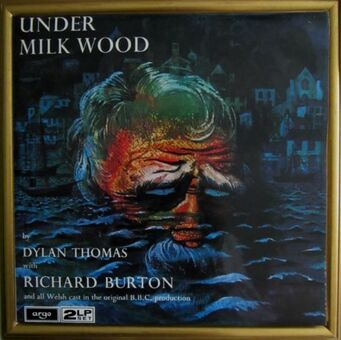
A much later issue of the Douglas Cleverdon, 1954 B.B.C recording of 'Under Milk Wood'. This two-disc edition is presented in a laminated gate-fold sleeve with the original Arthur Wragg cover painting on the front cover and on the reverse a beautiful photograph of Dylan Thomas's Boathouse at Laugharne, West Wales, as captured by photographer Jenny Edwards.
This edition of 'Under Milk Wood' was issued by Decca (Argo Division) with the same catalogue number as the original deluxe boxed set release and again is issued on the familiar blue and silver Argo labels.
This edition, issued after 1975, features the original sleeve notes, written by Daniel Jones, on the inside of the fold-out cover plus a reproduction of a charcoal sketch of Dylan Thomas by the renowned English artist, sculptor and writer, Michael Ayrton, which appears courtesy of the artist's widow, Mrs. Elizabeth Ayrton, and the Bruton Gallery, Somerset.
This edition of 'Under Milk Wood' was issued by Decca (Argo Division) with the same catalogue number as the original deluxe boxed set release and again is issued on the familiar blue and silver Argo labels.
This edition, issued after 1975, features the original sleeve notes, written by Daniel Jones, on the inside of the fold-out cover plus a reproduction of a charcoal sketch of Dylan Thomas by the renowned English artist, sculptor and writer, Michael Ayrton, which appears courtesy of the artist's widow, Mrs. Elizabeth Ayrton, and the Bruton Gallery, Somerset.
The stunning back cover photograph of the Dylan Thomas Boathouse and the blue and silver Argo label for this later edition of 'Under Milk Wood'.
'Under Milk Wood by Dylan Thomas' (Version Three)
Argo Records, 1954
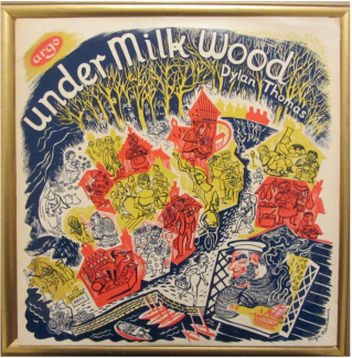
A completely different packaged release of the 1954 B.B.C recording of Dylan Thomas's 'Under Milk Wood' which again features Richard Burton cast in the role of 'First Voice'.
This edition was released on two vinyl discs packaged in two separate covers, both featuring a stunning and highly evocative 1950's design by artist Olga Lehmann.
The covers were printed by the Graphis Press Limited, London.
This later edition of Dylan Thomas's 'Under Milk Wood' was released by The Argo Record Company Limited, London on blue and silver Argo labels and with two separate catalogue numbers, RG21 and RG22, and was again produced by Douglas Cleverdon with the full co-operation of the British Broadcasting Corporation.
The reverse of the covers features the full B.B.C cast list and the original notes, as transcribed above, written by the composer Daniel Jones.
This edition was released on two vinyl discs packaged in two separate covers, both featuring a stunning and highly evocative 1950's design by artist Olga Lehmann.
The covers were printed by the Graphis Press Limited, London.
This later edition of Dylan Thomas's 'Under Milk Wood' was released by The Argo Record Company Limited, London on blue and silver Argo labels and with two separate catalogue numbers, RG21 and RG22, and was again produced by Douglas Cleverdon with the full co-operation of the British Broadcasting Corporation.
The reverse of the covers features the full B.B.C cast list and the original notes, as transcribed above, written by the composer Daniel Jones.
The two different Argo record labels for the single sleeve and gatefold sleeve issues of 'Under Milk Wood' catalogue numbers RG21 and RG22
'Homage To Dylan Thomas' Recorded Live At The Globe Theatre, Shaftesbury Avenue, London
The Argo Record Company, 1954
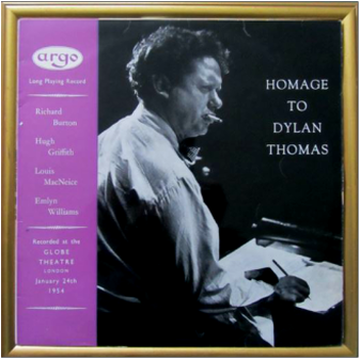
A copy of the original British release of the special live recording of the 1954 Globe Theatre charity event, organised by The Sunday Times, simply entitled, 'Homage To Dylan Thomas'.
This vinyl album was released by The Decca Record Company, (Argo Division), in 1954 and was issued with the catalogue number PLP 1060.
This copy is the original mono edition which was issued on a blue and silver Argo label.
The recording was made during the charity Memorial event entitled, 'Homage To Dylan Thomas', which was sponsored by The Sunday Times and staged by The Group Theatre. The event was held at the Globe Theatre on Shaftesbury Avenue, London on January the 24th, 1954 in order to raise money for Dylan Thomas's widow, Caitlin, and their three young children.
The sleeve notes which appear on the reverse of the album cover feature a moving tribute to Dylan Thomas written by Dame Edith Sitwell which would also appear on the 1955 Argo album entitled, 'Richard Burton Reads Fifteen Poems By Dylan Thomas'.(As featured above).
Richard Burton's readings which are included on this album are, 'The Hunchback In The Park', 'Poem In October' and a beautiful rendition of the haunting poem, 'Fern Hill.
This vinyl album was released by The Decca Record Company, (Argo Division), in 1954 and was issued with the catalogue number PLP 1060.
This copy is the original mono edition which was issued on a blue and silver Argo label.
The recording was made during the charity Memorial event entitled, 'Homage To Dylan Thomas', which was sponsored by The Sunday Times and staged by The Group Theatre. The event was held at the Globe Theatre on Shaftesbury Avenue, London on January the 24th, 1954 in order to raise money for Dylan Thomas's widow, Caitlin, and their three young children.
The sleeve notes which appear on the reverse of the album cover feature a moving tribute to Dylan Thomas written by Dame Edith Sitwell which would also appear on the 1955 Argo album entitled, 'Richard Burton Reads Fifteen Poems By Dylan Thomas'.(As featured above).
Richard Burton's readings which are included on this album are, 'The Hunchback In The Park', 'Poem In October' and a beautiful rendition of the haunting poem, 'Fern Hill.
The reverse of the original cover for 'Homage To Dylan Thomas' and the blue and silver Argo label, issued with the catalogue number PLP 1060.
'Homage To Dylan Thomas' (Version Two)
The Argo Record Company, 1954
A further copy of the outstanding vinyl album, 'Homage to Dylan Thomas'. This version was released on a white Argo Record Company label, with the catalogue number RG29 and was presented in just a thin wrap-around card cover, which features the same cover notes as the version above. The card cover was printed for this release by the North View Press Limited, based in Coventry.
'The World Of Dylan Thomas In Poetry And Prose'
Decca Records (Argo Division), 1971
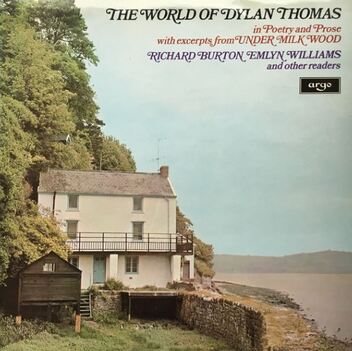
A copy of the original British release of the wonderful vinyl album, 'The World Of Dylan Thomas In Poetry And Prose'.
This edition was first released in 1971 by Decca Records (Argo Division) and was issued with the catalogue number ARG 3595 PA/A 166.
This is the original mono edition which was issued on a red and silver Argo label.
The lovely cover photograph of Dylan Thomas's Boathouse, located in Laugharne, west Wales, was captured by the photographer, Jenny Edwards.
Contained on this album is a varied selection of poetry and prose written by Dylan Thomas, including excerpts from his 'Play for Voices, 'Under Milk Wood', as read by Richard Burton, Richard Bebb and Emlyn Williams.
The selections of Dylan Thomas's poetry which Richard Burton performs on this album were recorded during the Memorial event entitled, 'Homage To Dylan Thomas', sponsored by The Sunday Times which was staged at the Globe Theatre in London on January the 24th 1954.The complete track-listing for this wonderful album is as follows;
In My Craft Or Sullen Art / Memories Of Childhood / Excerpt From 'Under Milk Wood' / Poem In October / Excerpt From 'Adventures In The Skin Trade' / Do Not Go Gentle Into That Good Night / A Visit To America / The Hunchback In The Park / Fern Hill / Excerpt From 'Under Milk Wood' / And Death Shall Have No Dominion.
This edition was first released in 1971 by Decca Records (Argo Division) and was issued with the catalogue number ARG 3595 PA/A 166.
This is the original mono edition which was issued on a red and silver Argo label.
The lovely cover photograph of Dylan Thomas's Boathouse, located in Laugharne, west Wales, was captured by the photographer, Jenny Edwards.
Contained on this album is a varied selection of poetry and prose written by Dylan Thomas, including excerpts from his 'Play for Voices, 'Under Milk Wood', as read by Richard Burton, Richard Bebb and Emlyn Williams.
The selections of Dylan Thomas's poetry which Richard Burton performs on this album were recorded during the Memorial event entitled, 'Homage To Dylan Thomas', sponsored by The Sunday Times which was staged at the Globe Theatre in London on January the 24th 1954.The complete track-listing for this wonderful album is as follows;
In My Craft Or Sullen Art / Memories Of Childhood / Excerpt From 'Under Milk Wood' / Poem In October / Excerpt From 'Adventures In The Skin Trade' / Do Not Go Gentle Into That Good Night / A Visit To America / The Hunchback In The Park / Fern Hill / Excerpt From 'Under Milk Wood' / And Death Shall Have No Dominion.
The reverse of the cover to 'The World Of Dylan Thomas' which features the charcoal sketch of the poet by Michael Ayrton. Also pictured is the original red Argo mono record label, issued with the catalogue number ARG 3595 PA/A 166.
'The Love Poems of John Donne Read By Richard Burton'
Caedmon Records, 1958
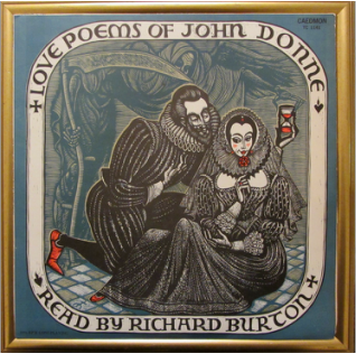
An original American copy of the 1958 Caedmon Records release entitled, 'The Love Poems of John Donne Read By Richard Burton'.
This original American edition was released, with the catalogue number Caedmon TC 1141, in 1958.
This copy is the original stereo version and is issued on blue and white Caedmon labels.
Richard Burton was directed for this beautiful recording by the screenwriter and playwright Howard Sackler.
A detailed history relating to the beautiful love poetry of John Donne is contained in the cover notes, and reads;
" From 1921, the year Eliot reviewed Grierson's anthology of metaphysical poetry, to the middle Forties, Donne's work was considered the acme of English poetry.. It was thought to be the deepest, most passionate and beautiful, most significant and interesting, most modern. The view today is that he is less a poet of 'our' time than a timeless one. But whether English poetry reached its high water-mark in Milton or Donne is largely a matter of one's personal measuring equipment.
He was very popular in the thirty years following the first publication of his poems, though he was little known before 1620. a number of his lyrics came into the hands of musicians and were set, but he was neither quoted nor imitated. Ben Jonson reported that after Donne was ordained, he greatly repented and wished to destroy his poems. But by that time a large number of MS copies were in existence, and had passed outside the circle of his friends. As soon as Donne died, the poems appeared in print.
Dryden thought Donne 'the greatest wit, though not the best Poet of our nation', Dr. Johnson that wit as, 'a combination of dissimilar images, or discovery of occult resemblances, in things apparently unlike'.' The term metaphysical, describing the wit and erudition as well as the reflective philosophy and introspection, was recently defined by T. S. Eliot: 'I take as metaphysical poetry that in which what is ordinarily apprehensible only by thought is brought within the grasp of feeling, or that in which what is ordinarily only felt as transformed into thought without ceasing to be feeling'.
The love poems are mostly monologues spoken by the lover to his beloved. The important figure is the lover, the 'I'. There has been much discussion of whether these poems are truly autobiographical. But whether he lived a rake's life or merely had a rake's imagination, he created a whole new love poetry; turning his back on the ascetic medieval and the ideal Renaissance concepts, he described a real and experienced love, whose highest fruition is the joyous union of body and soul. This violent emotion is not recollected in tranquility at all, but poured out in the heat of the moment.
The vessel of the containment - the form of the verse - is as rebellious as its content. English versification in Donne's day was in such a state of flux that it took real effort to break the pattern. But with virtuoso technique, and the ability to bend both meaning and sound to his bow, he broke rule after rule, thereby creating new rules.
Unlike his contemporaries, he was not a writer of good lines to be quoted from context long after the poems themselves are forgotten. What Donne created was a body of whole poems, conceived each in its totality and remembered that way. Their range of mood and tone is so great that there is hardly an adjective in the thesaurus which is not applicable to one of his poems."
The complete track-listing for this beautiful album is as follows;
The Good Morrow / Go And Catch A Falling Star / The Rising Sun / The Canonization / The Triple Fool / Sweetest Love I Do Not Go / The Legacie / A Feaver / The Anniversary / The Flea / The Curse / A Nocturnall / The Apparition / A Valediction:Forbidden Mourning / The Extasie / The Funerall / The Relique / Elergy I:Jealosie / Elegy VIII:The Comparison / Elegy VII:Natures Lay Ideot.
This original American edition was released, with the catalogue number Caedmon TC 1141, in 1958.
This copy is the original stereo version and is issued on blue and white Caedmon labels.
Richard Burton was directed for this beautiful recording by the screenwriter and playwright Howard Sackler.
A detailed history relating to the beautiful love poetry of John Donne is contained in the cover notes, and reads;
" From 1921, the year Eliot reviewed Grierson's anthology of metaphysical poetry, to the middle Forties, Donne's work was considered the acme of English poetry.. It was thought to be the deepest, most passionate and beautiful, most significant and interesting, most modern. The view today is that he is less a poet of 'our' time than a timeless one. But whether English poetry reached its high water-mark in Milton or Donne is largely a matter of one's personal measuring equipment.
He was very popular in the thirty years following the first publication of his poems, though he was little known before 1620. a number of his lyrics came into the hands of musicians and were set, but he was neither quoted nor imitated. Ben Jonson reported that after Donne was ordained, he greatly repented and wished to destroy his poems. But by that time a large number of MS copies were in existence, and had passed outside the circle of his friends. As soon as Donne died, the poems appeared in print.
Dryden thought Donne 'the greatest wit, though not the best Poet of our nation', Dr. Johnson that wit as, 'a combination of dissimilar images, or discovery of occult resemblances, in things apparently unlike'.' The term metaphysical, describing the wit and erudition as well as the reflective philosophy and introspection, was recently defined by T. S. Eliot: 'I take as metaphysical poetry that in which what is ordinarily apprehensible only by thought is brought within the grasp of feeling, or that in which what is ordinarily only felt as transformed into thought without ceasing to be feeling'.
The love poems are mostly monologues spoken by the lover to his beloved. The important figure is the lover, the 'I'. There has been much discussion of whether these poems are truly autobiographical. But whether he lived a rake's life or merely had a rake's imagination, he created a whole new love poetry; turning his back on the ascetic medieval and the ideal Renaissance concepts, he described a real and experienced love, whose highest fruition is the joyous union of body and soul. This violent emotion is not recollected in tranquility at all, but poured out in the heat of the moment.
The vessel of the containment - the form of the verse - is as rebellious as its content. English versification in Donne's day was in such a state of flux that it took real effort to break the pattern. But with virtuoso technique, and the ability to bend both meaning and sound to his bow, he broke rule after rule, thereby creating new rules.
Unlike his contemporaries, he was not a writer of good lines to be quoted from context long after the poems themselves are forgotten. What Donne created was a body of whole poems, conceived each in its totality and remembered that way. Their range of mood and tone is so great that there is hardly an adjective in the thesaurus which is not applicable to one of his poems."
The complete track-listing for this beautiful album is as follows;
The Good Morrow / Go And Catch A Falling Star / The Rising Sun / The Canonization / The Triple Fool / Sweetest Love I Do Not Go / The Legacie / A Feaver / The Anniversary / The Flea / The Curse / A Nocturnall / The Apparition / A Valediction:Forbidden Mourning / The Extasie / The Funerall / The Relique / Elergy I:Jealosie / Elegy VIII:The Comparison / Elegy VII:Natures Lay Ideot.
The reverse of the American Caedmon Records release of 'Love Poems Of John Donne' and the blue and white Caedmon record label.
Samuel Taylor Coleridge 'The Rime Of The Ancient Mariner' Argo Records, 1954
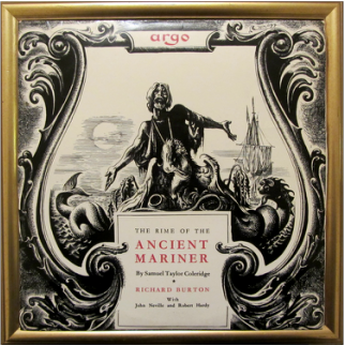
In 1954 Richard Burton, Robert Hardy and John Neville came together to record Samuel Taylor Coleridge's classic and haunting narrative poem, 'The Rime Of The Ancient Mariner'.
This recording was released on vinyl album as part of the Argo series entitled 'Anthology Of Spoken Poetry' recordings, this album being volume nine of the series.
Also included on this original vinyl release are Coleridge's beautiful poems, 'Xanadu' and 'Frost at Midnight', both of which were also read by Richard Burton.
The sleeve notes on the reverse of the cover comprise of a detailed history of Coleridge's life and essays regarding 'The Rime Of The Ancient Mariner' and the poems contained on this release The notes were written by the producer, Harley J. Usill, founder of Argo Records.
This copy is the original British Argo release and was pressed with blue and silver Argo labels and issued with the catalogue number RG41.
This recording was released on vinyl album as part of the Argo series entitled 'Anthology Of Spoken Poetry' recordings, this album being volume nine of the series.
Also included on this original vinyl release are Coleridge's beautiful poems, 'Xanadu' and 'Frost at Midnight', both of which were also read by Richard Burton.
The sleeve notes on the reverse of the cover comprise of a detailed history of Coleridge's life and essays regarding 'The Rime Of The Ancient Mariner' and the poems contained on this release The notes were written by the producer, Harley J. Usill, founder of Argo Records.
This copy is the original British Argo release and was pressed with blue and silver Argo labels and issued with the catalogue number RG41.
The reverse album cover to the Argo release, 'The Rime Of The Ancient Mariner', and the blue and silver Argo label, catalogue number RG41.
William Shakespeare's 'The Rape Of Lucrece'
Caedmon Records, American Boxed-Set Edition, 1961
A copy of the rare, American two-disc boxed set edition of William Shakespeare's narrative poem, 'The Rape of Lucrece'.
This vinyl set was released on the 'Shakespeare Recording Society Incorporated' record label, in association with Caedmon Records, in 1961 and issued with the catalogue number SRS 239. The poem, read in its entirety by Richard Burton, was directed for this recording by Howard Sackler.
Also included on this boxed set are the Shakespeare poems, 'The Passionate Pilgrim', 'Sonnets To Sundry Notes Of Music', and 'The Phoenix and Turtle' read by Dame Edith Evans and Sir Donald Wolfit, also under the direction of Howard Sackler.
Included with this vinyl album boxed-set is a booklet featuring the complete text for this recording of 'The Rape Of Lucrece' as well as the other poems which feature on this release.
The striking cover features an anonymous Renaissance sculpture of Lucrece which, at the time of this albums initial release in 1961, was housed in the Walters Art Gallery in Baltimore, Maryland.
This vinyl set was released on the 'Shakespeare Recording Society Incorporated' record label, in association with Caedmon Records, in 1961 and issued with the catalogue number SRS 239. The poem, read in its entirety by Richard Burton, was directed for this recording by Howard Sackler.
Also included on this boxed set are the Shakespeare poems, 'The Passionate Pilgrim', 'Sonnets To Sundry Notes Of Music', and 'The Phoenix and Turtle' read by Dame Edith Evans and Sir Donald Wolfit, also under the direction of Howard Sackler.
Included with this vinyl album boxed-set is a booklet featuring the complete text for this recording of 'The Rape Of Lucrece' as well as the other poems which feature on this release.
The striking cover features an anonymous Renaissance sculpture of Lucrece which, at the time of this albums initial release in 1961, was housed in the Walters Art Gallery in Baltimore, Maryland.
William Shakespeare's 'The Tragedy Of Coriolanus' Caedmon Literary Records, Boxed-Set Edition, 1962
A beautifully presented, and quite rare, three disc boxed-set edition of a production of William Shakespeare's historical and tragic play, 'Coriolanus'.
Again, directed by Howard Sackler, Richard Burton is powerful and magnificent in the title role and is superbly supported by a fine cast which included Jessica Tandy, Kenneth Haigh, Michael Hordern, Robert Stephens and Michael Gwynn.
This American boxed-set edition, dating from 1962, was released by Caedmon Records as part of their Literary Series of recordings in association with The Shakespeare Recording Society Incorporated, based in New York.
This rare boxed-set edition is complete with the inclusion of the text to this production of 'Coriolanus', especially published for this recording and edited by G. B. Harrison.
Again, directed by Howard Sackler, Richard Burton is powerful and magnificent in the title role and is superbly supported by a fine cast which included Jessica Tandy, Kenneth Haigh, Michael Hordern, Robert Stephens and Michael Gwynn.
This American boxed-set edition, dating from 1962, was released by Caedmon Records as part of their Literary Series of recordings in association with The Shakespeare Recording Society Incorporated, based in New York.
This rare boxed-set edition is complete with the inclusion of the text to this production of 'Coriolanus', especially published for this recording and edited by G. B. Harrison.
The interior of this superbly presented boxed-set of William Shakespeare's 'Coriolanus', complete with linear notes and booklet. This edition was released by Caedmon Records and was issued with the catalogue number SRS-M-226.
'The English Poets: Samuel Taylor Coleridge'
Decca Records (Argo Division), 1965
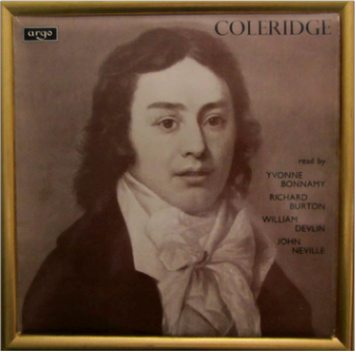
An original copy of the U.K. pressing of 'The English Poets; Samuel Taylor Coleridge', as read by Richard Burton, John Neville and others.
Released on the Argo label as part of the series entitled 'The English Poets From Chaucer To Yeats' the album was recorded in association with the British Council and the Oxford University Press and directed by George Rylands.
This album, released in 1965, includes the 1954 recording of 'The Rime Of The Ancient Mariner' featuring Richard Burton, John Neville and Robert Hardy as well as the recording by Richard Burton of Coleridge's poem 'Frost At Midnight'.
The album also includes 'Kubla Khan' read by William Devlin, extracts from 'Christabel' read by Yvonne Bonnamy and John Neville reading 'Dejection, an Ode', 'The Pains Of Sleep' and an except from 'The Piccolomini'.
The reverse of the cover features extensive and detailed notes relating to the life and work of Coleridge.
This copy was released on a blue and silver Argo label and was issued with the catalogue number RG 438.
This edition also includes a four-page booklet which features the text of 'The Rime Of The Ancient Mariner' as well as the other poems read on this outstanding vinyl release.
The image of Samuel Taylor Coleridge which appears on the cover of this Argo release is a reproduction of the portrait by Peter Vandyke, the original being on display at the National Portrait Gallery, London.
Released on the Argo label as part of the series entitled 'The English Poets From Chaucer To Yeats' the album was recorded in association with the British Council and the Oxford University Press and directed by George Rylands.
This album, released in 1965, includes the 1954 recording of 'The Rime Of The Ancient Mariner' featuring Richard Burton, John Neville and Robert Hardy as well as the recording by Richard Burton of Coleridge's poem 'Frost At Midnight'.
The album also includes 'Kubla Khan' read by William Devlin, extracts from 'Christabel' read by Yvonne Bonnamy and John Neville reading 'Dejection, an Ode', 'The Pains Of Sleep' and an except from 'The Piccolomini'.
The reverse of the cover features extensive and detailed notes relating to the life and work of Coleridge.
This copy was released on a blue and silver Argo label and was issued with the catalogue number RG 438.
This edition also includes a four-page booklet which features the text of 'The Rime Of The Ancient Mariner' as well as the other poems read on this outstanding vinyl release.
The image of Samuel Taylor Coleridge which appears on the cover of this Argo release is a reproduction of the portrait by Peter Vandyke, the original being on display at the National Portrait Gallery, London.
The reverse of the 'English Poets; Coleridge', album cover and the blue and silver Argo record label, issued with the catalogue number RG 438. A later copy of this album is also held in the Burton Museum collection, issued with the catalogue number PLP 1039.
'The Days Of Wilfred Owen' Original Soundtrack Album
Warner Brothers Records, 1963
"All a poet can do is warn". The Magnificent Voice Of Richard Burton Interprets The World's Greatest Poetry Of War, from the Soundtrack of "The Days Of Wilfred Owen".
A copy of the original monophonic American vinyl album of the soundtrack to "The Days Of Wilfred Owen". This original vinyl record was released by Warner Brothers Records Incorporated, Burbank, California and Sandyfair Incorporated and issued with the catalogue number Warner Brothers B 1635.
This is the original mono pressing from 1963, issued on a gold Warner Brothers label. The recording was produced by Richard Lewine and Bob Bach and the accompanying musical score, supervised for this recording by George Lee, to these moving and beautifully read poems was composed by Richard Lewine under the musical supervision of Sid Ramin.
The text of the cover notes reads;
"This is not about heroes.
English poetry is not yet fit to speak of them."
So begins this recording. And the last words heard at its end are, "You would not tell with such high zest to children for some desperate glory the old lie; Dulce et Decorum est Pro Patria Mori" (To die for one's country is sweet and proper).
Between these lines lies the legacy of a pitifully wasted life. For these are the blood-drenched words of a young English poet named Wilfred Owen, killed in France at the age of twenty-five, exactly one week before the Armistice of November 11, 1918. Nearly half a century has gone by since Owen wrote so vividly of the war that began, indeed, with "high zest" (both the English and the Germans were sure the fighting would be over in a few weeks) and then plunged hopelessly into four years of stalemate and slaughter.
In the years since that war we have been through unbelievable cataclysms of man against man; the obliteration of whole cities with a single bomb, millions marched into gas chambers, police dogs and cattle prods, napalm bombs - who can keep track of all the degradations of the century? And yet, there is something peculiarly haunting and timeless about the poetry of Owen, something that gives it particular relevance today.
The poems herewith, read so movingly by probably the greatest voice of our times, are almost the entire output of Wilfred Owen's brief life. They were recorded, appropriately enough, in France, (Richard Burton was filming there at the time) and are also to be heard in a short colour film, 'The Days Of Wilfred Owen'. Richard Burton brings to the recording a compassion and brilliance in his readings of Wilfred Owen's poetry. It is a moving experience, one unequalled in the history of spoken recordings".
The poems of Wilfred Owen which appear on this outstanding album are as follows;
Preface / Send-Off / Arms And The Boy / Sonnet: On Seeing A Piece Of Our Artillery Brought Into Action / Strange Meeting / Le Christianisme / Soldier's Dream / The Last Laugh / At A Calvary Near The Ancre / The Sentry / Anthem For Doomed Youth / Apologia Pro Poemate Meo / The Show / Conscious / Greater Love / Asleep / Futility / The Next War / Dulce At Decorum Est.
A copy of the original monophonic American vinyl album of the soundtrack to "The Days Of Wilfred Owen". This original vinyl record was released by Warner Brothers Records Incorporated, Burbank, California and Sandyfair Incorporated and issued with the catalogue number Warner Brothers B 1635.
This is the original mono pressing from 1963, issued on a gold Warner Brothers label. The recording was produced by Richard Lewine and Bob Bach and the accompanying musical score, supervised for this recording by George Lee, to these moving and beautifully read poems was composed by Richard Lewine under the musical supervision of Sid Ramin.
The text of the cover notes reads;
"This is not about heroes.
English poetry is not yet fit to speak of them."
So begins this recording. And the last words heard at its end are, "You would not tell with such high zest to children for some desperate glory the old lie; Dulce et Decorum est Pro Patria Mori" (To die for one's country is sweet and proper).
Between these lines lies the legacy of a pitifully wasted life. For these are the blood-drenched words of a young English poet named Wilfred Owen, killed in France at the age of twenty-five, exactly one week before the Armistice of November 11, 1918. Nearly half a century has gone by since Owen wrote so vividly of the war that began, indeed, with "high zest" (both the English and the Germans were sure the fighting would be over in a few weeks) and then plunged hopelessly into four years of stalemate and slaughter.
In the years since that war we have been through unbelievable cataclysms of man against man; the obliteration of whole cities with a single bomb, millions marched into gas chambers, police dogs and cattle prods, napalm bombs - who can keep track of all the degradations of the century? And yet, there is something peculiarly haunting and timeless about the poetry of Owen, something that gives it particular relevance today.
The poems herewith, read so movingly by probably the greatest voice of our times, are almost the entire output of Wilfred Owen's brief life. They were recorded, appropriately enough, in France, (Richard Burton was filming there at the time) and are also to be heard in a short colour film, 'The Days Of Wilfred Owen'. Richard Burton brings to the recording a compassion and brilliance in his readings of Wilfred Owen's poetry. It is a moving experience, one unequalled in the history of spoken recordings".
The poems of Wilfred Owen which appear on this outstanding album are as follows;
Preface / Send-Off / Arms And The Boy / Sonnet: On Seeing A Piece Of Our Artillery Brought Into Action / Strange Meeting / Le Christianisme / Soldier's Dream / The Last Laugh / At A Calvary Near The Ancre / The Sentry / Anthem For Doomed Youth / Apologia Pro Poemate Meo / The Show / Conscious / Greater Love / Asleep / Futility / The Next War / Dulce At Decorum Est.
The famous Army service photograph of Wilfred Owen pictured alongside an image of Richard Burton, contemporary to the recording, which appear on the reverse of the original American Warner Brothers album cover to 'The Days Of Wilfred Owen'.
'Richard Burton - A Personal Anthology'
Decca Records (Argo Division), 1978
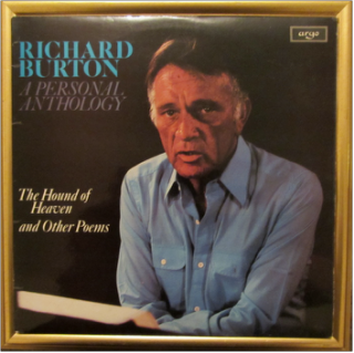
An original copy of the outstanding vinyl album released by Decca (Argo Division) in 1978 entitled 'Richard Burton - A Personal Anthology'.
This is the original British stereo version, pressed with blue and silver Argo Record company labels and issued with the catalogue number ZDSW 714.
Richard Burton reads a selection of his favourite poems, from writers such as Sir John Betjeman, John Donne, Robert Graves, Dylan Thomas and many others.
The cover notes for this stunning release, written by producer Harley J. Usill in July 1978, read;
"For this personal choice Richard Burton has selected in the main, poems which have for him an especial significance, although it would be wrong to suggest that these are his all time favourite poems, for on another day he might well have selected twenty different ones. However, some of these at any rate would accompany Richard on his proverbial 'Desert Island'.
This album contains a fairly large selection of metaphysical and contemplative poetry including that strange, haunting and difficult poem, 'The Hound Of Heaven' by Francis Thompson, and Gerard Manley Hopkins' great outcry, 'The Leaden Echo And The Golden Echo'. Certain personal felicities occur too. There is a memory from one of his first great stage performances in London's West End in Christopher Fry's, 'The Boy With A Cart'.
Richard also pays tribute to his adoptive father, Philip Burton, who played the Reverend Eli Jenkins in the famous B.B.C. production of 'Under Milk Wood', by reading 'The Morning Hymn'. Another memory of Dylan Thomas is the moving 'Elegy' on the death of his father, a poem reconstructed by Vernon Watkins and published posthumously.
The programme contains a passing glance at Shakespeare in the Richard II, 'Hollow Crown' soliloquy and Prospero's last speech from 'The Tempest'. There is too the wry Celtic humour of Robert Graves', 'Welsh Incident' and the hard bitter poems of the Reverend R. S. Thomas. From Sir John Betjeman there is the moving poem, 'In Memoriam Walter Ramsden' together with the more familiar 'Hunter Trials'. The reflective mood of a sudden moment of recollection by Edward Thomas and the 'Desiderata' from an old church in Baltimore is contrasted with the passionate late 16th century love lyric by Marlowe, followed immediately by Raleigh's cynical put-down in reply. John Donne's love poems are set alongside his sonnet in defiance of death. All in all, a varied collection, a great actor's choice which reveals his delight in words.
Producing this record was a totally absorbing experience. I don't often replay records I have been associated with, at least not for a long time afterwards, but this I have already played several times just for the pleasure of listening to the music of words spoken as only Richard Burton at the top of his form can. it is a recording I for one will treasure and often turn to in the future".
The complete track-listing of titles which appear on this outstanding album is as follows;
The Leaden Echo And The Golden Echo / Lines From 'The Boy With A Cart' / The Good Morrow / The Passionate Shepherd To His Love / Go Catch A Falling Star / Non Sum Qualis Eram Bonae Sub Regno Cynarae / Yasmin, A Ghazel / Poem From 'Under Milk Wood' / Welsh Incident / Exequy On His Wife / Lament For The Makers / The Passionate Wife's Pilgrimage / Desiderata / Adelstrop / Autumn / Priest And Peasant / The Lonely Farmer / Lines From 'Richard II' / In Memoriam Walter Ramsden / Hunter Trials / To Christ / At The Round Earth's Imagined Corners / Elegy For His Father / Death Be Not Proud / The Hound Of Heaven / Lines From William Shakespeare's 'The Tempest'.
The album was produced and edited by Harley J. Usill, founder of Argo Records, who also wrote the accompanying sleeve notes.
The recording was undertaken at Argo Studios, London with the assistance of Production Assistant Angela Hills. The photographs of Richard Burton used on the album cover were captured by David Usill.
This is the original British stereo version, pressed with blue and silver Argo Record company labels and issued with the catalogue number ZDSW 714.
Richard Burton reads a selection of his favourite poems, from writers such as Sir John Betjeman, John Donne, Robert Graves, Dylan Thomas and many others.
The cover notes for this stunning release, written by producer Harley J. Usill in July 1978, read;
"For this personal choice Richard Burton has selected in the main, poems which have for him an especial significance, although it would be wrong to suggest that these are his all time favourite poems, for on another day he might well have selected twenty different ones. However, some of these at any rate would accompany Richard on his proverbial 'Desert Island'.
This album contains a fairly large selection of metaphysical and contemplative poetry including that strange, haunting and difficult poem, 'The Hound Of Heaven' by Francis Thompson, and Gerard Manley Hopkins' great outcry, 'The Leaden Echo And The Golden Echo'. Certain personal felicities occur too. There is a memory from one of his first great stage performances in London's West End in Christopher Fry's, 'The Boy With A Cart'.
Richard also pays tribute to his adoptive father, Philip Burton, who played the Reverend Eli Jenkins in the famous B.B.C. production of 'Under Milk Wood', by reading 'The Morning Hymn'. Another memory of Dylan Thomas is the moving 'Elegy' on the death of his father, a poem reconstructed by Vernon Watkins and published posthumously.
The programme contains a passing glance at Shakespeare in the Richard II, 'Hollow Crown' soliloquy and Prospero's last speech from 'The Tempest'. There is too the wry Celtic humour of Robert Graves', 'Welsh Incident' and the hard bitter poems of the Reverend R. S. Thomas. From Sir John Betjeman there is the moving poem, 'In Memoriam Walter Ramsden' together with the more familiar 'Hunter Trials'. The reflective mood of a sudden moment of recollection by Edward Thomas and the 'Desiderata' from an old church in Baltimore is contrasted with the passionate late 16th century love lyric by Marlowe, followed immediately by Raleigh's cynical put-down in reply. John Donne's love poems are set alongside his sonnet in defiance of death. All in all, a varied collection, a great actor's choice which reveals his delight in words.
Producing this record was a totally absorbing experience. I don't often replay records I have been associated with, at least not for a long time afterwards, but this I have already played several times just for the pleasure of listening to the music of words spoken as only Richard Burton at the top of his form can. it is a recording I for one will treasure and often turn to in the future".
The complete track-listing of titles which appear on this outstanding album is as follows;
The Leaden Echo And The Golden Echo / Lines From 'The Boy With A Cart' / The Good Morrow / The Passionate Shepherd To His Love / Go Catch A Falling Star / Non Sum Qualis Eram Bonae Sub Regno Cynarae / Yasmin, A Ghazel / Poem From 'Under Milk Wood' / Welsh Incident / Exequy On His Wife / Lament For The Makers / The Passionate Wife's Pilgrimage / Desiderata / Adelstrop / Autumn / Priest And Peasant / The Lonely Farmer / Lines From 'Richard II' / In Memoriam Walter Ramsden / Hunter Trials / To Christ / At The Round Earth's Imagined Corners / Elegy For His Father / Death Be Not Proud / The Hound Of Heaven / Lines From William Shakespeare's 'The Tempest'.
The album was produced and edited by Harley J. Usill, founder of Argo Records, who also wrote the accompanying sleeve notes.
The recording was undertaken at Argo Studios, London with the assistance of Production Assistant Angela Hills. The photographs of Richard Burton used on the album cover were captured by David Usill.
The reverse to this wonderfully produced album and the blue and silver Argo record label issued with the catalogue number ZDSW 714.
Dialogue Highlights From The Paramount Film 'Becket'
RCA Victor Records American Release, 1964
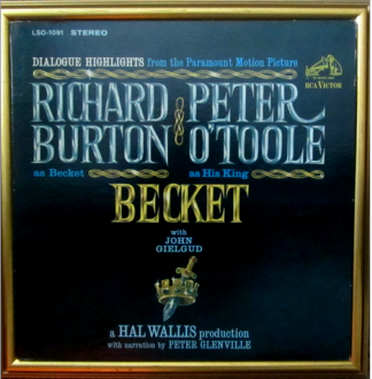
A copy of the original American pressing of the 'Dialogue Highlights From The Paramount Motion Picture 'Becket', which also incorporates a narration by the director of the film, Peter Glenville.
Alongside the dialogue highlights the album features the original musical score which was composed and conducted by Laurence Rosenthal.
The album was produced for this vinyl release by Joe Linhart and released in 1964 by RCA Victor with the catalogue number LSO-1091.
This copy is the original American stereo edition, issued on RCA Victor black labels which incorporate the famous 'Nipper' logo for 'His Master's Voice'.
This vinyl edition of the recording is presented in a stunning gate-fold sleeve which features photographs from the film and also includes actor, writer and director biographies.
The back cover comprises of a film synopsis and notes written by the producer of 'Becket', Hal B. Wallis, which read in their entirety;
"The events surrounding the lives of Thomas Becket, Chancellor of England and finally Archbishop of Canterbury, and 'His King', Henry II, represent an encounter unsurpassed in dramatic impact. Here, as dramatized in this film of the remarkable play by Jean Anouilh, is the intensely personal conflict between two men heightened immeasurably by the part which they played in the historic struggle between two powers in England. Becket represents the Church in England. His increasing devotion to the cause of the Church's rights ultimately resulted in his murder. King Henry II represents the Crown. His unswerving espousal of absolute royal control of the church ultimately brought him to his knees at Becket's tomb in the twelfth century Canterbury Cathedral.
Henry and Becket were intimate friends before their views on the relative importance of Church and State clashed. They shared youthful adventures together, chatted laughingly about 'your Saxon way' and 'my Norman barons'. Henry was so sure of his friend's loyalty to the Crown that he appointed Becket Chancellor of England in the amazed presence of a gathering of churchmen. After this, the good times between the two dynamic young men continued - but not for long. Perhaps the first breach of their friendship came when Henry demanded Becket's beloved Lady Gwendolen as return of 'favour for favour', and shortly thereafter she took her own life. In Normandy, the first hint of the power struggle that was to tear their lives asunder is sensed when Becket warns Henry that 'the power of the Bishop's is increasing'. Later that very day, Henry hears of the death of the Archbishop of Canterbury and, in what he terms 'a master stroke', appoints Becket the new Archbishop. Now Becket must make his choice: personal devotion to his King or God. His prayers strengthen him in the final irrevocable decision.
As Archbishop of Canterbury, Becket refuses to allow priests to be tried by the King's officers and excommunicates the lord responsible for meting out the death penalty to a priest. A furious Henry then charges Becket with fraud in the handling of funds during his tenure as Chancellor. It is now open war between between the two once inseparable friends. The Church and the Crown have parted Becket and 'His King', irreparably and forever.
Their last dramatic face-to-face meeting is on the windswept, sandy shores of France where Becket had been taking refuge in a monastery. Although Becket agrees to return to England at Henry's promise of peace, he predicts, 'I sail tomorrow. I know that I shall never see you again'. It is a prophecy fulfilled all too soon. Becket is killed by four of Henry's barons who believe they are carrying out his wishes. When Henry, on the steps of the magnificent Canterbury Cathedral honours Becket as a Saint to the cheers of the multitude, the bitter personal struggle of the two men is laid to rest, yet the conflict between the Church and Crown is only beginning."
Alongside the dialogue highlights the album features the original musical score which was composed and conducted by Laurence Rosenthal.
The album was produced for this vinyl release by Joe Linhart and released in 1964 by RCA Victor with the catalogue number LSO-1091.
This copy is the original American stereo edition, issued on RCA Victor black labels which incorporate the famous 'Nipper' logo for 'His Master's Voice'.
This vinyl edition of the recording is presented in a stunning gate-fold sleeve which features photographs from the film and also includes actor, writer and director biographies.
The back cover comprises of a film synopsis and notes written by the producer of 'Becket', Hal B. Wallis, which read in their entirety;
"The events surrounding the lives of Thomas Becket, Chancellor of England and finally Archbishop of Canterbury, and 'His King', Henry II, represent an encounter unsurpassed in dramatic impact. Here, as dramatized in this film of the remarkable play by Jean Anouilh, is the intensely personal conflict between two men heightened immeasurably by the part which they played in the historic struggle between two powers in England. Becket represents the Church in England. His increasing devotion to the cause of the Church's rights ultimately resulted in his murder. King Henry II represents the Crown. His unswerving espousal of absolute royal control of the church ultimately brought him to his knees at Becket's tomb in the twelfth century Canterbury Cathedral.
Henry and Becket were intimate friends before their views on the relative importance of Church and State clashed. They shared youthful adventures together, chatted laughingly about 'your Saxon way' and 'my Norman barons'. Henry was so sure of his friend's loyalty to the Crown that he appointed Becket Chancellor of England in the amazed presence of a gathering of churchmen. After this, the good times between the two dynamic young men continued - but not for long. Perhaps the first breach of their friendship came when Henry demanded Becket's beloved Lady Gwendolen as return of 'favour for favour', and shortly thereafter she took her own life. In Normandy, the first hint of the power struggle that was to tear their lives asunder is sensed when Becket warns Henry that 'the power of the Bishop's is increasing'. Later that very day, Henry hears of the death of the Archbishop of Canterbury and, in what he terms 'a master stroke', appoints Becket the new Archbishop. Now Becket must make his choice: personal devotion to his King or God. His prayers strengthen him in the final irrevocable decision.
As Archbishop of Canterbury, Becket refuses to allow priests to be tried by the King's officers and excommunicates the lord responsible for meting out the death penalty to a priest. A furious Henry then charges Becket with fraud in the handling of funds during his tenure as Chancellor. It is now open war between between the two once inseparable friends. The Church and the Crown have parted Becket and 'His King', irreparably and forever.
Their last dramatic face-to-face meeting is on the windswept, sandy shores of France where Becket had been taking refuge in a monastery. Although Becket agrees to return to England at Henry's promise of peace, he predicts, 'I sail tomorrow. I know that I shall never see you again'. It is a prophecy fulfilled all too soon. Becket is killed by four of Henry's barons who believe they are carrying out his wishes. When Henry, on the steps of the magnificent Canterbury Cathedral honours Becket as a Saint to the cheers of the multitude, the bitter personal struggle of the two men is laid to rest, yet the conflict between the Church and Crown is only beginning."
The reverse of the gate-fold sleeve and original RCA Victor record label for the release of 'Becket' issued with the catalogue number LSO 1091.
The interior to the American gate-fold release of 'The Dialogue Highlights From Becket', which features actor biographies, a synopsis and black and white mages from the film.
Dialogue Highlights From The Paramount Film 'Becket'
RCA Victor Records U.K. Pressing, 1964
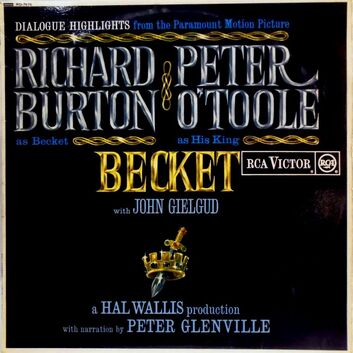
A copy of the original U.K. vinyl pressing of 'The Dialogue Highlights From The Paramount Motion Picture 'Becket''.
This single sleeve edition was released on the RCA Victor record label in association with the Decca Record Company, London and issued with the catalogue number RD-7679.
This is the original U.K. mono issue dating from 1964.
As with the American release, the sleeve notes which appear on the reverse of the record cover were written by the producer of the film, Hal Wallis.
Two still images from the film appear on the cover, one of Richard Burton and John Gielgud, in the role of King Louis VII of France and the other of Richard Burton and Peter O'Toole in the roles of Thomas Becket and Henry II, on horseback, photographed on location during filming at Bamburgh Beach in Northumberland.
The cover for this U.K. edition was printed by the MacNeill Press, London.
This single sleeve edition was released on the RCA Victor record label in association with the Decca Record Company, London and issued with the catalogue number RD-7679.
This is the original U.K. mono issue dating from 1964.
As with the American release, the sleeve notes which appear on the reverse of the record cover were written by the producer of the film, Hal Wallis.
Two still images from the film appear on the cover, one of Richard Burton and John Gielgud, in the role of King Louis VII of France and the other of Richard Burton and Peter O'Toole in the roles of Thomas Becket and Henry II, on horseback, photographed on location during filming at Bamburgh Beach in Northumberland.
The cover for this U.K. edition was printed by the MacNeill Press, London.
The reverse cover and RCA Victor record label from the original U.K. pressing of the 1964 vinyl album, 'The Dialogue Highlights from 'Becket'.
John Gielgud's 'Hamlet' Deluxe Boxed-Set Edition
Columbia Masterworks Records, 1964
A beautifully presented boxed-set edition of the original Broadway cast recording of 'John Gielgud's Production of William Shakespeare's Hamlet'. Comprising of four vinyl discs, this is the original American pressing released on the Columbia Masterworks label, catalogue number DOS 702. This is the original stereo pressing released on Columbia grey and orange labels in 1964.
Presented by Alexander H. Cohen, the production was produced for records by Goddard Lieberson. With Richard Burton in the lead role of Hamlet, Prince of Denmark and John Gielgud's recorded voice as the Ghost of Hamlet's father, the cast also included Hume Cronyn, Alfred Drake, Eileen Herlie, William Redfield, George Rose and George Voskovec.
Also included in this superb release is a reproduction of the theatre booklet which is illustrated throughout with black and white photographs and includes articles relating to the history of the play itself and the famous names who have undertaken the role, names such as Burbage, Garrick, Barrymore, Olivier and Gielgud himself, Shakespeare and his Contemporaries, costume design and full actor and crew profiles.
The introduction to the production, which appears in the booklet, reads in its entirety;
"April the twenty third, St. Georges Day, the Patron Saint's day of England was the date of William Shakespeare's birth and also of his death. this year the theatre celebrates the four-hundredth anniversary of the poet's birth, and for this quadricentennial, producer Alexander H. Cohen has assembled one of the most distinguished casts ever to grace tyhe Broadway stage. Richard Burton, who last played the role at the London Old Vic in 1954, is recreating the part of Hamlet and Sir John Gielgud is directing the production.
Hamlet is undoubtedly the most controversial of all the Shakespeare plays. Many thousand of books have been written about the play and psychological discussion and psychiatric analysis on the subject is apparently endless. It would be impossible for any one actor to combine even a minute percentage of the various interpretations that have been placed on the character of Hamlet. Various directors have employed an assortment of methods in their attempts to demonstrate the multi-faceted Hamlet mind. One American production had three different princes walking the boards! Only one spoke but each 'portrayed a different side of Hamlet's character'. From this welter of complexities came Sir John Gielgud's casual remark to Richard Burton; "No actor has really played Hamlet...one is always changing one's performance...It is a permanent rehearsal!" And so this production was born. This is a Hamlet, costumed in rehearsal clothes, stripped of all extraneous trappings, so that the beauty of the language and of the acting may shine through, unencumbered by elaborate reconstruction of any particular historical period.
This performance should be imagined by the audience as a final 'run-through', as actors call it. When a play has been thoroughly prepared, there is always a full final rehearsal of the text and action played straight through without interruption from the director. Properties or substitutes are provided for the actors but the costumes and scenery are yet to be added. It often happens, however, that these final adjuncts, however beautiful, may confuse and cramp the players' imaginations and intrude on the poetic imagery of Shakespeare's text.
The play has been divided into two parts. The first break comes at the end of Act III Scene I after Claudius and Polonius have overheard the conversation between Ophelia and Hamlet. The second part starts with Hamlet's instructions to the players."
The booklet was designed by Tom Hannan and was published by Dunetz and Lovett, New York.
Presented by Alexander H. Cohen, the production was produced for records by Goddard Lieberson. With Richard Burton in the lead role of Hamlet, Prince of Denmark and John Gielgud's recorded voice as the Ghost of Hamlet's father, the cast also included Hume Cronyn, Alfred Drake, Eileen Herlie, William Redfield, George Rose and George Voskovec.
Also included in this superb release is a reproduction of the theatre booklet which is illustrated throughout with black and white photographs and includes articles relating to the history of the play itself and the famous names who have undertaken the role, names such as Burbage, Garrick, Barrymore, Olivier and Gielgud himself, Shakespeare and his Contemporaries, costume design and full actor and crew profiles.
The introduction to the production, which appears in the booklet, reads in its entirety;
"April the twenty third, St. Georges Day, the Patron Saint's day of England was the date of William Shakespeare's birth and also of his death. this year the theatre celebrates the four-hundredth anniversary of the poet's birth, and for this quadricentennial, producer Alexander H. Cohen has assembled one of the most distinguished casts ever to grace tyhe Broadway stage. Richard Burton, who last played the role at the London Old Vic in 1954, is recreating the part of Hamlet and Sir John Gielgud is directing the production.
Hamlet is undoubtedly the most controversial of all the Shakespeare plays. Many thousand of books have been written about the play and psychological discussion and psychiatric analysis on the subject is apparently endless. It would be impossible for any one actor to combine even a minute percentage of the various interpretations that have been placed on the character of Hamlet. Various directors have employed an assortment of methods in their attempts to demonstrate the multi-faceted Hamlet mind. One American production had three different princes walking the boards! Only one spoke but each 'portrayed a different side of Hamlet's character'. From this welter of complexities came Sir John Gielgud's casual remark to Richard Burton; "No actor has really played Hamlet...one is always changing one's performance...It is a permanent rehearsal!" And so this production was born. This is a Hamlet, costumed in rehearsal clothes, stripped of all extraneous trappings, so that the beauty of the language and of the acting may shine through, unencumbered by elaborate reconstruction of any particular historical period.
This performance should be imagined by the audience as a final 'run-through', as actors call it. When a play has been thoroughly prepared, there is always a full final rehearsal of the text and action played straight through without interruption from the director. Properties or substitutes are provided for the actors but the costumes and scenery are yet to be added. It often happens, however, that these final adjuncts, however beautiful, may confuse and cramp the players' imaginations and intrude on the poetic imagery of Shakespeare's text.
The play has been divided into two parts. The first break comes at the end of Act III Scene I after Claudius and Polonius have overheard the conversation between Ophelia and Hamlet. The second part starts with Hamlet's instructions to the players."
The booklet was designed by Tom Hannan and was published by Dunetz and Lovett, New York.
The front cover of the deluxe 'Hamlet 1964' booklet which was issued with this box-set edition of 'Hamlet' and the introductory page featuring the cast-list and production details for John Gielgud's 1964 ground-breaking production.
The Richard Burton biography page of the rare booklet issued with the John Gielgud 1964 Broadway production of 'Hamlet' vinyl box-set.
Famous Scenes From Sir John Gielgud's Production Of William Shakespeare's 'Hamlet'
CBS Records, 1964
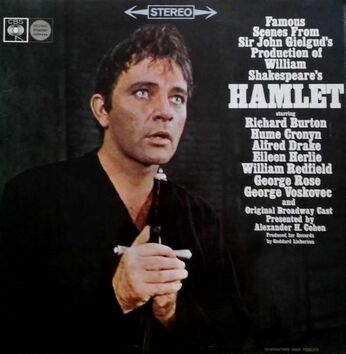
A copy of the original British vinyl album of 'Famous Scenes From Sir John Gielgud's Production Of William Shakespeare's 'Hamlet'.
This copy was released by CBS Records in 1964 and this copy is an original stereo edition, pressed with blue CBS labels and issued with the catalogue number SBRG 72259.
This is the original Broadway cast recording of 'Hamlet' and features, alongside Richard Burton in the title role, the talents of Alfred Drake, Hume Cronyn, George Rose, William Redfield, George Voskovec and Eileen Herlie.
The original Broadway production of the play was produced by Alexander H. Cohen, however this recording for vinyl album release was produced for CBS Records by Goddard Lieberson.
The back cover features notes written by Richard Burton and G.B. Harrison, the editor of 'Shakespeare:The Complete Works', published in 1948, as well as reviews of the Broadway run by The New York Post, New York Times, New York Herald Tribune and the New York Journal.
As published for inclusion in the cover notes, Richard Burton was to write of 'Hamlet';
"Someone once told me that the first Hamlet you see is the one that dominates the rest of your life. I've asked this of other people and apparently it is not true. In my case, however, it is. The first Hamlet I ever saw was in 1944 at Oxford. The actor was Gielgud. I was lucky. I saw - and see in my memory - the golden Renaissance Prince, witty, scholarly, and heart-breakingly melancholy. His was indeed so near a perfect performance that he nearly killed my ambition. Who could match him, I thought? Who could match him? It was Sir John himself who later on when I became friends with him persuaded me, by inference more than by direct statement, that every man is his own Hamlet, that Hamlet', (assuming there is the initial talent), is so massive that there is room for all."
The writer, G. B. Harrison, continues;
"Hamlet is in every way the most interesting play ever written. Apart from the fascination of Hamlet's character, it has a long and intricate history as a drama; the text is full of problems for the scholar; it teems with allusions for the antiquarian. For the last hundred and fifty years critics have competed in offering their key to the heart of Hamlet's mystery It is the final ambition of every actor to give the part his own interpretation, and even the doctors, especially the psychiatrists, have taken Hamlet into the laboratory and examined his inhibitions.
The story of Hamlet in some form is at least seven hundred years old...Shakespeare took this old story of blood and revenge and made it modern - that is, modern to his generation. For some reason it seems to have been his favourite play. when he wrote it, he was, with all thinking men of his age, in a period of profound disillusionment and pessimism, and he made it the vessel into which he poured his thoughts on all kinds of problems; on fathers and children, on sex, on drunkenness, on suicide, on mortality and corruption, on ingratitude and loyalty, on acting, on handwriting even, on fate, on man and their universe. There is more of Shakespeare himself in this play than in any of his others."
Sir John Gielgud's production of Hamlet opened on Broadway on April the 9th 1964. A few contemporary reviews, taken from leading and influential publications of the time, are also included in the cover notes;
"The fact to be stated at once is that Richard Burton is a very fine Hamlet indeed. His Prince of Denmark is forceful, direct, unpretentiously eloquent, more thoughtfully introspective than darkly melancholy, with a glint of ironic humour, and decidedly a man of action and feeling. And John Gielgud's production of Shakespeare's towering masterpiece is stirring and skillful, with Hume Cronyn presenting a memorable characterization of the blundering old Polonius." The New York Post.
"Richard Burton dominates the drama, as Hamlet should. For his is a performance of electrical power and sweeping virility." The New York Times.
"I believe you will come away from the Lunt - Fontanne Theatre with respect for Burton as a true professional and the conviction that he has brought to the role a certain vigour and compulsion which is rarely dispersed by the ethereal lads who have taken on the assignment in the past.
The illusion that all this is taking place on stage at a rehearsal has been very skilfully carried out. The cast is of course almost overwhelming; Hume Cronyn, particularly effective as Polonius; Alfred Drake a magnificently insidious Claudius; Eileen Herlie, buxom and beguiling as Queen Gertrude; and other expert contributions of William Redfield, George Rose and George Voskovec." The New York Journal - American.
"Richard Burton is one of the most magnificently equipped actors living, and in John Gielgud's rehearsal clothes production of Hamlet he places on open display, not only his own reverberating resources - a face that is illuminated in repose, a voice that seems to prove that sound spirals outward, an intelligence that bears wit when wit is trying to steal by tiptoe - but also all of the myriad qualities which the man Hamlet requires." The New York Herald Tribune.
This copy was released by CBS Records in 1964 and this copy is an original stereo edition, pressed with blue CBS labels and issued with the catalogue number SBRG 72259.
This is the original Broadway cast recording of 'Hamlet' and features, alongside Richard Burton in the title role, the talents of Alfred Drake, Hume Cronyn, George Rose, William Redfield, George Voskovec and Eileen Herlie.
The original Broadway production of the play was produced by Alexander H. Cohen, however this recording for vinyl album release was produced for CBS Records by Goddard Lieberson.
The back cover features notes written by Richard Burton and G.B. Harrison, the editor of 'Shakespeare:The Complete Works', published in 1948, as well as reviews of the Broadway run by The New York Post, New York Times, New York Herald Tribune and the New York Journal.
As published for inclusion in the cover notes, Richard Burton was to write of 'Hamlet';
"Someone once told me that the first Hamlet you see is the one that dominates the rest of your life. I've asked this of other people and apparently it is not true. In my case, however, it is. The first Hamlet I ever saw was in 1944 at Oxford. The actor was Gielgud. I was lucky. I saw - and see in my memory - the golden Renaissance Prince, witty, scholarly, and heart-breakingly melancholy. His was indeed so near a perfect performance that he nearly killed my ambition. Who could match him, I thought? Who could match him? It was Sir John himself who later on when I became friends with him persuaded me, by inference more than by direct statement, that every man is his own Hamlet, that Hamlet', (assuming there is the initial talent), is so massive that there is room for all."
The writer, G. B. Harrison, continues;
"Hamlet is in every way the most interesting play ever written. Apart from the fascination of Hamlet's character, it has a long and intricate history as a drama; the text is full of problems for the scholar; it teems with allusions for the antiquarian. For the last hundred and fifty years critics have competed in offering their key to the heart of Hamlet's mystery It is the final ambition of every actor to give the part his own interpretation, and even the doctors, especially the psychiatrists, have taken Hamlet into the laboratory and examined his inhibitions.
The story of Hamlet in some form is at least seven hundred years old...Shakespeare took this old story of blood and revenge and made it modern - that is, modern to his generation. For some reason it seems to have been his favourite play. when he wrote it, he was, with all thinking men of his age, in a period of profound disillusionment and pessimism, and he made it the vessel into which he poured his thoughts on all kinds of problems; on fathers and children, on sex, on drunkenness, on suicide, on mortality and corruption, on ingratitude and loyalty, on acting, on handwriting even, on fate, on man and their universe. There is more of Shakespeare himself in this play than in any of his others."
Sir John Gielgud's production of Hamlet opened on Broadway on April the 9th 1964. A few contemporary reviews, taken from leading and influential publications of the time, are also included in the cover notes;
"The fact to be stated at once is that Richard Burton is a very fine Hamlet indeed. His Prince of Denmark is forceful, direct, unpretentiously eloquent, more thoughtfully introspective than darkly melancholy, with a glint of ironic humour, and decidedly a man of action and feeling. And John Gielgud's production of Shakespeare's towering masterpiece is stirring and skillful, with Hume Cronyn presenting a memorable characterization of the blundering old Polonius." The New York Post.
"Richard Burton dominates the drama, as Hamlet should. For his is a performance of electrical power and sweeping virility." The New York Times.
"I believe you will come away from the Lunt - Fontanne Theatre with respect for Burton as a true professional and the conviction that he has brought to the role a certain vigour and compulsion which is rarely dispersed by the ethereal lads who have taken on the assignment in the past.
The illusion that all this is taking place on stage at a rehearsal has been very skilfully carried out. The cast is of course almost overwhelming; Hume Cronyn, particularly effective as Polonius; Alfred Drake a magnificently insidious Claudius; Eileen Herlie, buxom and beguiling as Queen Gertrude; and other expert contributions of William Redfield, George Rose and George Voskovec." The New York Journal - American.
"Richard Burton is one of the most magnificently equipped actors living, and in John Gielgud's rehearsal clothes production of Hamlet he places on open display, not only his own reverberating resources - a face that is illuminated in repose, a voice that seems to prove that sound spirals outward, an intelligence that bears wit when wit is trying to steal by tiptoe - but also all of the myriad qualities which the man Hamlet requires." The New York Herald Tribune.
The reverse cover of the original British release of 'Famous Scenes From Hamlet', and the original blue Stereo CBS record label.
'William Shakespeare's King Henry V'
Odhams Books Living Shakespeare Series, 1964
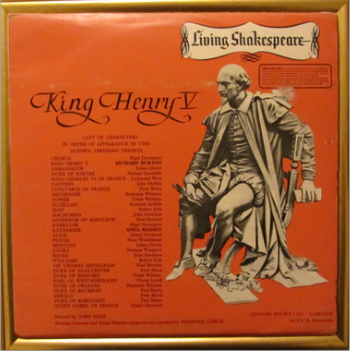
Released as part of a series of vinyl albums entitled, 'Living Shakespeare', this is an original 1964 copy of the production of William Shakespeare's 'King Henry V', which features a powerful performance from Richard Burton in the title role.
Appearing alongside Burton in this production were a distinguished cast of actors which included; Anna Massey, Julian Glover, Kenneth Griffith, Lockwood West, Frank Williams and Nigel Davenport.
This album was released by Odhams Books Limited, London, in association with F. C.M. Productions. The recording was directed by John Hale and features a musical accompaniment composed and recorded by Desmond Leslie.
This copy is the original stereo edition which was pressed with a maroon 'Living Shakespeare' record label and issued with the catalogue number DEOB 5AS.
This copy of the album is complete with the original booklet, containing the text for the 'Acting Version' of Henry V, and which also features extensive notes and a glossary. In his notes, reproduced in the booklet, the supervising editor of the text, Bernard Grebanier, writes of Richard Burton's performance in this version of Henry V;
"I am delighted with the 'Living Shakespeare' recording, Richard Burton provides an ideal performance of a role which calls for the greatest kind of variety on the part of the actor. He manages to sound all the tones from humbleness to anger, and from amusement to indignation. He makes of Henry the full-rounded character Shakespeare created. His Tennis Ball speech is full of scorn and threat for the lightheaded Dauphin of France. Before Harfleur he re-creates the military hero: his "Once more unto the breach" oration gives off all the excitement and desperation of the battlefield. The passage beginning "Thou dost thy office fairly" is rendered simply and manfully, and his "Upon the king! Let us our lives, our souls" is deeply moving. The celebrated St. Crispian's speech is heroic, virile, and spacious, and after the great victory he makes Henry's essential modesty plain."
Appearing alongside Burton in this production were a distinguished cast of actors which included; Anna Massey, Julian Glover, Kenneth Griffith, Lockwood West, Frank Williams and Nigel Davenport.
This album was released by Odhams Books Limited, London, in association with F. C.M. Productions. The recording was directed by John Hale and features a musical accompaniment composed and recorded by Desmond Leslie.
This copy is the original stereo edition which was pressed with a maroon 'Living Shakespeare' record label and issued with the catalogue number DEOB 5AS.
This copy of the album is complete with the original booklet, containing the text for the 'Acting Version' of Henry V, and which also features extensive notes and a glossary. In his notes, reproduced in the booklet, the supervising editor of the text, Bernard Grebanier, writes of Richard Burton's performance in this version of Henry V;
"I am delighted with the 'Living Shakespeare' recording, Richard Burton provides an ideal performance of a role which calls for the greatest kind of variety on the part of the actor. He manages to sound all the tones from humbleness to anger, and from amusement to indignation. He makes of Henry the full-rounded character Shakespeare created. His Tennis Ball speech is full of scorn and threat for the lightheaded Dauphin of France. Before Harfleur he re-creates the military hero: his "Once more unto the breach" oration gives off all the excitement and desperation of the battlefield. The passage beginning "Thou dost thy office fairly" is rendered simply and manfully, and his "Upon the king! Let us our lives, our souls" is deeply moving. The celebrated St. Crispian's speech is heroic, virile, and spacious, and after the great victory he makes Henry's essential modesty plain."
The booklet and Odhams Books Limited record label for the 1964 release of the 'Living Shakespeare - Henry V' vinyl album.
'Camelot' Original Broadway Cast (American Pressing)
Columbia Masterworks Records, 1960
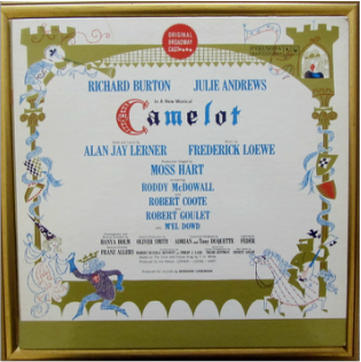
A copy of the original American vinyl pressing of the soundtrack album to 'Camelot', featuring Richard Burton and the original Broadway cast.
This edition was released by Columbia Masterworks Records and issued with the catalogue number KOL 5620.
This copy is the original mono edition which was pressed on grey and black Columbia labels.
This gate-fold sleeve edition features an extensive and detailed synopsis of the production written by Milton H. Greene, biographies of the main cast members and is lavishly illustrated with colour photographs from an original 1960 Broadway performance. A brief history of the musical is also included, which reads;
"Camelot is Broadway's newest legend. Glowing with melody, glittering with wit, fabulously beautiful, Camelot was written by Alan Jay Lerner and Frederick Loewe and stars Richard Burton and Julie Andrews at the head of a brilliantly distinguished cast.
Mr. Lerner and Mr. Loewe, creators of 'My Fair Lady' as well as 'Brigadoon', 'Paint Your Wagon' and the movie 'Gigi', have conjured up the enchanting world of King Arthur and his Court, basing their work on T. H. White's beautiful novel, 'The Once and Future King'.
Mr. Lerner's book weaves together two themes: Arthur's dream of a peaceable world where might serves right, and the ill-fated romance between Queen Guenevere and the young Lancelot. The lyrics which illuminate these themes convey all the romance, the gaiety and the majesty of Camelot.
Frederick Loewe's score is elegantly melodious, full of colourful rhythms and tender ballads. Avoiding the consciously archaic, Mr. Loewe has filled Camelot with graceful songs that help to establish its magical and stirring atmosphere.
Camelot marks the first theatrical venture for Mr. Lerner and Mr. Loewe since 'My Fair Lady', one of the greatest musicals of the century and the world's best-selling record album.
Heading the cast of Camelot are the magnificent English actor Richard Burton, making his musical debut as King Arthur, and the fair Julie Andrews as Queen Guenevere. Lancelot is played by Robert Goulet and the wicked Mordred by Roddy McDowell. Robert Coote appears as King Pellimore, and M'el Dowd is the gluttonous enchantress Morgan le Fey.
Along with Miss Andrews and Mr. Coote, Camelot reunites many of the artists who made 'My Fair Lady' so brilliant a success. Director Moss Hart, choreographer Hanya Holm, scenic designer Oliver Smith, musical arrangers Robert Russell Bennet, Philip J. Lang and Trude Rittman, lighting director Feder and musical director Franz Allers have joined their talents to make Camelot a sumptuous musical play. This recording was produced by Goddard Leiberson who directed the famous recorded performance of 'My Fair Lady'."
The original Broadway production was staged by Moss Hart and produced for Columbia Records by Goddard Lieberson.
The original cast of 'Camelot' included the talents of Julie Andrews, Robert Goulet and Roddy McDowell.
Richard Burton, in the role of King Arthur, performs the following songs on this album;
I Wonder What The King Is Doing Tonight / Camelot / How To Handle A Woman / What Do The Simple Folks Do? / Camelot (Reprise).
'Camelot' opened at the Majestic Theatre, Broadway in 1960 and ran for a total of 873 performances.
This edition was released by Columbia Masterworks Records and issued with the catalogue number KOL 5620.
This copy is the original mono edition which was pressed on grey and black Columbia labels.
This gate-fold sleeve edition features an extensive and detailed synopsis of the production written by Milton H. Greene, biographies of the main cast members and is lavishly illustrated with colour photographs from an original 1960 Broadway performance. A brief history of the musical is also included, which reads;
"Camelot is Broadway's newest legend. Glowing with melody, glittering with wit, fabulously beautiful, Camelot was written by Alan Jay Lerner and Frederick Loewe and stars Richard Burton and Julie Andrews at the head of a brilliantly distinguished cast.
Mr. Lerner and Mr. Loewe, creators of 'My Fair Lady' as well as 'Brigadoon', 'Paint Your Wagon' and the movie 'Gigi', have conjured up the enchanting world of King Arthur and his Court, basing their work on T. H. White's beautiful novel, 'The Once and Future King'.
Mr. Lerner's book weaves together two themes: Arthur's dream of a peaceable world where might serves right, and the ill-fated romance between Queen Guenevere and the young Lancelot. The lyrics which illuminate these themes convey all the romance, the gaiety and the majesty of Camelot.
Frederick Loewe's score is elegantly melodious, full of colourful rhythms and tender ballads. Avoiding the consciously archaic, Mr. Loewe has filled Camelot with graceful songs that help to establish its magical and stirring atmosphere.
Camelot marks the first theatrical venture for Mr. Lerner and Mr. Loewe since 'My Fair Lady', one of the greatest musicals of the century and the world's best-selling record album.
Heading the cast of Camelot are the magnificent English actor Richard Burton, making his musical debut as King Arthur, and the fair Julie Andrews as Queen Guenevere. Lancelot is played by Robert Goulet and the wicked Mordred by Roddy McDowell. Robert Coote appears as King Pellimore, and M'el Dowd is the gluttonous enchantress Morgan le Fey.
Along with Miss Andrews and Mr. Coote, Camelot reunites many of the artists who made 'My Fair Lady' so brilliant a success. Director Moss Hart, choreographer Hanya Holm, scenic designer Oliver Smith, musical arrangers Robert Russell Bennet, Philip J. Lang and Trude Rittman, lighting director Feder and musical director Franz Allers have joined their talents to make Camelot a sumptuous musical play. This recording was produced by Goddard Leiberson who directed the famous recorded performance of 'My Fair Lady'."
The original Broadway production was staged by Moss Hart and produced for Columbia Records by Goddard Lieberson.
The original cast of 'Camelot' included the talents of Julie Andrews, Robert Goulet and Roddy McDowell.
Richard Burton, in the role of King Arthur, performs the following songs on this album;
I Wonder What The King Is Doing Tonight / Camelot / How To Handle A Woman / What Do The Simple Folks Do? / Camelot (Reprise).
'Camelot' opened at the Majestic Theatre, Broadway in 1960 and ran for a total of 873 performances.
The reverse of the cover and the label of the original Columbia Masterworks pressing of the Broadway soundtrack album of 'Camelot'.
The gate-fold interior of the Columbia Masterworks pressing of 'Camelot' featuring many colour photographs from the original Broadway production. A further copy of 'Camelot' is held in the Richard Burton Museum collection, a British single sleeve edition incorporating this same design, released by CBS Records on an orange label and issued with the catalogue number SAPG 60004.
'Camelot' Original Broadway Cast (British Pressing)
CBS Records, 1960
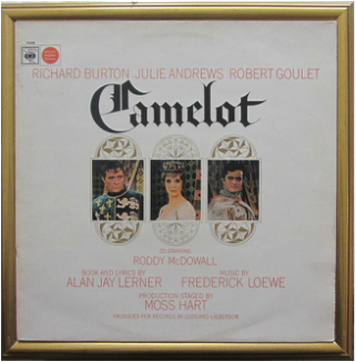
A copy of the original British pressing of the soundtrack album to the Broadway production of Lerner and Loewe's adaption of 'Camelot'.
This original vinyl album was released by CBS Records and issued with the catalogue number S BRC 70009.
This differently packaged single sleeve release features three colour portraits of the main stars of the Broadway production on the front cover, Richard Burton, Julie Andrews and Robert Goulet.
This British pressing was issued on blue CBS Records labels.
The complete track-listing for this album, and for the above release of 'Camelot' ia as follows; Overture / I Wonder What The King Is Doing Tonight / The Simple Joys Of Maidenhood / Camelot / Follow Me / The Lusty Month Of May / C'Est Moi / Then You May Take Me To The Fair / How To Handle A Woman / If Ever I Would Leave You / Parade / Before I Gaze At You Again / The Seven Deadly Virtues / What Do The Simple Folk Do? / Fie On Goodness / I Loved You Once In Silence / Guenevere / Camelot (Reprise).
This original vinyl album was released by CBS Records and issued with the catalogue number S BRC 70009.
This differently packaged single sleeve release features three colour portraits of the main stars of the Broadway production on the front cover, Richard Burton, Julie Andrews and Robert Goulet.
This British pressing was issued on blue CBS Records labels.
The complete track-listing for this album, and for the above release of 'Camelot' ia as follows; Overture / I Wonder What The King Is Doing Tonight / The Simple Joys Of Maidenhood / Camelot / Follow Me / The Lusty Month Of May / C'Est Moi / Then You May Take Me To The Fair / How To Handle A Woman / If Ever I Would Leave You / Parade / Before I Gaze At You Again / The Seven Deadly Virtues / What Do The Simple Folk Do? / Fie On Goodness / I Loved You Once In Silence / Guenevere / Camelot (Reprise).
The reverse cover of the British pressing of 'Camelot' and the original blue CBS label, issued with the catalogue number S BRC 70009.
'A Married Man' Baker Street Preview Flexi-Disc,1965
'Baker Street' was a Broadway musical, loosely based on Arthur Conan Doyle's Sherlock Holmes novel, 'A Scandal In Bohemia'.
Produced by Alexander H. Cohen, the musical opened in February 1965 at The Broadway Theatre, New York, before moving on to The Martin Beck Theatre, also in New York, where it closed shortly afterwards. The 1965 production of 'Baker Street' ran for a total of 311 performances.
This unusual preview disc was presented by 'Show' in March 1965 and consists of a one-sided 'flexi-disc' on a card background featuring Richard Burton singing a charming rendition of Dr Watson's 'Ode To a Married Man'.
The only reason I can surmise that the producers of the show chose Richard Burton to promote the musical with a recording of this song is because Burton himself had recently become the world's most famous 'Married Man'.
The music and lyrics for the musical 'Baker Street' were written by Marian Grudeff and Raymond Jessel.
The linear notes which appear on the reverse of this disc read rather peculiarly, especially in their description of Burton;
"Richard Burton, Wales' gifted but perverse Golden Boy who gave up a promising career as a rugby star for the world of entertainment, demonstrates on this disc that his magical voice can do more than classic soliloquys. This song is one of the best in Baker Street, Alexander H. Cohen's production that stars Fritz 'Sherlock' Weaver, Inga Swenson and Martin Gabel in Jerome Coopersmith's version of the Holmes - Moriarty duel. The tuneful detective story is based on three of Sir Arthur Conan Doyle's great yarns."
Produced by Alexander H. Cohen, the musical opened in February 1965 at The Broadway Theatre, New York, before moving on to The Martin Beck Theatre, also in New York, where it closed shortly afterwards. The 1965 production of 'Baker Street' ran for a total of 311 performances.
This unusual preview disc was presented by 'Show' in March 1965 and consists of a one-sided 'flexi-disc' on a card background featuring Richard Burton singing a charming rendition of Dr Watson's 'Ode To a Married Man'.
The only reason I can surmise that the producers of the show chose Richard Burton to promote the musical with a recording of this song is because Burton himself had recently become the world's most famous 'Married Man'.
The music and lyrics for the musical 'Baker Street' were written by Marian Grudeff and Raymond Jessel.
The linear notes which appear on the reverse of this disc read rather peculiarly, especially in their description of Burton;
"Richard Burton, Wales' gifted but perverse Golden Boy who gave up a promising career as a rugby star for the world of entertainment, demonstrates on this disc that his magical voice can do more than classic soliloquys. This song is one of the best in Baker Street, Alexander H. Cohen's production that stars Fritz 'Sherlock' Weaver, Inga Swenson and Martin Gabel in Jerome Coopersmith's version of the Holmes - Moriarty duel. The tuneful detective story is based on three of Sir Arthur Conan Doyle's great yarns."
'The Tragical History Of Dr. Faustus'
Oxford University Dramatic Society Production
His Master's Voice / EMI Records, 1966
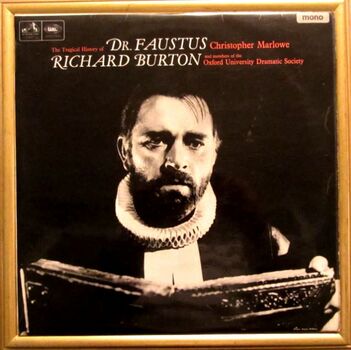
An original copy of the mono pressing of 'The Tragical History of Dr. Faustus' by Christopher Marlowe, which features Richard Burton appearing alongside members of the Oxford University Dramatic Society.
This copy was released on the 'His Masters Voice' record label, a division of E.M.I. Records, based at that time in Hayes, Middlesex. This original vinyl release was issued with the catalogue number ALP 2270.
Richard Burton appeared alongside members of the O.U.D's, which included members from the colleges of Lincoln, Merton, Jesus, Christ Church, Exeter, Magdalen, St. John's and Keble amongst others. The text was edited and supervised by Professor Nevill Coghill and the production for the recording was directed by Denis Comper.
The musical score for the production was composed and orchestrated by Kenneth Victor Jones.
The recording of this production of Dr Faustus was made during February of 1966 and was performed to raise money in aid of the Oxford University Theatre Appeal Fund.
The cover notes for this outstanding recording, written by Professor Nevill Coghill, read;
"The recorded performance from Dr. Faustus by Christopher Marlowe is based on the Quarto version of 1604, which is the earliest surviving text of the play, with some readings and additions from the Quarto of 1616, which is the earliest surviving text of the longer version. Most scholars believe the original play to be written in 1592, or not long before, and that the 1604 version represents a text cut for acting by a Company of smaller cast for use on provincial tour. it is recorded in the diary of Philip Henslowe, the great Elizabethan theatrical manager, that he paid the sum of four pounds to ''Wm Byrde and Samwell Rowle for their adicyones in Doctor Fostes''.on the 22nd of November 1602, and these additions first found their way into print in the edition of 1616, the Quarto of 1604, being thought to be a reprint of an earlier edition of which no copy has survived.
In either version the play is a tragical poem designed for the stage: mixed into it are scenes of comedy, farce and pantomime, that make an alternating rhythm with the tragical parts, an alternation of knockabout, poetry and terror. The comic scenes have not been included in this recording, which only gives the central tragic core of high poetry and rhetoric that lend its thrilling beauty to the fate of Faustus.
His story is that of a man who sold his soul to the Devil in exchange for knowledge and power, and to satisfy his hunger for adventures in the Universe forbidden to him by the metaphysics of his Age; his sin, like Adam's, is disobedience, but the pranks it leads him to play seem harmless enough. We hear of his journeys into outer space, of his search for strange philosophies, and how he made blind Homer sing for him. Among these nobler aspirations of his are mixed political ambitions and other more puerile fantasies: he is led by this element of levity in his character into playing practical jokes on the Pope and doing conjuring tricks for the Emperor and others less exalted. He becomes the victim of these childish indulgences and of his delight in showing-off, a tendency in him which is adroitly exploited by Mephistophilis, who from the beginning deceives and blinds him with illusions, distracts him with spectacular visions and gaudy toys, and intimidates him with sudden terrors, to keep his thoughts from God and the open door of repentance. Faustus vacillates between his impulses, and one renunciation is instantly followed by another: Hell steadily gains in the battle for his soul as he wastes his dearly-bought knowledge on badinage and tricks. His last use of his magical power is is to summon the figure of Helen Of Troy, the most beautiful woman in History, to be his paramour; and after that he esteems himself lost: for though he feels remorse, he has lost the capacity for repentance,. Despair has mastered him and he can no longer leap up to God, even though he would. The hour strikes and it is too late. The Renaissance man has to pay the medieval price for being one, in all its rigour. It is a parable for our own times when powers greater than those ever imagined by Dr. Faustus or his Creator have been put into our hands by scientific discovery. How are they to be used?
The present recording has been made by Richard Burton and the Oxford University Dramatic Society. The play was presented at the Oxford University Theatre in February 1966, directed by Nevill Coghill in aid of the Oxford University Theatre Appeal Fund.
The text for this recording was edited and supervised by Professor Nevill Coghill, Merton Professor of English.
This copy was released on the 'His Masters Voice' record label, a division of E.M.I. Records, based at that time in Hayes, Middlesex. This original vinyl release was issued with the catalogue number ALP 2270.
Richard Burton appeared alongside members of the O.U.D's, which included members from the colleges of Lincoln, Merton, Jesus, Christ Church, Exeter, Magdalen, St. John's and Keble amongst others. The text was edited and supervised by Professor Nevill Coghill and the production for the recording was directed by Denis Comper.
The musical score for the production was composed and orchestrated by Kenneth Victor Jones.
The recording of this production of Dr Faustus was made during February of 1966 and was performed to raise money in aid of the Oxford University Theatre Appeal Fund.
The cover notes for this outstanding recording, written by Professor Nevill Coghill, read;
"The recorded performance from Dr. Faustus by Christopher Marlowe is based on the Quarto version of 1604, which is the earliest surviving text of the play, with some readings and additions from the Quarto of 1616, which is the earliest surviving text of the longer version. Most scholars believe the original play to be written in 1592, or not long before, and that the 1604 version represents a text cut for acting by a Company of smaller cast for use on provincial tour. it is recorded in the diary of Philip Henslowe, the great Elizabethan theatrical manager, that he paid the sum of four pounds to ''Wm Byrde and Samwell Rowle for their adicyones in Doctor Fostes''.on the 22nd of November 1602, and these additions first found their way into print in the edition of 1616, the Quarto of 1604, being thought to be a reprint of an earlier edition of which no copy has survived.
In either version the play is a tragical poem designed for the stage: mixed into it are scenes of comedy, farce and pantomime, that make an alternating rhythm with the tragical parts, an alternation of knockabout, poetry and terror. The comic scenes have not been included in this recording, which only gives the central tragic core of high poetry and rhetoric that lend its thrilling beauty to the fate of Faustus.
His story is that of a man who sold his soul to the Devil in exchange for knowledge and power, and to satisfy his hunger for adventures in the Universe forbidden to him by the metaphysics of his Age; his sin, like Adam's, is disobedience, but the pranks it leads him to play seem harmless enough. We hear of his journeys into outer space, of his search for strange philosophies, and how he made blind Homer sing for him. Among these nobler aspirations of his are mixed political ambitions and other more puerile fantasies: he is led by this element of levity in his character into playing practical jokes on the Pope and doing conjuring tricks for the Emperor and others less exalted. He becomes the victim of these childish indulgences and of his delight in showing-off, a tendency in him which is adroitly exploited by Mephistophilis, who from the beginning deceives and blinds him with illusions, distracts him with spectacular visions and gaudy toys, and intimidates him with sudden terrors, to keep his thoughts from God and the open door of repentance. Faustus vacillates between his impulses, and one renunciation is instantly followed by another: Hell steadily gains in the battle for his soul as he wastes his dearly-bought knowledge on badinage and tricks. His last use of his magical power is is to summon the figure of Helen Of Troy, the most beautiful woman in History, to be his paramour; and after that he esteems himself lost: for though he feels remorse, he has lost the capacity for repentance,. Despair has mastered him and he can no longer leap up to God, even though he would. The hour strikes and it is too late. The Renaissance man has to pay the medieval price for being one, in all its rigour. It is a parable for our own times when powers greater than those ever imagined by Dr. Faustus or his Creator have been put into our hands by scientific discovery. How are they to be used?
The present recording has been made by Richard Burton and the Oxford University Dramatic Society. The play was presented at the Oxford University Theatre in February 1966, directed by Nevill Coghill in aid of the Oxford University Theatre Appeal Fund.
The text for this recording was edited and supervised by Professor Nevill Coghill, Merton Professor of English.
The reverse of the original sleeve of the 1966 pressing of Neviill Coghill's adaption of 'Dr. Faustus' and the original 'His Master's Voice' record label.
Jeff Wayne's Musical Version of 'The War Of The Worlds'
CBS Records (Dutch Pressing), 1978
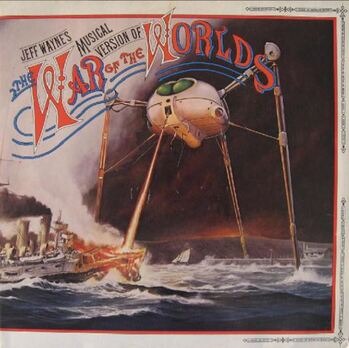
A copy of an original Dutch vinyl pressing of the 1978 'Concept Album' entitled 'Jeff Wayne's Musical Version Of The War Of The Worlds'.
The production was inspired by the science fiction novel of the same name which was written by H.G.Wells, and this double album features Richard Burton, as the main narrator, in the role of the journalist under the direction of Charles Dubin and Jerry Wayne.
The recording also features the vocal talents of David Essex, Julie Covington, Phil Lynott and Justin Hayward.
The chapters included on this recording include the tracks;
The Coming Of The Martians / The Eve Of The War / Horsell Common And The Heat Ray / The Artillery Man And Fighting Machine / The Earth Under The Martians / The Red Weed And Parson Nathaniel / The Artillery Man And Dead London / Dead London / Epilogue.
This original Dutch pressing was released by CBS records in 1978 and was issued with the catalogue number CBS 96000 and was pressed on orange and yellow CBS labels. The album is presented in a gate-fold sleeve with a deluxe eight page booklet, illustrated throughout with paintings by artists Peter Goodfellow, Geoff Taylor and Michael Trinn.
The production was inspired by the science fiction novel of the same name which was written by H.G.Wells, and this double album features Richard Burton, as the main narrator, in the role of the journalist under the direction of Charles Dubin and Jerry Wayne.
The recording also features the vocal talents of David Essex, Julie Covington, Phil Lynott and Justin Hayward.
The chapters included on this recording include the tracks;
The Coming Of The Martians / The Eve Of The War / Horsell Common And The Heat Ray / The Artillery Man And Fighting Machine / The Earth Under The Martians / The Red Weed And Parson Nathaniel / The Artillery Man And Dead London / Dead London / Epilogue.
This original Dutch pressing was released by CBS records in 1978 and was issued with the catalogue number CBS 96000 and was pressed on orange and yellow CBS labels. The album is presented in a gate-fold sleeve with a deluxe eight page booklet, illustrated throughout with paintings by artists Peter Goodfellow, Geoff Taylor and Michael Trinn.
The rear of the booklet which was issued with the early pressings of 'The War Of The Worlds' which features mini-biographies of the main stars and the original CBS label for this Dutch pressing of the double album.
Some images of the stunning artwork which feature on the cover and the accompanying booklet of the original 1978 release of 'Jeff Wayne's Musical Version of War Of The Worlds'.
Jeff Wayne's Musical Version of 'The War Of The Worlds'
Original U.K. Pressing CBS Records, 1978
A further copy of the double vinyl concept album, 'Jeff Wayne's Musical Version of The War of the Worlds'. This edition is the original U.K. pressing issued on the CBS record label, catalogue number S-CBS 82671.
As with the Dutch pressing featured above, the album was released in a stunning gate-fold sleeve as is complete with the original booklet.
As with the Dutch pressing featured above, the album was released in a stunning gate-fold sleeve as is complete with the original booklet.
A Selection Of Richard Burton Film Soundtrack Vinyl Albums
'Cleopatra' Original Soundtrack Album
Twentieth Century Fox Records, 1963
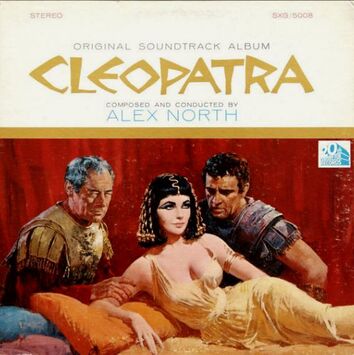
A copy of the original American vinyl pressing of the soundtrack album to the Twentieth Century Fox production of the epic film, 'Cleopatra'.
The soundtrack music for the album was composed and conducted by Alex North, with orchestrations composed by David Tamkin and Henry Brant.
The soundtrack music was published by the Robbins Music Corporation under the associate directorship of Lionel Newman.
The complete tracklisting for the album is as follows;
Caesar And Cleopatra / A Gift For Caesar / The Fire Burns, The Fire Burns / Taste Of Death / Cleopatra Enters Rome / Caesars Assassination / Epilogue (Act One) / Anthony And Cleopatra / Cleopatra's Barge / Love And Hate / My Love Is My Master / Grant Me An Honorable Way To Die! / Dying Is Less Than Love / "Anthony - Wait...!".
This original American vinyl pressing was released by Twentieth Century Fox Records and issued with the catalogue number SXG / 5008. This copy is the original stereo edition which was issued on a Twentieth Century Fox gold label. The interior of the stunning gate-fold sleeve contains linear notes detailing the scenes to which each musical piece relates to, written by the director of 'Cleopatra', Joseph L. Mankiewicz.
The soundtrack music for the album was composed and conducted by Alex North, with orchestrations composed by David Tamkin and Henry Brant.
The soundtrack music was published by the Robbins Music Corporation under the associate directorship of Lionel Newman.
The complete tracklisting for the album is as follows;
Caesar And Cleopatra / A Gift For Caesar / The Fire Burns, The Fire Burns / Taste Of Death / Cleopatra Enters Rome / Caesars Assassination / Epilogue (Act One) / Anthony And Cleopatra / Cleopatra's Barge / Love And Hate / My Love Is My Master / Grant Me An Honorable Way To Die! / Dying Is Less Than Love / "Anthony - Wait...!".
This original American vinyl pressing was released by Twentieth Century Fox Records and issued with the catalogue number SXG / 5008. This copy is the original stereo edition which was issued on a Twentieth Century Fox gold label. The interior of the stunning gate-fold sleeve contains linear notes detailing the scenes to which each musical piece relates to, written by the director of 'Cleopatra', Joseph L. Mankiewicz.
The reverse of the American gate-fold cover and the gold Twentieth Century Fox record label for the original soundtrack album of 'Cleopatra'.
'The V.I.P.s' Original Metro-Goldwyn-Mayer Soundtrack
Metro-Goldwyn-Mayer Records, 1963
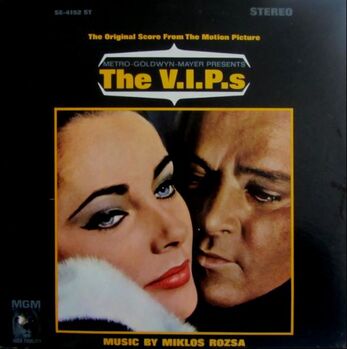
An original American vinyl copy of the American pressing of the musical soundtrack to the Metro-Goldwyn-Mayer 1963 Richard Burton and ElizabethTaylor film, 'The V.I.P.s'.
This copy was released by Metro-Goldwyn-Mayer High Fidelity Records in 1963.
This is the stereo edition, issued with the catalogue number E / SE 4152 ST which was pressed on black Metro-Goldwyn-Mayer labels.
The music for the film was composed by Miklos Rozsa, (who was previously best known for his musical scores for the classic films, Ben Hur, King Of Kings and El Cid), and the soundtrack was performed for this recording by The Rome Symphony Orchestra.
The tracklisting of orchestrations for the album are;
Prelude / The Duchess Of Brighton / The Bracelet / Conflict / Mood For Truth / Adorable Invitation / The Letter / Consolation / Daffodils / Emotional Cost / Question Of Pride / Suicide Threat / Finale.
The detailed notes and orchestral synopsis which appear on the reverse of the cover were written by the composer Miklos Rozsa. A short synopsis for the film, also written by Miklos Rozsa, reads;
"The last four pictures for which I composed music before the 'V.I.P's' were all Biblical or historical ('Ben Hur', 'King of Kings', 'El Cid' and 'Sodom and Gomorrah'.) therefore, their musical style had to be archaic. As the 'V.I.P's' is a contemporary drama, it needed, of course, a different musical treatment.
It is a set of parallel stories of different people, all assembled in the V.I.P. lounge of the fogbound London airport, waiting to take off toward New York. we meet, (in order of appearance), Max Buda (Orson Welles) film producer and director, who has to leave England in a hurry to avoid British taxes, with his protogee and star Gloria Gritti (Elsa Martinelli). Paul Andros (Richard Burton) an industrial tycoon, who accompanies his wife Frances, (Elizabeth Taylor) who is supposed to fly off for a short Jamaican vacation, in reality she is eloping with Marc Champselle, (Louis Jourdan), a French gigolo. The impoverished Duchess of Brighton (Margaret Rutherford) is flying to Miami Beach, to become Assistant Social Manageress in a hotel. And Les Mangram (Rod Taylor) chairman of a small tractor manufacturing company, who has to get to New York for an important board meeting and who is accompanied by his efficient and devoted secretary, Miss Mead (Maggie Smith). The plane, however, is grounded owing to the London fog which enters the lives of these people, and we watch their individual stories unfold until the fog lifts and a take-off is possible."
The original film was based on a screenplay written by Terence Rattigan, was directed by Anthony Asquith and produced by Anatole de Grunwald.
This copy was released by Metro-Goldwyn-Mayer High Fidelity Records in 1963.
This is the stereo edition, issued with the catalogue number E / SE 4152 ST which was pressed on black Metro-Goldwyn-Mayer labels.
The music for the film was composed by Miklos Rozsa, (who was previously best known for his musical scores for the classic films, Ben Hur, King Of Kings and El Cid), and the soundtrack was performed for this recording by The Rome Symphony Orchestra.
The tracklisting of orchestrations for the album are;
Prelude / The Duchess Of Brighton / The Bracelet / Conflict / Mood For Truth / Adorable Invitation / The Letter / Consolation / Daffodils / Emotional Cost / Question Of Pride / Suicide Threat / Finale.
The detailed notes and orchestral synopsis which appear on the reverse of the cover were written by the composer Miklos Rozsa. A short synopsis for the film, also written by Miklos Rozsa, reads;
"The last four pictures for which I composed music before the 'V.I.P's' were all Biblical or historical ('Ben Hur', 'King of Kings', 'El Cid' and 'Sodom and Gomorrah'.) therefore, their musical style had to be archaic. As the 'V.I.P's' is a contemporary drama, it needed, of course, a different musical treatment.
It is a set of parallel stories of different people, all assembled in the V.I.P. lounge of the fogbound London airport, waiting to take off toward New York. we meet, (in order of appearance), Max Buda (Orson Welles) film producer and director, who has to leave England in a hurry to avoid British taxes, with his protogee and star Gloria Gritti (Elsa Martinelli). Paul Andros (Richard Burton) an industrial tycoon, who accompanies his wife Frances, (Elizabeth Taylor) who is supposed to fly off for a short Jamaican vacation, in reality she is eloping with Marc Champselle, (Louis Jourdan), a French gigolo. The impoverished Duchess of Brighton (Margaret Rutherford) is flying to Miami Beach, to become Assistant Social Manageress in a hotel. And Les Mangram (Rod Taylor) chairman of a small tractor manufacturing company, who has to get to New York for an important board meeting and who is accompanied by his efficient and devoted secretary, Miss Mead (Maggie Smith). The plane, however, is grounded owing to the London fog which enters the lives of these people, and we watch their individual stories unfold until the fog lifts and a take-off is possible."
The original film was based on a screenplay written by Terence Rattigan, was directed by Anthony Asquith and produced by Anatole de Grunwald.
The reverse of the cover and original M.G.M. record label to the Mikos Rozes soundtrack album for the Burton / Taylor 1963 film,'The V.I.P.s'.
'Becket' Original Soundtrack Music Album
Decca Records (American Sample Copy), 1964
A pre-release 'Sample Copy' of the original vinyl album, 'Original Soundtrack Music From The Paramount Motion Picture Becket'.
This copy of the album is the American pressing released by Decca Records in 1964 with the catalogue number DL 79117.
The music for the film was composed by Laurence Rosenthal and was conducted by Muir Mathieson.
The track-listing for this release is as follows;
Main Title - King Henry's Arrival at Canterbury Cathedral / Days of Youth / The Hunt / Gwendolen / Triumph in France / Consecration at Canterbury / Trial and Escape to the Court of King Louis / The Meeting on the Beach / Becket's Martyrdom / End Title.
This is the stereo version of the album and features a cover portrait of Richard Burton in the role of Thomas Becket and Peter O'Toole as his King.
The extensive cover notes on the reverse of the album cover include a brief synopsis of the music, which reads;
'In composing his superb score for 'Becket', Laurence Rosenthal did not attempt a literal re-creation of 12th Century music, although he did use authentic Gregorian chant, and melodies in the Gregorian style, for the scenes in the Cathedral at Canterbury. He also made use of several old Welsh folk melodies.
Taking the plot of 'Becket' as his guide, Mr. Rosenthal has employed his music to heighten the emotional impact of the dramatic story of Thomas Becket and his King. the bright, boisterous music of 'The Hunt' and 'Days of Youth' contrasts sharply with the solemn scene of the 'Consecration at Canterbury', in which a chorus of monks intones the ancient chants; the martial music pf the 'Triumph in France' scene is a brilliant contrast to the spine-tingling scene of 'Becket's Martyrdom', with its juxtaposition of the sinister purpose of the murderous barons and the hallowed setting of Canterbury Cathedral; and the quiet lyricism of the theme of 'Gwendolen' is in direct apposition to the dramatic music of the 'Meeting on the Beach'.
For each scene of 'Becket', Laurence Rosenthal has created a musical background which adds immeasurably to the dramatic power of this stirring film. He has, moreover, composed a score which stands on its own as an integrated musical work - one which you will enjoy hearing again and again after you have seen Hal Wallis's Paramount production of 'Becket"
This copy of the album is the American pressing released by Decca Records in 1964 with the catalogue number DL 79117.
The music for the film was composed by Laurence Rosenthal and was conducted by Muir Mathieson.
The track-listing for this release is as follows;
Main Title - King Henry's Arrival at Canterbury Cathedral / Days of Youth / The Hunt / Gwendolen / Triumph in France / Consecration at Canterbury / Trial and Escape to the Court of King Louis / The Meeting on the Beach / Becket's Martyrdom / End Title.
This is the stereo version of the album and features a cover portrait of Richard Burton in the role of Thomas Becket and Peter O'Toole as his King.
The extensive cover notes on the reverse of the album cover include a brief synopsis of the music, which reads;
'In composing his superb score for 'Becket', Laurence Rosenthal did not attempt a literal re-creation of 12th Century music, although he did use authentic Gregorian chant, and melodies in the Gregorian style, for the scenes in the Cathedral at Canterbury. He also made use of several old Welsh folk melodies.
Taking the plot of 'Becket' as his guide, Mr. Rosenthal has employed his music to heighten the emotional impact of the dramatic story of Thomas Becket and his King. the bright, boisterous music of 'The Hunt' and 'Days of Youth' contrasts sharply with the solemn scene of the 'Consecration at Canterbury', in which a chorus of monks intones the ancient chants; the martial music pf the 'Triumph in France' scene is a brilliant contrast to the spine-tingling scene of 'Becket's Martyrdom', with its juxtaposition of the sinister purpose of the murderous barons and the hallowed setting of Canterbury Cathedral; and the quiet lyricism of the theme of 'Gwendolen' is in direct apposition to the dramatic music of the 'Meeting on the Beach'.
For each scene of 'Becket', Laurence Rosenthal has created a musical background which adds immeasurably to the dramatic power of this stirring film. He has, moreover, composed a score which stands on its own as an integrated musical work - one which you will enjoy hearing again and again after you have seen Hal Wallis's Paramount production of 'Becket"
'The Night Of The Iguana' Original Soundtrack Album
Metro-Goldwyn-Mayer Records, 1964
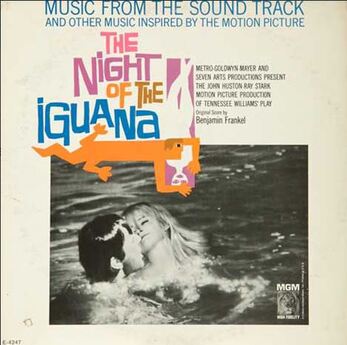
A copy of the original American pressing of the soundtrack music for the Metro-Goldwyn-Mayer film adaption of the Tennessee Williams play, 'The Night Of The Iguana', which was released by Metro-Goldwyn-Mayer Records in 1964.
This is the original American mono edition which was released on black Metro-Goldwyn-Mayer labels and issued with the catalogue number E/SE-4247.
The original 'The Night Of The Iguana' score was composed by Benjamin Frankel and produced for this vinyl album by Danny Davis.
The orchestrations which appear on this soundtrack album are entitled;
The Night Of The Iguana Theme / The Washer Women Of Mexico / Hannah And Shannon Theme / Shannon's Long Swim and Maxine And Shannon Theme.
The additional music included on this album was inspired by the 1964 film version of 'The Night Of The Iguana', and was performed by Los Tres Guaramex.
The extensive cover notes, which appear on this original American pressing, read;
"The Night Of The Iguana is one of the most highly anticipated motion pictures of 1964. The film and its all star cast, which includes Richard Burton, Ava Gardner, Deborah Kerr and Sue Lyon have caused a furor of interest that makes the sound track music from the picture a prize collector's item for all movie goers. The picture and the publicity that surrounded its filming in Puerto Vallarta and Mismayloya in Mexico make it 'must-see' viewing for millions.
This album of the music from the picture will remain a perpetual memento for those who thrilled to the movie. Besides the original sound track music composed by Benjamin Frankel, the album also contains a special musical bonus: authentic music from Mexico which neatly dovetails into the feeling of the film and provides a colourful change of pace to the emotion-laden music from the historic motion picture.
'The Night Of the Iguana', based on the play by Tennessee Williams with a screenplay by Anthony Veiller and John Huston, is a poignant film that crackles with the high tension of passionate people in head-on conflict. This John Huston - Ray Stark production for Metro-Goldwyn-Mayer and Seven Arts, burns at fever pitch. The Benjamin Frankel music underlines and embellishes the plot as it moves along and the high points from the film are musically mirrored in the tracks included here.
The plot of 'The Night Of The Iguana' is concerned with the mental and emotional anguish of the Reverend T. Lawrence Shannon (Richard Burton). 'The Night Of The Iguana Theme' underlines a good deal of the plot action of the picture but never is its impact more devastatingly felt than in the opening sequence in which Shannon is locked out of his small Virginia church by his own congregation after delivering a particularly scathing sermon. He berates them for their hypocrisy and thoughtlessness.
'The Washer Women Of Mexico' underlines a new mood in the film which is in direct contrast to the stormy opening. It provides the colour of a new setting. Shannon has come to Mexico to be a tourist guide for a group of American school teachers. When his charms unintentionally set afire a young girl, Charlotte Goodall (Sue Lyon) travelling with the group, he is put in direct contact with the leader of the teacher-tourists, Judith Fellowes (Grayson Hall).
To avoid being fired, Shannon shanghies all of the American tourists to a small, remote and crumbling hotel in Mismayloya, Mexico run by Maxine Faulk (Ava Gardner). It is in this hotel that Shannon goes through the hellish nightmare of his own failure.
In feverish despair he attempts suicide. This is dramatized in this album by 'Shannon's Long Swim'. Shannon's relationships with, and the character of, the two women with whom he has deep and moving scenes round out the soundtrack selections.
The 'Hannah and Shannon Theme' is the background music behind one of the most telling scenes in the picture. The music is keyed to the solace and comfort of deep understanding Hannah Jelkes (Deborah Kerr), another guest of the hotel, gives to Shannon who is mad with the fever of his own frustration.
The 'Maxine and Shannon Theme' is keyed to the sensuousness and yet deep love of the beautiful hotel keeper. Both women, although in direct contrast to one another, are willing to make the kind of sacrifice that only true love can dictate. This quality of selflessness is exceedingly evident in the film.
'The Night Of The Iguana' is a powerful motion picture. Besides the drama of women in battle and in love with one man, it also explores the depths of that man's tortured soul. The music from the film is a constant reminder of the film's unique eloquence and tense drama."
This is the original American mono edition which was released on black Metro-Goldwyn-Mayer labels and issued with the catalogue number E/SE-4247.
The original 'The Night Of The Iguana' score was composed by Benjamin Frankel and produced for this vinyl album by Danny Davis.
The orchestrations which appear on this soundtrack album are entitled;
The Night Of The Iguana Theme / The Washer Women Of Mexico / Hannah And Shannon Theme / Shannon's Long Swim and Maxine And Shannon Theme.
The additional music included on this album was inspired by the 1964 film version of 'The Night Of The Iguana', and was performed by Los Tres Guaramex.
The extensive cover notes, which appear on this original American pressing, read;
"The Night Of The Iguana is one of the most highly anticipated motion pictures of 1964. The film and its all star cast, which includes Richard Burton, Ava Gardner, Deborah Kerr and Sue Lyon have caused a furor of interest that makes the sound track music from the picture a prize collector's item for all movie goers. The picture and the publicity that surrounded its filming in Puerto Vallarta and Mismayloya in Mexico make it 'must-see' viewing for millions.
This album of the music from the picture will remain a perpetual memento for those who thrilled to the movie. Besides the original sound track music composed by Benjamin Frankel, the album also contains a special musical bonus: authentic music from Mexico which neatly dovetails into the feeling of the film and provides a colourful change of pace to the emotion-laden music from the historic motion picture.
'The Night Of the Iguana', based on the play by Tennessee Williams with a screenplay by Anthony Veiller and John Huston, is a poignant film that crackles with the high tension of passionate people in head-on conflict. This John Huston - Ray Stark production for Metro-Goldwyn-Mayer and Seven Arts, burns at fever pitch. The Benjamin Frankel music underlines and embellishes the plot as it moves along and the high points from the film are musically mirrored in the tracks included here.
The plot of 'The Night Of The Iguana' is concerned with the mental and emotional anguish of the Reverend T. Lawrence Shannon (Richard Burton). 'The Night Of The Iguana Theme' underlines a good deal of the plot action of the picture but never is its impact more devastatingly felt than in the opening sequence in which Shannon is locked out of his small Virginia church by his own congregation after delivering a particularly scathing sermon. He berates them for their hypocrisy and thoughtlessness.
'The Washer Women Of Mexico' underlines a new mood in the film which is in direct contrast to the stormy opening. It provides the colour of a new setting. Shannon has come to Mexico to be a tourist guide for a group of American school teachers. When his charms unintentionally set afire a young girl, Charlotte Goodall (Sue Lyon) travelling with the group, he is put in direct contact with the leader of the teacher-tourists, Judith Fellowes (Grayson Hall).
To avoid being fired, Shannon shanghies all of the American tourists to a small, remote and crumbling hotel in Mismayloya, Mexico run by Maxine Faulk (Ava Gardner). It is in this hotel that Shannon goes through the hellish nightmare of his own failure.
In feverish despair he attempts suicide. This is dramatized in this album by 'Shannon's Long Swim'. Shannon's relationships with, and the character of, the two women with whom he has deep and moving scenes round out the soundtrack selections.
The 'Hannah and Shannon Theme' is the background music behind one of the most telling scenes in the picture. The music is keyed to the solace and comfort of deep understanding Hannah Jelkes (Deborah Kerr), another guest of the hotel, gives to Shannon who is mad with the fever of his own frustration.
The 'Maxine and Shannon Theme' is keyed to the sensuousness and yet deep love of the beautiful hotel keeper. Both women, although in direct contrast to one another, are willing to make the kind of sacrifice that only true love can dictate. This quality of selflessness is exceedingly evident in the film.
'The Night Of The Iguana' is a powerful motion picture. Besides the drama of women in battle and in love with one man, it also explores the depths of that man's tortured soul. The music from the film is a constant reminder of the film's unique eloquence and tense drama."
The reverse to the original Metro-Goldwyn-Mayer vinyl album and record label for the soundtrack album 'The Night Of The Iguana'.
'The Night Of The Iguana' Dramatic Highlights Album
Metro-Goldwyn-Mayer Limited Edition Promotional Disc,1964
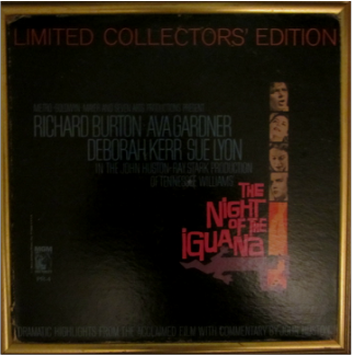
An original vinyl copy of the American pressing of the dramatic highlights from the Metro-Goldwyn-Mayer film adaption of Tennessee Williams' 'The Night Of The Iguana'.
This original vinyl album features dialogue spoken by Richard Burton, Ava Gardner, Deborah Kerr and Sue Lyon and also includes a commentary provided by the legendary film director, John Huston.
This rare original album was released in America by Metro-Goldwyn-Mayer Records in 1964 and issued with the catalogue number PR4.
This album is a limited edition promotional copy which was privately distributed by Metro-Goldwyn-Mayer Records and was not intended for sale to the general public.
This copy was issued in a special gate-fold sleeve which features photographs of Richard Burton and the main cast as well as images of director John Huston, producer Ray Stark and writer Tennessee Williams, the author of 'The Night Of The Iguana'.
The extensive cover notes to this Metro-Goldwyn-Mayer special edition vinyl album read;
"Few motion pictures in cinema annals have enjoyed the public attention and critical acclaim which have been heaped upon 'The Night Of The Iguana'.
From its inception, the project held a fascination too unique to ignore. Ray Stark, head of production for Seven Arts Productions, purchased the motion picture rights to Tennessee Williams' play about a defrocked minister in Mexico prior to its Broadway opening. The play won the New York Drama Critics' Award.
But a prize-winning play does not necessarily spell success for a film adaption. Stark felt the film would require a combination of personalities equivalent to the electrifying meaning of Tennessee Williams' prose. He engaged the services of director John Huston whose fondness for Mexico and its people was evidenced by 'The Treasure Of The Sierra Madre'.
Once Huston and his collaborator, Anthony Veiller, completed the screenplay, the search for the actors commenced. the pieces began to assemble. Richard Burton would play Shannon, the defrocked minister; Ava Gardner, the volatile Maxine; Deborah Kerr would be Hannah, the poetic spinster; and finally, eighteen year-old Sue Lyon, who had soared to fame as Lolita, would play the precocious Charlotte. Four unique and distinctive personalities.
Now Stark and Huston took the big gamble. Instead of confining the action to sound stages, they decided to set this foursome in the eight-hundred year-old Mexican fishing port of Puerto Vallarta. Eight miles away in the Indian village of Mismaloya sets were constructed and housing and facilities built to accommodate the one-hundred and fifty actors and technicians. No telephones, no conveniences, no modern frills. The actors and the company would live for three months in the same environment which Tennessee Williams had written about in his moving play.
The situation seemed explosive to the outside world. Every major news service and magazine in the world dispatched correspondents to the scene. Tennessee Williams arrived to lend assistance and advice on the filming. Luminaries such as architect Buckminster Fuller and prize novelists Budd Schulberg and Barnaby Conrad just 'happened' to drop in. Elizabeth Taylor viewed the filming daily while freelance photographers, described as the 'paparazzi' in Mexico, hid in trees and lurked behind rocks to catch the company at work and at play.
In early December of 1963, Huston completed filming on the MGM - Seven Arts presentation. Still the glamour of the picture had not worn off.
On June 30th, 1964, 'The Night Of The Iguana' was given a sumptuous world premiere showing at New York's Philharmonic Hall in the Lincoln Centre for the Performing Arts. The audience cheered, the critics began an outpouring of acclaim which spread throughout the world.
Stark and Huston had accomplished what they had set out to do. 'The Night Of The Iguana' had been adapted to the screen in a manner that was faithful to Tennessee Williams' writing and honest in its own approach to the weakness and strength of the human spirit.
In this special recording, the producers of 'The Night Of The Iguana' have excerpted some of the poignant dramatic moments from the sound track of the film with commentary by John Huston. The eloquence of the dialogue is heightened by the exuberant acting of the four principals and added to their talents are such outstanding performers as Grayson Hall, Cyril Delevanti and James Ward. The entire Side Two is an uninterrupted rendering of the actual 'night of the iguana' itself in which Mr. Burton, Miss Gardner, Miss Kerr and Mr. Delevanti provide an unforgettable insight into the world of Tennessee Williams.
This original vinyl album features dialogue spoken by Richard Burton, Ava Gardner, Deborah Kerr and Sue Lyon and also includes a commentary provided by the legendary film director, John Huston.
This rare original album was released in America by Metro-Goldwyn-Mayer Records in 1964 and issued with the catalogue number PR4.
This album is a limited edition promotional copy which was privately distributed by Metro-Goldwyn-Mayer Records and was not intended for sale to the general public.
This copy was issued in a special gate-fold sleeve which features photographs of Richard Burton and the main cast as well as images of director John Huston, producer Ray Stark and writer Tennessee Williams, the author of 'The Night Of The Iguana'.
The extensive cover notes to this Metro-Goldwyn-Mayer special edition vinyl album read;
"Few motion pictures in cinema annals have enjoyed the public attention and critical acclaim which have been heaped upon 'The Night Of The Iguana'.
From its inception, the project held a fascination too unique to ignore. Ray Stark, head of production for Seven Arts Productions, purchased the motion picture rights to Tennessee Williams' play about a defrocked minister in Mexico prior to its Broadway opening. The play won the New York Drama Critics' Award.
But a prize-winning play does not necessarily spell success for a film adaption. Stark felt the film would require a combination of personalities equivalent to the electrifying meaning of Tennessee Williams' prose. He engaged the services of director John Huston whose fondness for Mexico and its people was evidenced by 'The Treasure Of The Sierra Madre'.
Once Huston and his collaborator, Anthony Veiller, completed the screenplay, the search for the actors commenced. the pieces began to assemble. Richard Burton would play Shannon, the defrocked minister; Ava Gardner, the volatile Maxine; Deborah Kerr would be Hannah, the poetic spinster; and finally, eighteen year-old Sue Lyon, who had soared to fame as Lolita, would play the precocious Charlotte. Four unique and distinctive personalities.
Now Stark and Huston took the big gamble. Instead of confining the action to sound stages, they decided to set this foursome in the eight-hundred year-old Mexican fishing port of Puerto Vallarta. Eight miles away in the Indian village of Mismaloya sets were constructed and housing and facilities built to accommodate the one-hundred and fifty actors and technicians. No telephones, no conveniences, no modern frills. The actors and the company would live for three months in the same environment which Tennessee Williams had written about in his moving play.
The situation seemed explosive to the outside world. Every major news service and magazine in the world dispatched correspondents to the scene. Tennessee Williams arrived to lend assistance and advice on the filming. Luminaries such as architect Buckminster Fuller and prize novelists Budd Schulberg and Barnaby Conrad just 'happened' to drop in. Elizabeth Taylor viewed the filming daily while freelance photographers, described as the 'paparazzi' in Mexico, hid in trees and lurked behind rocks to catch the company at work and at play.
In early December of 1963, Huston completed filming on the MGM - Seven Arts presentation. Still the glamour of the picture had not worn off.
On June 30th, 1964, 'The Night Of The Iguana' was given a sumptuous world premiere showing at New York's Philharmonic Hall in the Lincoln Centre for the Performing Arts. The audience cheered, the critics began an outpouring of acclaim which spread throughout the world.
Stark and Huston had accomplished what they had set out to do. 'The Night Of The Iguana' had been adapted to the screen in a manner that was faithful to Tennessee Williams' writing and honest in its own approach to the weakness and strength of the human spirit.
In this special recording, the producers of 'The Night Of The Iguana' have excerpted some of the poignant dramatic moments from the sound track of the film with commentary by John Huston. The eloquence of the dialogue is heightened by the exuberant acting of the four principals and added to their talents are such outstanding performers as Grayson Hall, Cyril Delevanti and James Ward. The entire Side Two is an uninterrupted rendering of the actual 'night of the iguana' itself in which Mr. Burton, Miss Gardner, Miss Kerr and Mr. Delevanti provide an unforgettable insight into the world of Tennessee Williams.
The inner cover, linear notes and record label from the Collectors Edition of the 'Dramatic Highlights' of the 1964 film, 'The Night Of The Iguana'.
'The Spy Who Came In From The Cold'
Paramount Pictures Soundtrack Album
RCA Victor Records, 1965
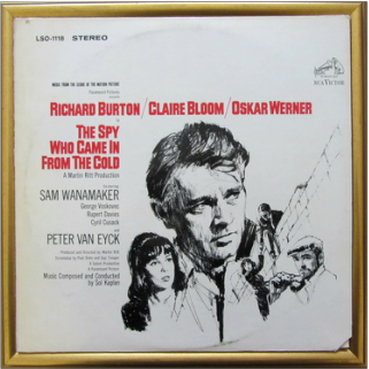
A copy of the original American pressing of the musical score from the 1965 Paramount Pictures film adaption of John Le Carre's Cold War thriller,'The Spy Who Came In From The Cold'.
The original soundtrack music for the film was composed and conducted by Sol Kaplan.
This original American vinyl album was released in 1966 by RCA Victor Records and was issued with the catalogue number LSO 1118. This copy is the stereo version, pressed on black RCA Victor labels which incorporate the famous 'His Master's Voice' logo.
Artwork from the original film poster appears on the front cover and portrait photographs of Richard Burton, Claire Bloom and Oskar Werner, as well as six still images from the film are featured on the reverse.
The cover notes which appear on this original American release read;
"The Spy Who Came In From The Cold", Paramount Pictures' compelling, realistic study of modern-day espionage and one of the most thrilling spy stories of all time, has also been described "...as much a story of loneliness." For the life of secret agent Alec Leamas, the anti-hero of John Le Carre's best selling novel from which the movie has been adapted, is not one of devil-may-care intrigue, nor swashbuckling cloak-and.dagger glamour. Rather, his is a life of raw, bitter isolation where "one must under all circumstances withhold himself from those in whom he should naturally confide". The very survival of Alec Leamas and those of like profession depends on how well and how long they can stay out in the cold. Here is the core of this chilling tale of two cities - of East Berlin and West Berlin in the time of the Cold War, and the men and women who fought it in the shadows.
The many subtle, moving moods of the film, the many-faceted characters, as well as all the tense, suspense-filled episodes, are magnificently captured and heightened in Sol Kaplan's background music score - music that is indeed a major contribution to one of the most exciting, meaningful films of our time - The Spy Who Came In From The Cold."
The orchestrations which appear on this album are entitled;
'The Spy Who Came In From The Cold' Theme / Piano Prelude / Control / Contact / The Pussy Willow Club / Pussy Willow Girl / Leamas And Fiedler / The Compound / The Cell Door / Waltz For A Spy / The Spy Comes In.
No Richard Burton dialogue appears on this soundtrack album.
The original soundtrack music for the film was composed and conducted by Sol Kaplan.
This original American vinyl album was released in 1966 by RCA Victor Records and was issued with the catalogue number LSO 1118. This copy is the stereo version, pressed on black RCA Victor labels which incorporate the famous 'His Master's Voice' logo.
Artwork from the original film poster appears on the front cover and portrait photographs of Richard Burton, Claire Bloom and Oskar Werner, as well as six still images from the film are featured on the reverse.
The cover notes which appear on this original American release read;
"The Spy Who Came In From The Cold", Paramount Pictures' compelling, realistic study of modern-day espionage and one of the most thrilling spy stories of all time, has also been described "...as much a story of loneliness." For the life of secret agent Alec Leamas, the anti-hero of John Le Carre's best selling novel from which the movie has been adapted, is not one of devil-may-care intrigue, nor swashbuckling cloak-and.dagger glamour. Rather, his is a life of raw, bitter isolation where "one must under all circumstances withhold himself from those in whom he should naturally confide". The very survival of Alec Leamas and those of like profession depends on how well and how long they can stay out in the cold. Here is the core of this chilling tale of two cities - of East Berlin and West Berlin in the time of the Cold War, and the men and women who fought it in the shadows.
The many subtle, moving moods of the film, the many-faceted characters, as well as all the tense, suspense-filled episodes, are magnificently captured and heightened in Sol Kaplan's background music score - music that is indeed a major contribution to one of the most exciting, meaningful films of our time - The Spy Who Came In From The Cold."
The orchestrations which appear on this album are entitled;
'The Spy Who Came In From The Cold' Theme / Piano Prelude / Control / Contact / The Pussy Willow Club / Pussy Willow Girl / Leamas And Fiedler / The Compound / The Cell Door / Waltz For A Spy / The Spy Comes In.
No Richard Burton dialogue appears on this soundtrack album.
The reverse cover and original RCA Victor record label for the soundtrack album of 'The Spy Who Came In From The Cold', released in 1965.
'The Sandpiper' Original Soundtrack Album
Mercury Records, 1965
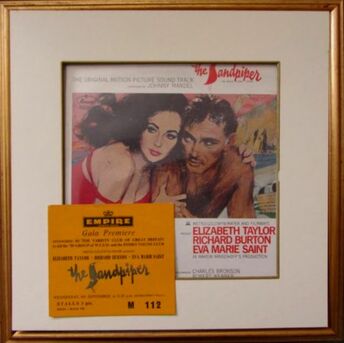
An original American pressing of the motion picture soundtrack to the Metro-Goldwyn-Mayer Richard Burton and Elizabeth Taylor romantic drama, 'The Sandpiper'.
This original American vinyl copy was released on the Mercury Hi-Fidelity Records label and issued with the catalogue number MG-21032.
This is the original mono version, which was pressed with red Mercury Records labels.
The soundtrack was composed by Johnny Mandel, conducted by Robert Armbruster, produced by Quincy Jones and features the Award-winning composition 'The Shadow Of Your Smile'.
The orchestrations which appear on this album are entitled;
Shadow Of Your Smile (with vocal) / Main Title / Desire / Seduction / San Simeon / Weekend Montage / Baby Sandpiper / Art Gallery / End Title / Bird Bath.
The sleeve notes, relating to the musical score, were written by Johnny Mandel and read;
" In composing the score for the Elizabeth Taylor and Richard Burton motion picture, 'The Sandpiper', I decided to attempt something different in soundtrack music. Usually, a cinema composer tries to dazzle the listener with the wildest possible variety of sounds and tempos. For 'The Sandpiper' I have, instead, tried to sustain a constant mood throughout. It's a haunting mood matching the poignancy of the story, underscored by the beauty and loneliness of the magnificent Big Sur location.
I have attempted, with this music, to capture the sounds of the surf, the grandeur of the mountains, the beauty of the land. I fell in love with the Big Sur more than ten years ago. Naturally, I was delighted with a motion picture assignment that allowed me to transmit to the listener the feeling I have about this great and unspoiled corner of America. I hope I have succeeded."
The continuation of the cover notes, in relation to the film itself, reads;
"For the Martin Ransohoff production, 'The Sandpiper', director Vincente Minnelli took his crew and colour cameras to the paradisical Big Sur coast of California to film a compelling love story that might have been made to order for Elizabeth Taylor and Richard Burton. It is a highly emotional picture that brings together an unconventional woman living a nonconformist life and a married man of a strong conservative background. Their passionate love affair comes close to destroying the man's marriage and ruining his career.
Despite the explosive clash of the entirely different personalities of Laura and Hewitt and his antagonism toward her beatnik friends (one of whom paints her in the nude), their mutual attraction is overpowering and their love inevitable. In the end, Hewitt finds the strength to break with Laura - but their love affair has left them with a great understanding that has enriched their lives.
Director Minnelli (whose credits include 'Gigi' and 'An American In Paris') has probed deeply into the characters and dramatic conflicts of 'The Sandpiper' and brings each scene to new heights of screen excitement. He has perfectly captured the Big Sur land with its rugged beauty, and uses it as a brilliant backdrop for the story's passionate romantic interludes. Here, too, Minnelli brings to life an explosive scene of a wild beatnik party that ignites into violence. 'The Sandpiper' - an outstanding modern motion picture."
The album cover features artwork from the American issue of 'The Sandpiper' film poster as well as four black and white still images from the film featuring Richard Burton and Elizabeth Taylor on the reverse.
This original American vinyl copy was released on the Mercury Hi-Fidelity Records label and issued with the catalogue number MG-21032.
This is the original mono version, which was pressed with red Mercury Records labels.
The soundtrack was composed by Johnny Mandel, conducted by Robert Armbruster, produced by Quincy Jones and features the Award-winning composition 'The Shadow Of Your Smile'.
The orchestrations which appear on this album are entitled;
Shadow Of Your Smile (with vocal) / Main Title / Desire / Seduction / San Simeon / Weekend Montage / Baby Sandpiper / Art Gallery / End Title / Bird Bath.
The sleeve notes, relating to the musical score, were written by Johnny Mandel and read;
" In composing the score for the Elizabeth Taylor and Richard Burton motion picture, 'The Sandpiper', I decided to attempt something different in soundtrack music. Usually, a cinema composer tries to dazzle the listener with the wildest possible variety of sounds and tempos. For 'The Sandpiper' I have, instead, tried to sustain a constant mood throughout. It's a haunting mood matching the poignancy of the story, underscored by the beauty and loneliness of the magnificent Big Sur location.
I have attempted, with this music, to capture the sounds of the surf, the grandeur of the mountains, the beauty of the land. I fell in love with the Big Sur more than ten years ago. Naturally, I was delighted with a motion picture assignment that allowed me to transmit to the listener the feeling I have about this great and unspoiled corner of America. I hope I have succeeded."
The continuation of the cover notes, in relation to the film itself, reads;
"For the Martin Ransohoff production, 'The Sandpiper', director Vincente Minnelli took his crew and colour cameras to the paradisical Big Sur coast of California to film a compelling love story that might have been made to order for Elizabeth Taylor and Richard Burton. It is a highly emotional picture that brings together an unconventional woman living a nonconformist life and a married man of a strong conservative background. Their passionate love affair comes close to destroying the man's marriage and ruining his career.
Despite the explosive clash of the entirely different personalities of Laura and Hewitt and his antagonism toward her beatnik friends (one of whom paints her in the nude), their mutual attraction is overpowering and their love inevitable. In the end, Hewitt finds the strength to break with Laura - but their love affair has left them with a great understanding that has enriched their lives.
Director Minnelli (whose credits include 'Gigi' and 'An American In Paris') has probed deeply into the characters and dramatic conflicts of 'The Sandpiper' and brings each scene to new heights of screen excitement. He has perfectly captured the Big Sur land with its rugged beauty, and uses it as a brilliant backdrop for the story's passionate romantic interludes. Here, too, Minnelli brings to life an explosive scene of a wild beatnik party that ignites into violence. 'The Sandpiper' - an outstanding modern motion picture."
The album cover features artwork from the American issue of 'The Sandpiper' film poster as well as four black and white still images from the film featuring Richard Burton and Elizabeth Taylor on the reverse.
The reverse of the 'Sandpiper' soundtrack album and original Mercury record label. The soundtrack album was produced by Quincy Jones.
'The Taming Of The Shrew' Dialogue Highlights Album
RCA Victor Records Red Seal Label, 1967
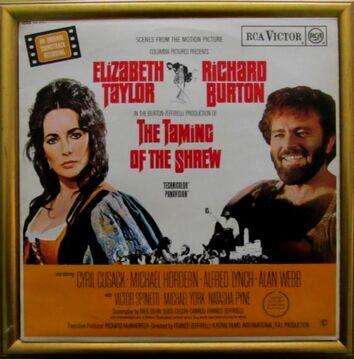
Released by RCA Victor Records in 1967, this is a copy of the original British pressing of the soundtrack album to the Columbia Pictures, Richard Burton and Elizabeth Taylor film adaption of William Shakespeare's, 'The Taming Of The Shrew'.
This original vinyl album features the dialogue highlights from all the major scenes from the film which include, 'The Argument', 'The Wooing', 'The Wedding', 'The Taming' and 'The Banquet'.
On the reverse of the cover, aside from a detailed synopsis of each scene as they are presented in the chapters contained on the recording, are cover notes written by Paul Kresh, editor of 'HiFi / Stereo Review', which read;
"The moral of this turbulent tale may not go down easily nowadays, but the battle is glorious while it lasts. Through the ages, it has inspired countless productions, including a 1929 movie with Douglas Fairbanks and Mary Pickford, a grand opera, and the rousing Cole Porter musical, 'Kiss Me Kate'.
Zeffirelli, the irrepressible Florentine, who has transferred 'The Taming Of The Shrew' to the screen for Columbia Pictures, here once again lives up to his reputation as a director who can blow the dust off a classic and bring an old text back to sizzling life. As you'll hear in this album of highlights from the movie soundtrack, it's not just one more recorded version of 'The Taming Of The Shrew', but a free-wheeling, ingenious adaptation of the story that still retains the Shakespearean idiom. Miss Taylor, who has played some fulminating spitfires on the screen, including Cleopatra and Martha in 'Who's Afraid Of Virginia Woolf?', outdoes herself as the ravishing virago Kate. To the part of the swaggering suitor who brings her to her knees, Burton adds another triumph to his mounting reputation as the greatest actor of the English-speaking world. You don't need to see the beard he wears to sense this Petruchio's indomitable virility! And the Burton's are surrounded in the supporting roles by distinguished Shakespearean actors from four countries.
But if haven't yet started the first side going on your turntable, allow me to delay your pleasure no longer. Betake yourself forthwith to Padua and let the wild words soar..."
This is the original mono pressing which was issued with the catalogue number RB-6711 and which was pressed on the RCA 'Red Seal' record label.
The musical score was composed by Nino Rota and was produced for RCA Records by Peter Dellheim.
This copy is complete with the original card insert, printed by the MacNeill Press, London, which features a full cast list, a further synopsis of the film and a multitude of black and white still images from the film.
This original vinyl album features the dialogue highlights from all the major scenes from the film which include, 'The Argument', 'The Wooing', 'The Wedding', 'The Taming' and 'The Banquet'.
On the reverse of the cover, aside from a detailed synopsis of each scene as they are presented in the chapters contained on the recording, are cover notes written by Paul Kresh, editor of 'HiFi / Stereo Review', which read;
"The moral of this turbulent tale may not go down easily nowadays, but the battle is glorious while it lasts. Through the ages, it has inspired countless productions, including a 1929 movie with Douglas Fairbanks and Mary Pickford, a grand opera, and the rousing Cole Porter musical, 'Kiss Me Kate'.
Zeffirelli, the irrepressible Florentine, who has transferred 'The Taming Of The Shrew' to the screen for Columbia Pictures, here once again lives up to his reputation as a director who can blow the dust off a classic and bring an old text back to sizzling life. As you'll hear in this album of highlights from the movie soundtrack, it's not just one more recorded version of 'The Taming Of The Shrew', but a free-wheeling, ingenious adaptation of the story that still retains the Shakespearean idiom. Miss Taylor, who has played some fulminating spitfires on the screen, including Cleopatra and Martha in 'Who's Afraid Of Virginia Woolf?', outdoes herself as the ravishing virago Kate. To the part of the swaggering suitor who brings her to her knees, Burton adds another triumph to his mounting reputation as the greatest actor of the English-speaking world. You don't need to see the beard he wears to sense this Petruchio's indomitable virility! And the Burton's are surrounded in the supporting roles by distinguished Shakespearean actors from four countries.
But if haven't yet started the first side going on your turntable, allow me to delay your pleasure no longer. Betake yourself forthwith to Padua and let the wild words soar..."
This is the original mono pressing which was issued with the catalogue number RB-6711 and which was pressed on the RCA 'Red Seal' record label.
The musical score was composed by Nino Rota and was produced for RCA Records by Peter Dellheim.
This copy is complete with the original card insert, printed by the MacNeill Press, London, which features a full cast list, a further synopsis of the film and a multitude of black and white still images from the film.
The reverse of the original RCA Victor cover of 'The Taming Of The Shrew' and the original RCA 'Red Seal' label catalogue number RB 6711.
Both sides of the original card insert, issued with the early pressings of this RCA Victor release of 'The Taming Of The Shrew'.
'Anne Of The Thousand Days' Universal Pictures Original Soundtrack Album, Decca Records, 1970
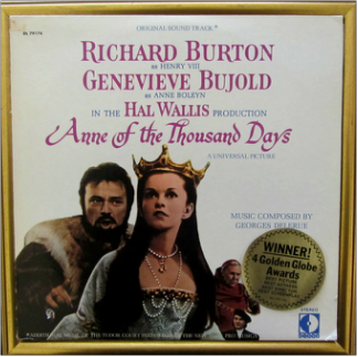
A copy of the original American release of the soundtrack music to the Golden Globe winning, Hal Wallis / Universal Pictures production of the historical drama, 'Anne Of The Thousand Days'.
This copy was released in 1970 on the Decca Stereo label (MCA Incorporated Division), New York, and was issued with the catalogue number DL 79174.
This is the original American stereo pressing, issued on red and silver Decca Stereo record labels.
The music for the film was composed by Georges Delarue with lyrics written by John Hale.
The cover notes to this American edition read;
"Hal B. Wallis' production of 'Anne Of The Thousand Days', selected by the Executive Committee for the 1970 Royal Film Performance before her Majesty the Queen, and lavishly praised by motion picture reviewers all over the world, was seven years in reaching the screen.
The richly-mounted historical drama starring Richard Burton as Henry VIII and Genevieve Bujold as the ill-fated Anne Boleyn, was conceived as a film project by Wallis during production in 1962 of his highly successful screen translation of 'Becket'.
A filmmaker of impeccable taste, unwilling to make compromise in casting or reduce the size of the canvass to bring his project to the screen with maximum dramatic power, he searched for the perfect heroine until he found the French Canadian actress who plays the title role, waited until Richard Burton was free of commitments, then began filming in England with Charles Jarrott, new to the feature film medium, as his director. The cast was rounded out by Irene Papas, Anthony Quayle, John Colicos and Michael Hordern.
Since the rich tapestry of 'Anne Of The Thousand Days' with its royal backgrounds, intrigues and emotional peaks demanded a composer of extraordinary talent, Wallis signed French composer Georges Delarue to compose the original score. Noted for his theme music for 'A Man For All Seasons', set in the same historical period, 'Hiroshima Mon Amour' and 'A Walk With Love And Death', Delarue began his work on the film before the cameras turned in order to integrate the music with the actual production.
Notable in the score is Delarue's theme music for the two principals, alternately stormy, imperious and tender for Henry, and subtle in the musical delineation of Anne Boleyn's passage from a wide-eyed young woman to a Queen made cunning and harsh by the values of the court society into which she was unwillingly thrust."
The tracklisting of orchestrations from the film which appear on this album are as follows;
Overture / Court Airs And Dances / Lute Song / Farewell My Love / Fanfare And Dances For Henry VIII / Execution And Epilogue.
The additional music of the Tudor Court which appears on the second side of this album was performed by The New York Pro Musica, under the direction of John Reeves White and Noah Greenberg. The cover notes, in describing the additional music, read;
"What more appropriate companion side to the soundtrack of 'Anne Of The Thousand Days' than music of 18th Century England played on authentic instruments of the period by musicians thoroughly at home in the idiom.
Since its formation in 1952, the New York Pro Musica has gained recognition as the world's leading ensemble performing music written prior to the 18th Century. In addition to its annual coast-to-coast concert tours, now totalling some one hundred and thirty performances a year, it has appeared to enthusiastic acclaim in Europe, the Near and Far East, and South America.
The pieces heard here are among those that delighted the English Court from the time of Henry VIII through the reign of Elizabeth I. Their composers, including King Henry himself, provided a rich store of music for royal entertainment and pageantry. That music comes to life again as the New York Pro Musica takes archaic instruments in hand and begins to play. Listen to the near-forgotten sounds of the shawn, krummhorn, sackbut, cornett, rauschpfeife, kortholt, organetto, regal, wooden flute and gamba, as well as the more familiar recorder and harpsichord, and partake of the musical pleasures of Tudor England."
This copy was released in 1970 on the Decca Stereo label (MCA Incorporated Division), New York, and was issued with the catalogue number DL 79174.
This is the original American stereo pressing, issued on red and silver Decca Stereo record labels.
The music for the film was composed by Georges Delarue with lyrics written by John Hale.
The cover notes to this American edition read;
"Hal B. Wallis' production of 'Anne Of The Thousand Days', selected by the Executive Committee for the 1970 Royal Film Performance before her Majesty the Queen, and lavishly praised by motion picture reviewers all over the world, was seven years in reaching the screen.
The richly-mounted historical drama starring Richard Burton as Henry VIII and Genevieve Bujold as the ill-fated Anne Boleyn, was conceived as a film project by Wallis during production in 1962 of his highly successful screen translation of 'Becket'.
A filmmaker of impeccable taste, unwilling to make compromise in casting or reduce the size of the canvass to bring his project to the screen with maximum dramatic power, he searched for the perfect heroine until he found the French Canadian actress who plays the title role, waited until Richard Burton was free of commitments, then began filming in England with Charles Jarrott, new to the feature film medium, as his director. The cast was rounded out by Irene Papas, Anthony Quayle, John Colicos and Michael Hordern.
Since the rich tapestry of 'Anne Of The Thousand Days' with its royal backgrounds, intrigues and emotional peaks demanded a composer of extraordinary talent, Wallis signed French composer Georges Delarue to compose the original score. Noted for his theme music for 'A Man For All Seasons', set in the same historical period, 'Hiroshima Mon Amour' and 'A Walk With Love And Death', Delarue began his work on the film before the cameras turned in order to integrate the music with the actual production.
Notable in the score is Delarue's theme music for the two principals, alternately stormy, imperious and tender for Henry, and subtle in the musical delineation of Anne Boleyn's passage from a wide-eyed young woman to a Queen made cunning and harsh by the values of the court society into which she was unwillingly thrust."
The tracklisting of orchestrations from the film which appear on this album are as follows;
Overture / Court Airs And Dances / Lute Song / Farewell My Love / Fanfare And Dances For Henry VIII / Execution And Epilogue.
The additional music of the Tudor Court which appears on the second side of this album was performed by The New York Pro Musica, under the direction of John Reeves White and Noah Greenberg. The cover notes, in describing the additional music, read;
"What more appropriate companion side to the soundtrack of 'Anne Of The Thousand Days' than music of 18th Century England played on authentic instruments of the period by musicians thoroughly at home in the idiom.
Since its formation in 1952, the New York Pro Musica has gained recognition as the world's leading ensemble performing music written prior to the 18th Century. In addition to its annual coast-to-coast concert tours, now totalling some one hundred and thirty performances a year, it has appeared to enthusiastic acclaim in Europe, the Near and Far East, and South America.
The pieces heard here are among those that delighted the English Court from the time of Henry VIII through the reign of Elizabeth I. Their composers, including King Henry himself, provided a rich store of music for royal entertainment and pageantry. That music comes to life again as the New York Pro Musica takes archaic instruments in hand and begins to play. Listen to the near-forgotten sounds of the shawn, krummhorn, sackbut, cornett, rauschpfeife, kortholt, organetto, regal, wooden flute and gamba, as well as the more familiar recorder and harpsichord, and partake of the musical pleasures of Tudor England."
The reverse cover and original Decca Stereo record label for the American pressing of the soundtrack album to 'Anne Of The Thousand Days'.
'Equus' Original Film Soundtrack and Dialogue Album
United Artists Records, 1977
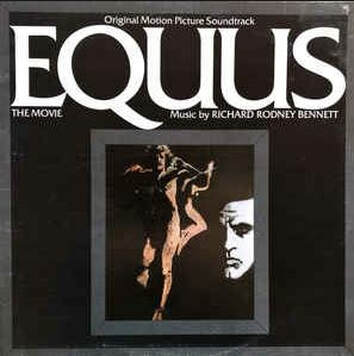
A copy of the original American vinyl release of the 1977 soundtrack album to the United Artists Award-winning film adaption of Peter Shaffer's psychological thriller, 'Equus'.
With music composed and performed by Sir Richard Rodney Bennett, conducted by Angela Morley, the album is further enhanced by the inclusion of major dialogue sections from this powerful film.
The majority of Richard Burton's incredible monologues from the film, in which he was cast in the role of Dr. Martin Dysart, are included on this outstanding album.
The album was recorded at The Music Centre, Wembley, Middlesex and was engineered and mixed by John Richards.
The track-listing for this 'Equus' soundtrack album is as follows;
Main Title Theme / Hospital Monologue / The Beach / The Pictures / Monologue / Richard Burton Monologue / The Stables / The Field Of Ha Ha Dialogue / The Ride / Richard Burton Monologue / The Stabbing / Epilogue.
The album was released by United Artists in 1977 and issued with the catalogue number UA-LA839-H. The album was produced and coordinated by Shawn Salvo and Sarah Jane Vickers.
With music composed and performed by Sir Richard Rodney Bennett, conducted by Angela Morley, the album is further enhanced by the inclusion of major dialogue sections from this powerful film.
The majority of Richard Burton's incredible monologues from the film, in which he was cast in the role of Dr. Martin Dysart, are included on this outstanding album.
The album was recorded at The Music Centre, Wembley, Middlesex and was engineered and mixed by John Richards.
The track-listing for this 'Equus' soundtrack album is as follows;
Main Title Theme / Hospital Monologue / The Beach / The Pictures / Monologue / Richard Burton Monologue / The Stables / The Field Of Ha Ha Dialogue / The Ride / Richard Burton Monologue / The Stabbing / Epilogue.
The album was released by United Artists in 1977 and issued with the catalogue number UA-LA839-H. The album was produced and coordinated by Shawn Salvo and Sarah Jane Vickers.
The reverse of the original American pressing and record label for the film soundtrack to 'Equus', released by United Artists Records in 1977.
'The Wild Geese' Original Rank Organisation Film Soundtrack Album, A&M Records, 1978
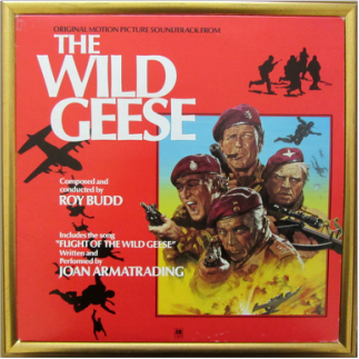
A copy of the original vinyl album of the soundtrack to the superb Rank Organisation / Andrew V. McLaglen action film, 'The Wild Geese'.
The original soundtrack music for the film was performed by The National Philharmonic Orchestra which was conducted by Roy Budd and includes the haunting title song, 'The Flight Of The Wild Geese', which was performed and recorded by Joan Armatrading.
The reverse of the album cover features several colour images from the Euan Lloyd production of 'The Wild Geese'.
The orchestrations from the film which appear on this soundtrack album are as follows;
Overture / Flight Of The Wild Geese / Main Titles / Rafer's Theme / Dance With Death / Reunion / Wild Geese Theme / Rescue Of Limbani / Flight To Africa / Parade Ground (Dogs Of War) / Airport / Compound / Peter's Death / Rafer's Death / Rafer's Son / Left, Right!.
The orchestration for 'Dance With Death' was written and performed by Jerry and Marc Donahue.
'The Wild Geese March' features the voices of the Irish Guards, led by actor Jack Watson, who also appeared in the film. The album was released in 1978 by A & M Records. This is the original stereo edition which was issued with the catalogue number AMLH 64730 and was pressed on gold and silver A & M labels.
The original soundtrack music for the film was performed by The National Philharmonic Orchestra which was conducted by Roy Budd and includes the haunting title song, 'The Flight Of The Wild Geese', which was performed and recorded by Joan Armatrading.
The reverse of the album cover features several colour images from the Euan Lloyd production of 'The Wild Geese'.
The orchestrations from the film which appear on this soundtrack album are as follows;
Overture / Flight Of The Wild Geese / Main Titles / Rafer's Theme / Dance With Death / Reunion / Wild Geese Theme / Rescue Of Limbani / Flight To Africa / Parade Ground (Dogs Of War) / Airport / Compound / Peter's Death / Rafer's Death / Rafer's Son / Left, Right!.
The orchestration for 'Dance With Death' was written and performed by Jerry and Marc Donahue.
'The Wild Geese March' features the voices of the Irish Guards, led by actor Jack Watson, who also appeared in the film. The album was released in 1978 by A & M Records. This is the original stereo edition which was issued with the catalogue number AMLH 64730 and was pressed on gold and silver A & M labels.
The reverse of the 1978 'Wild Geese' soundtrack album cover and original A & M record label, issued with the catalogue number AMLH 64730.
The Eurythmics 'Nineteen Eighty-Four'
Virgin Records Original Soundtrack Album, 1984
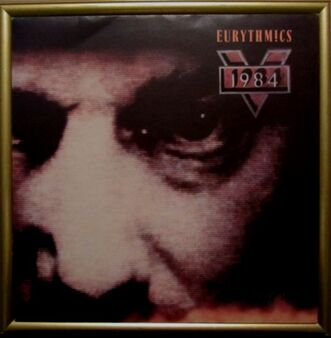
A copy of the original vinyl soundtrack album for Richard Burton's final film, 'Nineteen Eighty-Four'.
The musical score was composed and performed by Annie Lennox and Dave Stewart of The Eurythmics, and the album itself was produced by Dave Stewart.
This original album was released by Virgin Records Limited in 1984 and was issued with the catalogue number V1 1984.
The track-listing for the album is as follows;
I Did It Just The Same / Sexcrime (Nineteen Eighty-Four) / For The Love Of Big Brother / Winston's Diary / Greetings From A Dead Man / Julia / Doubleplusgood / Ministry Of Love / Room 101
The reverse of the album sleeve features still images from Michael Radford's 1984 Virgin Films adaption of George Orwell's novel, two which feature Richard Burton in his final role as the interrogator O'Brien.
The cover was designed by Sarah Quill for Virgin Records and Sleeve Mighty.
The musical score was composed and performed by Annie Lennox and Dave Stewart of The Eurythmics, and the album itself was produced by Dave Stewart.
This original album was released by Virgin Records Limited in 1984 and was issued with the catalogue number V1 1984.
The track-listing for the album is as follows;
I Did It Just The Same / Sexcrime (Nineteen Eighty-Four) / For The Love Of Big Brother / Winston's Diary / Greetings From A Dead Man / Julia / Doubleplusgood / Ministry Of Love / Room 101
The reverse of the album sleeve features still images from Michael Radford's 1984 Virgin Films adaption of George Orwell's novel, two which feature Richard Burton in his final role as the interrogator O'Brien.
The cover was designed by Sarah Quill for Virgin Records and Sleeve Mighty.
The reverse and label of the 1984 Virgin Records release of the Eurythmics soundtrack album for the film version of 'Nineteen Eighty-Four'.
A Selection Of Various Richard Burton Related Audio Cassette Tape Releases
'Under Milk Wood' By Dylan Thomas, (1954 Adaption)
The Decca Record Company (Argo Division)
Deluxe Box-Set Edition, 1954
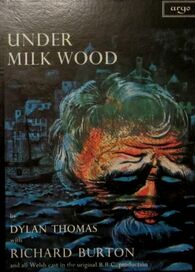
A copy of the double audio cassette tape, boxed-set edition, of the original 1954 B.B.C. recording of Dylan Thomas's 'Under Milk Wood', featuring Richard Burton cast in the role of 'First Voice', alongside Richard Bebb and an all-Welsh cast.
This boxed-set edition was released by The Decca Record Company (Argo Division), London, in 1954.
This original, pristine copy is the mono version which was issued with the catalogue number K84K 22 and which contains two yellow labelled audio cassette tapes presented as a deluxe boxed-set edition, complete with a fold-out insert listing the full cast and detailed notes written by Daniel Jones. The complete transcript of the notes can be found above, in the section relating to the original 1954 vinyl edition, SW 501.
This cassette tape boxed-set, as with the original vinyl pressing of the album, was released with the full co-operation of the British Broadcasting Corporation and features the haunting artwork by Arthur Wragg.
The original 1954 B.B.C. recording of 'Under Milk Wood' was produced by Douglas Cleverdon.
This boxed-set edition was released by The Decca Record Company (Argo Division), London, in 1954.
This original, pristine copy is the mono version which was issued with the catalogue number K84K 22 and which contains two yellow labelled audio cassette tapes presented as a deluxe boxed-set edition, complete with a fold-out insert listing the full cast and detailed notes written by Daniel Jones. The complete transcript of the notes can be found above, in the section relating to the original 1954 vinyl edition, SW 501.
This cassette tape boxed-set, as with the original vinyl pressing of the album, was released with the full co-operation of the British Broadcasting Corporation and features the haunting artwork by Arthur Wragg.
The original 1954 B.B.C. recording of 'Under Milk Wood' was produced by Douglas Cleverdon.
The interior of the deluxe boxed-set edition of 'Under Milk Wood' which includes the original Decca cassette tape housing and fold-out insert featuring the full cast list for this historic 1954 recording and notes by Daniel Jones.
'The Rime of the Ancient Mariner and Other Poems'
The Decca Record Company (Argo Division), 1982
A copy of the double audio cassette tape, boxed-set edition, of 'The Rime of the Ancient Mariner and Other Poems Read by Richard Burton'.
This collection was released by Decca Records (Argo Division), in 1982 with the catalogue number Argo SAY47.
This boxed-set edition was recorded in association with the British Council and the Oxford University Press.
The track-listing comprises of Richard Burton, Robert Hardy and John Neville's 1955 recording of Samuel Taylor Coleridge's, 'The Rime of the Ancient Mariner', the complete 'Richard Burton reads Fifteen Poems by Dylan Thomas' and the 'Richard Burton - A Personal Anthology' poetry and prose collection.
The cover artwork for this collection was designed by the Artifex Studio and features the original etching by Gustav Dore of the Ancient Mariner.
This collection was released by Decca Records (Argo Division), in 1982 with the catalogue number Argo SAY47.
This boxed-set edition was recorded in association with the British Council and the Oxford University Press.
The track-listing comprises of Richard Burton, Robert Hardy and John Neville's 1955 recording of Samuel Taylor Coleridge's, 'The Rime of the Ancient Mariner', the complete 'Richard Burton reads Fifteen Poems by Dylan Thomas' and the 'Richard Burton - A Personal Anthology' poetry and prose collection.
The cover artwork for this collection was designed by the Artifex Studio and features the original etching by Gustav Dore of the Ancient Mariner.
'Under Milk Wood' By Dylan Thomas, (1954 Adaption)
The Decca Record Company (Argo Division), 1982
A copy of an early, double audio cassette tape edition of Dylan Thomas's 'Play For Voices', 'Under Milk Wood'.
This edition was released in 1982 by Decca Records, (Argo Division), and issued with the catalogue number ARGO 1016.
This double audio cassette tape set is the original B.B.C. recording, dating from 1954, with Richard Burton cast in the role of 'First Voice', alongside Richard Bebb and an all-Welsh cast which was produced for the B.B.C. by Douglas Cleverdon.
The cover notes for this early edition read;
"'Under Milk Wood' is Dylan Thomas' most popular and famous work. It is a lyrical study in the life of a Welsh fishing village as revealed through the dreams and voices of its inhabitants - and what a rich brew of humanity they are! Written as a 'Play For Voices' this unique creation can best be enjoyed in this acclaimed B.B.C. Radio version with Richard Burton leading a superb cast."
This edition was released in 1982 by Decca Records, (Argo Division), and issued with the catalogue number ARGO 1016.
This double audio cassette tape set is the original B.B.C. recording, dating from 1954, with Richard Burton cast in the role of 'First Voice', alongside Richard Bebb and an all-Welsh cast which was produced for the B.B.C. by Douglas Cleverdon.
The cover notes for this early edition read;
"'Under Milk Wood' is Dylan Thomas' most popular and famous work. It is a lyrical study in the life of a Welsh fishing village as revealed through the dreams and voices of its inhabitants - and what a rich brew of humanity they are! Written as a 'Play For Voices' this unique creation can best be enjoyed in this acclaimed B.B.C. Radio version with Richard Burton leading a superb cast."
'Under Milk Wood' By Dylan Thomas, (1954 Adaption)
Polygram / Argo Edition,1994
A much later, differently packaged, double audio cassette tape edition of the original 1954 all-Welsh cast recording of Dylan Thomas's 'Under Milk Wood'.
This version was released in 1994 by the Polygram Recording Company, using the earlier original Decca subsidiary record label, 'Argo'.
The original 1954 production was produced by Douglas Cleverdon.
This copy was released with the catalogue number 522 140-4 and also an audio book catalogue number, ISBN 1-85849-815-5.
The text from the cover notes from this audio cassette release, as in the above version, read;
"Under Milk Wood is Dylan Thomas's most popular and famous work. It is a lyrical study of a day in the life of a Welsh fishing village as revealed through the dreams and voices of its inhabitants - and what a rich brew of humanity they are! Written as a 'Play For Voices', this unique creation can best be enjoyed in this acclaimed B.B.C. radio version with Richard Burton leading a superb cast."
This version was released in 1994 by the Polygram Recording Company, using the earlier original Decca subsidiary record label, 'Argo'.
The original 1954 production was produced by Douglas Cleverdon.
This copy was released with the catalogue number 522 140-4 and also an audio book catalogue number, ISBN 1-85849-815-5.
The text from the cover notes from this audio cassette release, as in the above version, read;
"Under Milk Wood is Dylan Thomas's most popular and famous work. It is a lyrical study of a day in the life of a Welsh fishing village as revealed through the dreams and voices of its inhabitants - and what a rich brew of humanity they are! Written as a 'Play For Voices', this unique creation can best be enjoyed in this acclaimed B.B.C. radio version with Richard Burton leading a superb cast."
'Under Milk Wood' By Dylan Thomas (1954 Adaption)
Polygram / Decca / Argo Edition,1994
A differently packaged, double audio cassette tape copy of the 1994 release of Dylan Thomas's 'Under Milk Wood'.
This copy was released by Polygram Record Operations Limited and issued on the Argo label with the catalogue number 522-140-4 and also the audio book number ISBN 1-858849-657-8.
This audio tape edition is a recording of the original 1954 production with Richard Burton cast in the role of 'First Voice' accompanied by Richard Bebb and and all-Welsh cast of actors, including Hugh Griffith, Meredith Edwards., Rachel Thomas and Philip Burton. The production was produced for the B.B.C. by Douglas Cleverdon.
This copy was released by Polygram Record Operations Limited and issued on the Argo label with the catalogue number 522-140-4 and also the audio book number ISBN 1-858849-657-8.
This audio tape edition is a recording of the original 1954 production with Richard Burton cast in the role of 'First Voice' accompanied by Richard Bebb and and all-Welsh cast of actors, including Hugh Griffith, Meredith Edwards., Rachel Thomas and Philip Burton. The production was produced for the B.B.C. by Douglas Cleverdon.
'A Richard Burton Anthology - Poetry Readings'
The Decca Record Company (Argo Division), 1982
A copy of the double audio cassette tape edition of 'A Richard Burton Anthology - Poetry Readings'.
This edition was released by The Decca Record Company, (Argo Division), in 1982 and issued with the catalogue number Argo 1047 as well as the audio book catalogue number ISBN 1-85849-013-8. These recordings were released in association with the British Council and the Oxford University Press.
This edition features the complete collection of poetry readings which first appeared on the original 'Richard Burton - A Personal Anthology' vinyl album, released in 1978, which comprises of the tracks;
The Leaden Echo And The Golden Echo / Lines From 'The Boy With A Cart' / The Good Morrow / The Passionate Shepherd To His Love / Go Catch A Falling Star / Non Sum Qualis Eram Bonae Sub Regno Cynarae / Yasmin, A Ghazel / Poem From 'Under Milk Wood' / Welsh Incident / Exequy On His Wife / Lament For The Makers / The Passionate Wife's Pilgrimage / Desiderata / Adelstrop / Autumn / Priest And Peasant / The Lonely Farmer / Lines From 'Richard II' / In Memoriam Walter Ramsden / Hunter Trials / To Christ / At The Round Earth's Imagined Corners / Elegy For His Father / Death Be Not Proud / The Hound Of Heaven / Lines From William Shakespeare's 'The Tempest'.
Also included on this edition are the recordings from the Argo albums, 'Richard Burton Reads Fifteen Poems By Dylan Thomas' from 1955 and 'The Rime Of The Ancient Mariner', featuring Robert Hardy and John Neville. Also included on this release is a moving reading by Richard Burton of 'Frost At Midnight' by Samuel Taylor Coleridge.
This edition was released by The Decca Record Company, (Argo Division), in 1982 and issued with the catalogue number Argo 1047 as well as the audio book catalogue number ISBN 1-85849-013-8. These recordings were released in association with the British Council and the Oxford University Press.
This edition features the complete collection of poetry readings which first appeared on the original 'Richard Burton - A Personal Anthology' vinyl album, released in 1978, which comprises of the tracks;
The Leaden Echo And The Golden Echo / Lines From 'The Boy With A Cart' / The Good Morrow / The Passionate Shepherd To His Love / Go Catch A Falling Star / Non Sum Qualis Eram Bonae Sub Regno Cynarae / Yasmin, A Ghazel / Poem From 'Under Milk Wood' / Welsh Incident / Exequy On His Wife / Lament For The Makers / The Passionate Wife's Pilgrimage / Desiderata / Adelstrop / Autumn / Priest And Peasant / The Lonely Farmer / Lines From 'Richard II' / In Memoriam Walter Ramsden / Hunter Trials / To Christ / At The Round Earth's Imagined Corners / Elegy For His Father / Death Be Not Proud / The Hound Of Heaven / Lines From William Shakespeare's 'The Tempest'.
Also included on this edition are the recordings from the Argo albums, 'Richard Burton Reads Fifteen Poems By Dylan Thomas' from 1955 and 'The Rime Of The Ancient Mariner', featuring Robert Hardy and John Neville. Also included on this release is a moving reading by Richard Burton of 'Frost At Midnight' by Samuel Taylor Coleridge.
'Burton At The BBC'
B.B.C Worldwide Radio Collection, 1995
An outstanding double audio cassette tape edition of 'Burton At The B.B.C'.
This edition was released in 1995 by B.B.C Worldwide Limited and issued with the catalogue number ZBBC 1754.
This collection contains an interesting selection of recordings which Richard Burton made for the B.B.C as well as several candid and revealing interview clips.
The cover notes for this early audio tape release read;
"Richard Burton - One of the most magical voices of the twentieth century. Before Hollywood tempted him away from Britain he worked frequently for the B.B.C. and many of his most electrifying performances were recorded there. The spine-tingling 'Under Milk Wood', the heroic Roland in 'The Dark Tower', Henry V on the eve of the Battle of Agincourt, the gripping, 'Night Must Fall'.
In this selection you can enjoy highlights of all his finest performances, as well as hear him on Dylan Thomas, rugby and his own feelings about his voice.
A unique anthology to treasure and enjoy."
This edition was released in 1995 by B.B.C Worldwide Limited and issued with the catalogue number ZBBC 1754.
This collection contains an interesting selection of recordings which Richard Burton made for the B.B.C as well as several candid and revealing interview clips.
The cover notes for this early audio tape release read;
"Richard Burton - One of the most magical voices of the twentieth century. Before Hollywood tempted him away from Britain he worked frequently for the B.B.C. and many of his most electrifying performances were recorded there. The spine-tingling 'Under Milk Wood', the heroic Roland in 'The Dark Tower', Henry V on the eve of the Battle of Agincourt, the gripping, 'Night Must Fall'.
In this selection you can enjoy highlights of all his finest performances, as well as hear him on Dylan Thomas, rugby and his own feelings about his voice.
A unique anthology to treasure and enjoy."
'Richard Burton's Hamlet' 1964 Broadway Production
Polygram Records / Argo, 1995
A triple audio cassette tape, deluxe boxed-set edition, of John Gielgud's 1964 ground-breaking Broadway production of William Shakespeare's 'Hamlet'.
The original soundtrack for this release was recorded on the 30th June and the 1st July 1964 during the live performances of 'Hamlet' which was being performed at the Lunt-Fontanne Theatre on New York's Broadway.
This recording was produced and edited by Paul Brownstein and was released in 1995 in association with Onward Productions Limited and Paul Brownstein Productions and issued with the catalogue number Argo 844-445-4.
The cover notes fot this boxed-set edition, written by Richard Burton contemporary to the production, read;
The film was shot in the Lunt-Fontanne Theatre, with an actual live audience and with the actors performing and either being adept or inadequate, or good or fluffing, or being articulate, just as they would if you went to see a production tonight at the Lunt-Fontanne Theatre; none of the actors make any concession to this new process. In other words, we don't tone it down in order to seem like film actors or play it up because the cameras are perhaps a little further away than they would be in a movie studio. It's played exactly as is, and the result will be certainly unique, possibly extraordinary, and perhaps epoch making. That is something for the audience to decide.
You get the immediacy of a live production of 'Hamlet' on Broadway in the nervousness of the actors, knowing that they can't go back on it, that this is it for all time, unlike in films, where you can if you make a mistake, go back and do it again. I think the particular intensity and nerves of this is probably the same kind of thing that excites a real life audience in a real live theatre.
For presentation purposes this three cassette tape boxed-set edition was issued in a special laminated box cover and includes a twelve-page booklet which features a full list of credits, detailed stage diagrams, black and white photographs, reviews and notes written by Sheridan Morley.
The original soundtrack for this release was recorded on the 30th June and the 1st July 1964 during the live performances of 'Hamlet' which was being performed at the Lunt-Fontanne Theatre on New York's Broadway.
This recording was produced and edited by Paul Brownstein and was released in 1995 in association with Onward Productions Limited and Paul Brownstein Productions and issued with the catalogue number Argo 844-445-4.
The cover notes fot this boxed-set edition, written by Richard Burton contemporary to the production, read;
The film was shot in the Lunt-Fontanne Theatre, with an actual live audience and with the actors performing and either being adept or inadequate, or good or fluffing, or being articulate, just as they would if you went to see a production tonight at the Lunt-Fontanne Theatre; none of the actors make any concession to this new process. In other words, we don't tone it down in order to seem like film actors or play it up because the cameras are perhaps a little further away than they would be in a movie studio. It's played exactly as is, and the result will be certainly unique, possibly extraordinary, and perhaps epoch making. That is something for the audience to decide.
You get the immediacy of a live production of 'Hamlet' on Broadway in the nervousness of the actors, knowing that they can't go back on it, that this is it for all time, unlike in films, where you can if you make a mistake, go back and do it again. I think the particular intensity and nerves of this is probably the same kind of thing that excites a real life audience in a real live theatre.
For presentation purposes this three cassette tape boxed-set edition was issued in a special laminated box cover and includes a twelve-page booklet which features a full list of credits, detailed stage diagrams, black and white photographs, reviews and notes written by Sheridan Morley.
A Selection Of Official And Unofficial Compact Disc Releases
'David Copperfield' by Charles Dickens
NBC / Theatre Guild On The Air, Christmas Eve 1950
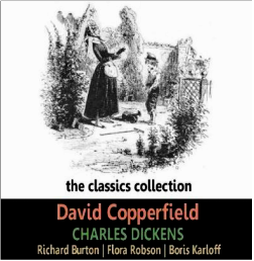
An unofficial American CDR recording of Charles Dickens' classic novel, 'David Copperfield', with Richard Burton cast as the older David taking on the role of the narrator.
This adaption was first broadcast in America on Christmas Eve 1950 on the NBC network and was presented by the 'Theatre Guild On The Air'.
This version of the novel was adapted for broadcast by Robert Anderson and was directed by Homer Thickett and featured, alongside Richard Burton (who was starring in 'The Lady's Not For Burning' at The Royale Theatre, New York at the time), the vocal talents of Flora Robson, Cyril Ritchard, Hugh Williams and a splendid Boris Karloff as Uriah Heep.
The programme, which was sponsored by The United States Steel Corporation was presented by Roger Pryor with announcements and advertisments read by Norman Brokenshire. The incidental music was composed and conducted by Harold Levy.
The programme was recorded at the Belasco Theatre, New York.
As far as the Richard Burton Museum is aware, this wonderful adaption of Charles Dickens' classic novel has never been officially released on vinyl or compact disc in the U.K.
This adaption was first broadcast in America on Christmas Eve 1950 on the NBC network and was presented by the 'Theatre Guild On The Air'.
This version of the novel was adapted for broadcast by Robert Anderson and was directed by Homer Thickett and featured, alongside Richard Burton (who was starring in 'The Lady's Not For Burning' at The Royale Theatre, New York at the time), the vocal talents of Flora Robson, Cyril Ritchard, Hugh Williams and a splendid Boris Karloff as Uriah Heep.
The programme, which was sponsored by The United States Steel Corporation was presented by Roger Pryor with announcements and advertisments read by Norman Brokenshire. The incidental music was composed and conducted by Harold Levy.
The programme was recorded at the Belasco Theatre, New York.
As far as the Richard Burton Museum is aware, this wonderful adaption of Charles Dickens' classic novel has never been officially released on vinyl or compact disc in the U.K.
Noel Coward's 'Conversation Piece'
Columbia Records, 1951
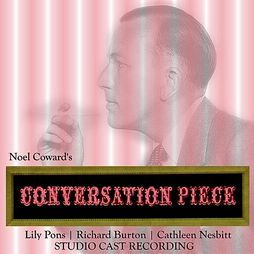
An unofficial American CDR recording of Noel Coward's 1951 musical play entitled, 'Conversation Piece'.
This recording of 'Conversation Piece' was originally released by Columbia Records in 1951 as part of their 'Masterworks' series of vinyl records and was originally issued with the catalogue number ASL 163.
Richard Burton appears in this performance as The Marquis of Sheere alongside the 'Master' himself, Noel Coward, Lily Pons, Cathleen Nesbitt, Dorothy Johnson and Rex Evans.
The musical score and lyrics were written by Noel Coward with orchestral arrangements by Carol Huxley, conducted by Lehman Engel.
This recording of 'Conversation Piece' was originally produced for Columbia Records by Goddard Lieberson.
This recording of 'Conversation Piece' was originally released by Columbia Records in 1951 as part of their 'Masterworks' series of vinyl records and was originally issued with the catalogue number ASL 163.
Richard Burton appears in this performance as The Marquis of Sheere alongside the 'Master' himself, Noel Coward, Lily Pons, Cathleen Nesbitt, Dorothy Johnson and Rex Evans.
The musical score and lyrics were written by Noel Coward with orchestral arrangements by Carol Huxley, conducted by Lehman Engel.
This recording of 'Conversation Piece' was originally produced for Columbia Records by Goddard Lieberson.
'The Poetry Of Thomas Hardy Read By Richard Burton' 1961
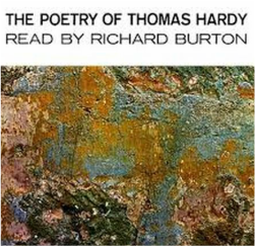
An unofficial American CDR recording of 'The Poetry Of Thomas Hardy Read By Richard Burton'.
This unofficial recording was originally released on vinyl on the Caedmon Record label with the catalogue number Caedmon TC1140. The original vinyl album was first issued in 1961.
In a contemporary review the original album was described as... 'A match made in heaven, some of the most beautiful, poignant words ever etched on a page, spoken by a voice born to read them'.
The track-listing for the album is as follows...
In Tenebris I / The Souls Of The Slain / Shut Out That Moon / Reminiscences Of A Dancing Man / Let Me Enjoy / Channel Firing / Beyond The Last Lamp / Wessex Heights / At Casterbridge Fair / I Found Her Out There / The Voice / After A Journey / Weathers / The Phantom Horsewoman / She Charged Me / In The Servant's Quarters / In The Study / Timing Her / Great Things / Old Furniture / The Sunshade / At Castle Boterel.
This unofficial recording was originally released on vinyl on the Caedmon Record label with the catalogue number Caedmon TC1140. The original vinyl album was first issued in 1961.
In a contemporary review the original album was described as... 'A match made in heaven, some of the most beautiful, poignant words ever etched on a page, spoken by a voice born to read them'.
The track-listing for the album is as follows...
In Tenebris I / The Souls Of The Slain / Shut Out That Moon / Reminiscences Of A Dancing Man / Let Me Enjoy / Channel Firing / Beyond The Last Lamp / Wessex Heights / At Casterbridge Fair / I Found Her Out There / The Voice / After A Journey / Weathers / The Phantom Horsewoman / She Charged Me / In The Servant's Quarters / In The Study / Timing Her / Great Things / Old Furniture / The Sunshade / At Castle Boterel.
Jeff Wayne's Musical Version of 'The War Of The Worlds' Sony Music Entertainment / Columbia Records,1985
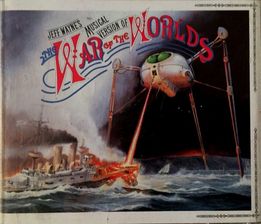
A double compact disc, boxed-set edition of the 1978 'Concept Album', 'Jeff Wayne's Musical Version Of The War Of The Worlds'.
This official edition was released by Sony Music Entertainment in conjunction with Columbia Records in 1985.
This two-disc boxed-set edition was remastered at the CBS Studios in London in 1985 by the original engineer from the 1978 sessions, Laurence Diana.
This copy of 'Jeff Wayne's War Of the Worlds' was issued with the catalogue number CDCBS 96000.
Also contained in this 1985 release is a replica of the booklet which was originally presented in the vinyl issue, complete with the original artwork. The booklet also features updated linear notes.
This official edition was released by Sony Music Entertainment in conjunction with Columbia Records in 1985.
This two-disc boxed-set edition was remastered at the CBS Studios in London in 1985 by the original engineer from the 1978 sessions, Laurence Diana.
This copy of 'Jeff Wayne's War Of the Worlds' was issued with the catalogue number CDCBS 96000.
Also contained in this 1985 release is a replica of the booklet which was originally presented in the vinyl issue, complete with the original artwork. The booklet also features updated linear notes.
The reverse cover and disc of the two-disc edition of Jeff Wayne's Musical Version of 'The War of the Worlds' released in 1995.
Jeff Wayne's Musical Version of 'The War Of The Worlds'
Deluxe Collectors Edition, Columbia Records 2005
'Under Milk Wood' By Dylan Thomas (1963 Adaption)
The B.B.C Radio Collection Series,1995
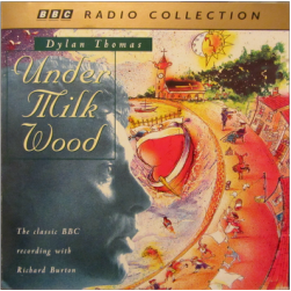
A copy of the official B.B.C. Radio Collection series, double compact disc release of Dylan Thomas's ''Play for Voices'', 'Under Milk Wood'.
This edition is the B.B.C. full recording of the play which was first broadcast on the Third Programme on the 11th of October 1963, which was produced by Douglas Cleverdon.
For this production the roles of 'First and Second Voice' were combined, giving Richard Burton the opportunity to take on the more challenging, and major, role of 'Narrator' for the complete piece.
The vocal talent appearing alongside Richard Burton for this 1963 production included such names as Hugh Griffith, Dorethea Phillips, Betty Lloyd-Davis, David Rees, Talfryn Thomas, Aubrey Richards, Mervyn Johns, Margot Jenkins and Rachel Thomas.
This compact disc edition was released by B.B.C. Worldwide in 1995 and issued with the catalogue number 2BBC 1755CD.
The cover notes for this early compact disc release read;
"When Richard Burton breathed the opening words of 'Under Milk Wood' into a microphone, broadcasting history was made. For this,'Play For Voices' conjures up the intimate dreams and lives of the inhabitants of a Welsh seaside town in a remarkable way.
It is bawdy and beautiful, its colourful characters lust and love, gossip and fantasize and by the magic of language, 'Under Milk Wood' creates a rich modern pastoral which, once heard, touches the listener with its poetry and haunts the imagination for ever".
This edition is the B.B.C. full recording of the play which was first broadcast on the Third Programme on the 11th of October 1963, which was produced by Douglas Cleverdon.
For this production the roles of 'First and Second Voice' were combined, giving Richard Burton the opportunity to take on the more challenging, and major, role of 'Narrator' for the complete piece.
The vocal talent appearing alongside Richard Burton for this 1963 production included such names as Hugh Griffith, Dorethea Phillips, Betty Lloyd-Davis, David Rees, Talfryn Thomas, Aubrey Richards, Mervyn Johns, Margot Jenkins and Rachel Thomas.
This compact disc edition was released by B.B.C. Worldwide in 1995 and issued with the catalogue number 2BBC 1755CD.
The cover notes for this early compact disc release read;
"When Richard Burton breathed the opening words of 'Under Milk Wood' into a microphone, broadcasting history was made. For this,'Play For Voices' conjures up the intimate dreams and lives of the inhabitants of a Welsh seaside town in a remarkable way.
It is bawdy and beautiful, its colourful characters lust and love, gossip and fantasize and by the magic of language, 'Under Milk Wood' creates a rich modern pastoral which, once heard, touches the listener with its poetry and haunts the imagination for ever".
The insert from the 1995 BBC compact disc release of 'Under Milk Wood', the adaption which was first broadcast on the 11th of November 1963.
'Under Milk Wood' By Dylan Thomas (1954 Adaption)
Polygram Records, 1998
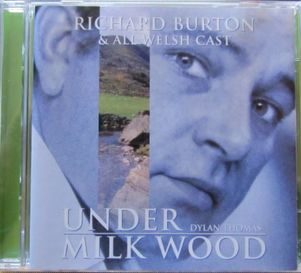
A copy of the 1998 compact disc release of the 1954 B.B.C. adaption of 'Under Milk Wood' by Dylan Thomas.
This all-Welsh cast adaption featured Richard Burton in the role of 'First Voice' alongside Richard Bebb, Hugh Griffith, Rachel Thomas, Aubrey Richards and Rachel Roberts. Philip Burton was cast in the role of The Reverend Eli Jenkins and Sybil Williams, Richard Burton's first wife, portrayed Myfanwy Price.
This double compact disc set was released in 1998 by Polygram Entertainment in association with the B.B.C. as part of their Speaking Volumes series of releases and was issued with the catalogue number 5221402.
The cover notes for this edition read;
"Under Milk Wood is Dylan Thomas's most popular and famous work. It is a lyrical study of a day in the life of a Welsh fishing village as revealed through the dreams and voices of its inhabitants - and what a rich brew of humanity they are! Written as a 'Play for Voices' this unique creation can best be enjoyed in this acclaimed B.B.C. Radio version with Richard Burton leading a superb cast".
This all-Welsh cast adaption featured Richard Burton in the role of 'First Voice' alongside Richard Bebb, Hugh Griffith, Rachel Thomas, Aubrey Richards and Rachel Roberts. Philip Burton was cast in the role of The Reverend Eli Jenkins and Sybil Williams, Richard Burton's first wife, portrayed Myfanwy Price.
This double compact disc set was released in 1998 by Polygram Entertainment in association with the B.B.C. as part of their Speaking Volumes series of releases and was issued with the catalogue number 5221402.
The cover notes for this edition read;
"Under Milk Wood is Dylan Thomas's most popular and famous work. It is a lyrical study of a day in the life of a Welsh fishing village as revealed through the dreams and voices of its inhabitants - and what a rich brew of humanity they are! Written as a 'Play for Voices' this unique creation can best be enjoyed in this acclaimed B.B.C. Radio version with Richard Burton leading a superb cast".
The insert and disc from the 1998 Polygram compact disc release of the original 1954 B.B.C. broadcast of 'Under Milk Wood'.
'Under Milk Wood' By Dylan Thomas (2003 Adaption)
B.B.C. Radio Four Audiobooks, 2004
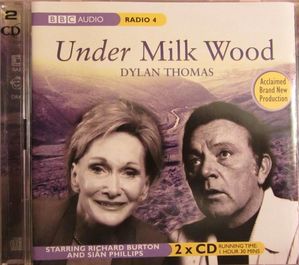
A copy of the double compact disc edition of the acclaimed B.B.C. adaption of Dylan Thomas's 'Under Milk Wood', first broadcast on B.B.C. Radio Four on the 15th of November 2003.
With Richard Burton's voice being 'lifted' from the 1963 adaption of the play, a new all-Welsh cast has been added to his haunting narration, a cast which includes; Sian Phillips, Glyn Houston, Matthew Rhys, Mali Harries, Ruth Jones and in the role of the 'Voice of a Guidebook', the B.B.C. newsreader, John Humphrys.
This adaption of Dylan Thomas's 'Play For Voices' was produced and directed by Alison Hindell and the new musical score was composed by John Hardy.
This compact disc set was released by B.B.C. Audiobooks in 2004 and was issued with the ISBN 0-563-51029-3.
The cover notes for this edition read;
"Richard Burton's inimitable narration as First Voice in the B.B.C.'s 1963 recording of 'Under Milk Wood' was hugely acclaimed and remains for many the definitive rendering. Now, for the first time in twenty-five years, this famous radio play has been given a fresh lease of life. New technology has enabled Richard Burton's voice to be digitally remastered and mixed with a brand new cast of performers to create a magical, fresh visit to the unique but universal world of Llareggub.
Touching, eerie and very funny, the play tells the story of a day in the life of the inhabitants of a small Welsh seaside town, their dreams and routines, their loves and regrets, their hopes and fears. With characters and phrases that have entered daily parlance, the play opens with 'To begin at the beginning' and features such much-loved characters as No-Good Boyo, Lily Smalls, Polly Garter, Organ Morgan and Captain Cat.
With a all-Welsh cast and an entrancing new musical score, this is set to become the classic version of a spellbinding play".
With Richard Burton's voice being 'lifted' from the 1963 adaption of the play, a new all-Welsh cast has been added to his haunting narration, a cast which includes; Sian Phillips, Glyn Houston, Matthew Rhys, Mali Harries, Ruth Jones and in the role of the 'Voice of a Guidebook', the B.B.C. newsreader, John Humphrys.
This adaption of Dylan Thomas's 'Play For Voices' was produced and directed by Alison Hindell and the new musical score was composed by John Hardy.
This compact disc set was released by B.B.C. Audiobooks in 2004 and was issued with the ISBN 0-563-51029-3.
The cover notes for this edition read;
"Richard Burton's inimitable narration as First Voice in the B.B.C.'s 1963 recording of 'Under Milk Wood' was hugely acclaimed and remains for many the definitive rendering. Now, for the first time in twenty-five years, this famous radio play has been given a fresh lease of life. New technology has enabled Richard Burton's voice to be digitally remastered and mixed with a brand new cast of performers to create a magical, fresh visit to the unique but universal world of Llareggub.
Touching, eerie and very funny, the play tells the story of a day in the life of the inhabitants of a small Welsh seaside town, their dreams and routines, their loves and regrets, their hopes and fears. With characters and phrases that have entered daily parlance, the play opens with 'To begin at the beginning' and features such much-loved characters as No-Good Boyo, Lily Smalls, Polly Garter, Organ Morgan and Captain Cat.
With a all-Welsh cast and an entrancing new musical score, this is set to become the classic version of a spellbinding play".
The insert and disc from the 2004 B.B.C. release of 'Under Milk Wood', specially commissioned for broadcast on B.B.C. Radio Four in 2003.
'Under Milk Wood' By Dylan Thomas (1963 Adaption)
B.B.C. Worldwide Edition, 2013
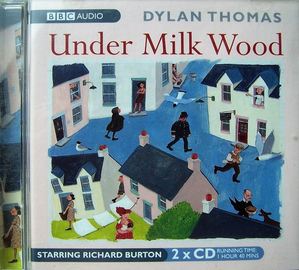
A compact disc copy of the later 1963 full recording of Dylan Thomas's 'Under Milk Wood'.
This two disc collection was released by B.B.C. Worldwide Limited in association with B.B.C. Radio 4 and issued with the catalogue audio book number ISBN 978-0563-388609 in 2013.
This is an official compact disc re-issue of the 1963 B.B.C. recording which was first broadcast on the B.B.C.Third Programme on the 11th of October 1963 in which Richard Burton was cast in the role of 'The Narrator', taking on both the 'First Voice' and the 'Second Voice' roles. Richard Burton was accompanied by an all Welsh cast which included Hugh Griffith, Rachel Thomas, David Rees, Aubrey Richards and Talfryn Thomas. This original 1963 B.B.C. recording of 'Under Milk Wood' was produced by Douglas Cleverdon.
A shortened version of 'Under Milk Wood', made especially for radio broadcast, was commissioned by the B.B.C. and originally broadcast on the 25th of January 1954 on the Third Programme. This compact disc contains the full version which was broadcast on the 11th of October 1963, also presented on the B.B.C. Third Programme.
The cover notes for this 2013 release of 'Under Milk Wood' read;
"A classic B.B.C. Radio full-cast version of Dylan Thomas' poetic play for voices starring Richard Burton.
'To begin at the beginning, it is spring, moonless night in the small town, starless and bible-black.'
From their dreamy dreams to their work-day gossip, Dylan Thomas' lyrical masterpeice traces the lives of a group of villagers in a tiny Welsh seaport.
Blind Captain Cat sits in the window of Schooner House, listening as the boys and girls, the postman, the gossips, dressmaker, preacher and publican all pass by.
With words good enough to eat, Thomas portrays the innermost thoughts - from fantasy dreamworld to waking lives, full of a riotous mix of prudery and bawdiness.
This B.B.C. radio drama of 'Under Milk Wood' is the full version broadcast in 1963, which includes several passages omitted from the first recording in 1954. With his incomparable rich Welsh voice, Richard Burton reads the role that Thomas himself was originally to have played."
The cover and liner illustrations for this 2013 release of 'Under Milk Wood' were provided by artist, Rachel Ross. The photograph of Richard Burton, credited to the B.B.C. was taken contemporary to the 1963 recording session.
This two disc collection was released by B.B.C. Worldwide Limited in association with B.B.C. Radio 4 and issued with the catalogue audio book number ISBN 978-0563-388609 in 2013.
This is an official compact disc re-issue of the 1963 B.B.C. recording which was first broadcast on the B.B.C.Third Programme on the 11th of October 1963 in which Richard Burton was cast in the role of 'The Narrator', taking on both the 'First Voice' and the 'Second Voice' roles. Richard Burton was accompanied by an all Welsh cast which included Hugh Griffith, Rachel Thomas, David Rees, Aubrey Richards and Talfryn Thomas. This original 1963 B.B.C. recording of 'Under Milk Wood' was produced by Douglas Cleverdon.
A shortened version of 'Under Milk Wood', made especially for radio broadcast, was commissioned by the B.B.C. and originally broadcast on the 25th of January 1954 on the Third Programme. This compact disc contains the full version which was broadcast on the 11th of October 1963, also presented on the B.B.C. Third Programme.
The cover notes for this 2013 release of 'Under Milk Wood' read;
"A classic B.B.C. Radio full-cast version of Dylan Thomas' poetic play for voices starring Richard Burton.
'To begin at the beginning, it is spring, moonless night in the small town, starless and bible-black.'
From their dreamy dreams to their work-day gossip, Dylan Thomas' lyrical masterpeice traces the lives of a group of villagers in a tiny Welsh seaport.
Blind Captain Cat sits in the window of Schooner House, listening as the boys and girls, the postman, the gossips, dressmaker, preacher and publican all pass by.
With words good enough to eat, Thomas portrays the innermost thoughts - from fantasy dreamworld to waking lives, full of a riotous mix of prudery and bawdiness.
This B.B.C. radio drama of 'Under Milk Wood' is the full version broadcast in 1963, which includes several passages omitted from the first recording in 1954. With his incomparable rich Welsh voice, Richard Burton reads the role that Thomas himself was originally to have played."
The cover and liner illustrations for this 2013 release of 'Under Milk Wood' were provided by artist, Rachel Ross. The photograph of Richard Burton, credited to the B.B.C. was taken contemporary to the 1963 recording session.
The reverse cover and disc from the 2015, B.B.C. Worldwide release of the 1963 adaption of Dylan Thomas's 'Under Milk Wood'.
'Burton At The BBC'
B.B.C. Worldwide / Penguin Random House, 2015
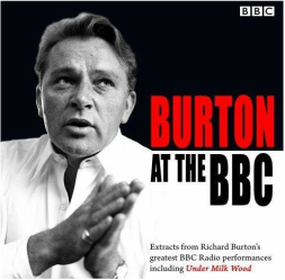
An outstanding compact disc collection, released as a three-disc set, simply entitled, 'Burton At The BBC'.
This edition was released in 2015 by B.B.C. Worldwide Limited and Penguin Random House Limited and issued with the audio book number ISBN 978-1-78529-2040.
This re-release contains an interesting selection of recordings which includes several of the most important and historic productions which Richard Burton recorded for the B.B.C as well as including several short interview clips.
All of the recordings which appear on this release were selected and produced for the B.B.C. by Brian Miller.
The cover notes for this 2015 edition read;
"Highlights from Richard Burton's finest B.B.C. radio performances from the 1940's to the 1980's.
Richard Burton was one of the most famous British actors of the twentieth century, renowned for his magical, melliflluous voice. Before Hollywood tempted him away, he worked frequently for the B.B.C. and many of his most electrifying performances were recorded there.
This classic compilation features some of the very best of Burton, including his very first radio role in 'The Corn Is Green'; the heroic Roland in 'The Dark Tower'; the apocalyptic poem 'Fire And Ice'; Henry V on the eve of Agincourt; the spine-tingling 'Under Milk Wood' and the poignant 'In Parenthesis'. Also included is the complete recording of Emlyn Williams' suspenseful thriller 'Night Must Fall'.
In addition, there are extracts from interviews in which Richard Burton talks about Dylan Thomas, his love of rugby, his deepest ambition and his own feelings about his incomparable voice.
Whether performing Shakespeare, reading Robert Frost or simply talking about his life and career, Burton is never less than compelling and this unique anthology is a superb tribute to one of the great icons of stage and screen".
The complete track-listing for this superb collection is as follows;
Burton On Rugby...An interview from 'Sports Report', first broadcast on B.B.C. Radio Two on the 14th of November 1970, in which Richard Burton talks candidly about his love of the game.
The Corn Is Green...Written by Emlyn Williams, this recording was originally broadcast on the 27th of January 1945 as part of a radio series entitled 'Saturday Night Theatre' by the B.B.C. Home Service. This broadcast was Richard Burton's first radio performance and was directed by Philip Burton.
Some Say The World Will End In Fire...A poem by Robert Frost, first broadcast on the 'Profile' programme for B.B.C. Radio Four on the 12th of March 1982.
Selections from William Shakespeare's'Henry V'...Recorded by the B.B.C. Home Service and broadcast on the 22nd of April 1956.
The Burton Voice...An interview segment from the 'Profile' programme for B.B.C. Radio Four, originally broadcast on the 12th of March 1982.
The Dark Tower...A play, written by Louis MacNeice, recorded by the B.B.C. Home Service and first broadcast on the 14th of May 1956.
In Parenthesis...A recording of the powerful and dark play written by David Jones broadcast on the B.B.C. Third Programme on the 30th of January 1955.
Burton On Dylan Thomas...A segment of interview recorded for the 'Profile' programme and broadcast on B.B.C. Radio Four on the 12th of March 1982.
Highlights from 'Under Milk Wood'...Recorded by the B.B.C. and broadcast on the Third Programme in 1963.
Night Must Fall...The complete recording of the play by Emlyn Williams, which was originally broadcast by the B.B.C. Home Service on the 13th of January 1954.
This edition was released in 2015 by B.B.C. Worldwide Limited and Penguin Random House Limited and issued with the audio book number ISBN 978-1-78529-2040.
This re-release contains an interesting selection of recordings which includes several of the most important and historic productions which Richard Burton recorded for the B.B.C as well as including several short interview clips.
All of the recordings which appear on this release were selected and produced for the B.B.C. by Brian Miller.
The cover notes for this 2015 edition read;
"Highlights from Richard Burton's finest B.B.C. radio performances from the 1940's to the 1980's.
Richard Burton was one of the most famous British actors of the twentieth century, renowned for his magical, melliflluous voice. Before Hollywood tempted him away, he worked frequently for the B.B.C. and many of his most electrifying performances were recorded there.
This classic compilation features some of the very best of Burton, including his very first radio role in 'The Corn Is Green'; the heroic Roland in 'The Dark Tower'; the apocalyptic poem 'Fire And Ice'; Henry V on the eve of Agincourt; the spine-tingling 'Under Milk Wood' and the poignant 'In Parenthesis'. Also included is the complete recording of Emlyn Williams' suspenseful thriller 'Night Must Fall'.
In addition, there are extracts from interviews in which Richard Burton talks about Dylan Thomas, his love of rugby, his deepest ambition and his own feelings about his incomparable voice.
Whether performing Shakespeare, reading Robert Frost or simply talking about his life and career, Burton is never less than compelling and this unique anthology is a superb tribute to one of the great icons of stage and screen".
The complete track-listing for this superb collection is as follows;
Burton On Rugby...An interview from 'Sports Report', first broadcast on B.B.C. Radio Two on the 14th of November 1970, in which Richard Burton talks candidly about his love of the game.
The Corn Is Green...Written by Emlyn Williams, this recording was originally broadcast on the 27th of January 1945 as part of a radio series entitled 'Saturday Night Theatre' by the B.B.C. Home Service. This broadcast was Richard Burton's first radio performance and was directed by Philip Burton.
Some Say The World Will End In Fire...A poem by Robert Frost, first broadcast on the 'Profile' programme for B.B.C. Radio Four on the 12th of March 1982.
Selections from William Shakespeare's'Henry V'...Recorded by the B.B.C. Home Service and broadcast on the 22nd of April 1956.
The Burton Voice...An interview segment from the 'Profile' programme for B.B.C. Radio Four, originally broadcast on the 12th of March 1982.
The Dark Tower...A play, written by Louis MacNeice, recorded by the B.B.C. Home Service and first broadcast on the 14th of May 1956.
In Parenthesis...A recording of the powerful and dark play written by David Jones broadcast on the B.B.C. Third Programme on the 30th of January 1955.
Burton On Dylan Thomas...A segment of interview recorded for the 'Profile' programme and broadcast on B.B.C. Radio Four on the 12th of March 1982.
Highlights from 'Under Milk Wood'...Recorded by the B.B.C. and broadcast on the Third Programme in 1963.
Night Must Fall...The complete recording of the play by Emlyn Williams, which was originally broadcast by the B.B.C. Home Service on the 13th of January 1954.
An image of the reverse cover and disc from the B.B.C. re-issue of 'Burton At The BBC', released by B.B.C. Worldwide in 2015.
Richard Burton Narrates 'Vivat Rex' Two Volume Collection
B.B.C. Worldwide, 2015
A superb two volume compact disc set, comprising of twenty-six compact discs of the complete B.B.C. Radio Four series, 'Vivat Rex', narrated by Richard Burton.
'Richard Burton Reads Fifteen Poems By Dylan Thomas' Hallmark Music And Entertainment, 2016
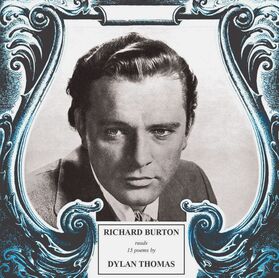
A copy of the 2016 compact disc release of the original 1955 Decca (Argo Division) vinyl album entitled, 'Richard Burton Reads Fifteen Poems By Dylan Thomas'.
This compact disc edition was released by Hallmark Music and Entertainment, a subsidiary company of the Pickwick Group Limited, in 2016 and was issued with the catalogue number 716452. This compact disc is a faithful re-release of the original Argo vinyl album, first released in 1955, which was issued with the catalogue number RG 43.
The track-listing for this 2016 compact disc release is as follows;
In My Craft Or Sullen Art / The Force That Through The Green Fuse Drives The Flower / A Winter's Tale / The Ballad Of The Long- Legged Bait / Fern Hill / The Hunchback In The Park / Deaths And Entrances / Before I Knocked / I See The Boys Of Summer / Lament / Lie Still Sleep Becalmed / Do Not Go Gentle Into That Good Night / Poem In October / And Death Shall Have No Dominion.
The cover notes for this Hallmark release read;
"In 1934 the editor of the 'Sunday Referee', Mark Goulden, decided to institute a 'Poet's corner' column, with the aim of encouraging unknown poets from around the country.
The column would be supervised by Victor Neuberg, a well respected poet of long standing.Several days after the paper announced the launch, an envelope arrived at the office postmarked Swansea. Inside were several poems forwarded by a twenty year-old man by the name of Dylan Thomas.
Immediately impressed with the quality of the work, Messrs. Goulden and Neuberg invited Thomas to London where the three men discussed which of the many poems that had been submitted should be published in the newspaper. Reader reaction to those that appeared was equally positive, and soon after the first batch were published plans were made to turn them into book form, with Parton Bookshop publishing '18 Poems' later the same year (none of the poems were titled, being referred to by their first lines). This was essentially a limited run of just two hundred and fifty copies, with the Fortune Press reprinting the book in 1936.
With Parton switching from poetry to politics, Dylan Thomas searched for another publishing outlet and quickly landed a deal with J. M. Dent and Sons, a more conventional publisher. A second volume of his work appeared in September 1936, with the imaginative title, 'Twenty Five Poems'. Only six of the poems in the book were new, (that is, written between the publication of '18 Poems' and 'Twenty Five Poems'), but the book was once again received critically and commercially.
The path towards cultural immortality was not a particularly happy one for Dylan Thomas. Much of the money he earned from his best-selling books was spent on drink and fairly early on in his career he was an alcoholic. His private life was equally troubled, although he married Caitlin MacNamara in 1937 and together they had three children.
His broadcasting career began in earnest in 1945, with readings and well as appearing on discussion programmes. Dame Edith Sitwell described him as thus; "He had a speaking voice of the utmost magnificence, range and beauty, and his speaking of poetry was as sublime as his writing of poetry."
For all Dylan's abilities as a reader however, the name most indelibly linked is that of fellow Welsh actor Richard Burton. His reading of 'Under Milk Wood' is still highly regarded more than sixty years after the event, just one of several readings of his work that he performed.
"I was corrupted by Faust", Burton once said. "And Shakespeare. and Proust. And Hemingway. But mostly I was corrupted by Dylan Thomas. Most people see me as a rake, womaniser, boozer and purchaser of large baubles. I'm all those things depending on the prism and the light. But mostly I'm a reader."
Richard Burton tackled the fifteen poems that appear on this particular recording in 1954, about a year after Thomas' death and at a time when interest in both Dylan Thomas and Richard Burton were on an even keel thanks to the popularity of 'Under Milk Wood' on radio and record. When Richard died in 1984, he was buried, as requested, with a copy of 'The Collected Poems of Dylan Thomas."
This compact disc edition was released by Hallmark Music and Entertainment, a subsidiary company of the Pickwick Group Limited, in 2016 and was issued with the catalogue number 716452. This compact disc is a faithful re-release of the original Argo vinyl album, first released in 1955, which was issued with the catalogue number RG 43.
The track-listing for this 2016 compact disc release is as follows;
In My Craft Or Sullen Art / The Force That Through The Green Fuse Drives The Flower / A Winter's Tale / The Ballad Of The Long- Legged Bait / Fern Hill / The Hunchback In The Park / Deaths And Entrances / Before I Knocked / I See The Boys Of Summer / Lament / Lie Still Sleep Becalmed / Do Not Go Gentle Into That Good Night / Poem In October / And Death Shall Have No Dominion.
The cover notes for this Hallmark release read;
"In 1934 the editor of the 'Sunday Referee', Mark Goulden, decided to institute a 'Poet's corner' column, with the aim of encouraging unknown poets from around the country.
The column would be supervised by Victor Neuberg, a well respected poet of long standing.Several days after the paper announced the launch, an envelope arrived at the office postmarked Swansea. Inside were several poems forwarded by a twenty year-old man by the name of Dylan Thomas.
Immediately impressed with the quality of the work, Messrs. Goulden and Neuberg invited Thomas to London where the three men discussed which of the many poems that had been submitted should be published in the newspaper. Reader reaction to those that appeared was equally positive, and soon after the first batch were published plans were made to turn them into book form, with Parton Bookshop publishing '18 Poems' later the same year (none of the poems were titled, being referred to by their first lines). This was essentially a limited run of just two hundred and fifty copies, with the Fortune Press reprinting the book in 1936.
With Parton switching from poetry to politics, Dylan Thomas searched for another publishing outlet and quickly landed a deal with J. M. Dent and Sons, a more conventional publisher. A second volume of his work appeared in September 1936, with the imaginative title, 'Twenty Five Poems'. Only six of the poems in the book were new, (that is, written between the publication of '18 Poems' and 'Twenty Five Poems'), but the book was once again received critically and commercially.
The path towards cultural immortality was not a particularly happy one for Dylan Thomas. Much of the money he earned from his best-selling books was spent on drink and fairly early on in his career he was an alcoholic. His private life was equally troubled, although he married Caitlin MacNamara in 1937 and together they had three children.
His broadcasting career began in earnest in 1945, with readings and well as appearing on discussion programmes. Dame Edith Sitwell described him as thus; "He had a speaking voice of the utmost magnificence, range and beauty, and his speaking of poetry was as sublime as his writing of poetry."
For all Dylan's abilities as a reader however, the name most indelibly linked is that of fellow Welsh actor Richard Burton. His reading of 'Under Milk Wood' is still highly regarded more than sixty years after the event, just one of several readings of his work that he performed.
"I was corrupted by Faust", Burton once said. "And Shakespeare. and Proust. And Hemingway. But mostly I was corrupted by Dylan Thomas. Most people see me as a rake, womaniser, boozer and purchaser of large baubles. I'm all those things depending on the prism and the light. But mostly I'm a reader."
Richard Burton tackled the fifteen poems that appear on this particular recording in 1954, about a year after Thomas' death and at a time when interest in both Dylan Thomas and Richard Burton were on an even keel thanks to the popularity of 'Under Milk Wood' on radio and record. When Richard died in 1984, he was buried, as requested, with a copy of 'The Collected Poems of Dylan Thomas."
The insert, based on Arthur Wragg's original 1955 Argo border design, and disc for the 'Hallmark' release of 'Richard Burton Reads Fifteen Poems By Dylan Thomas' which was released in 2016 and issued with the catalogue number 716452.
This page was updated on the 27th of March, 2021
